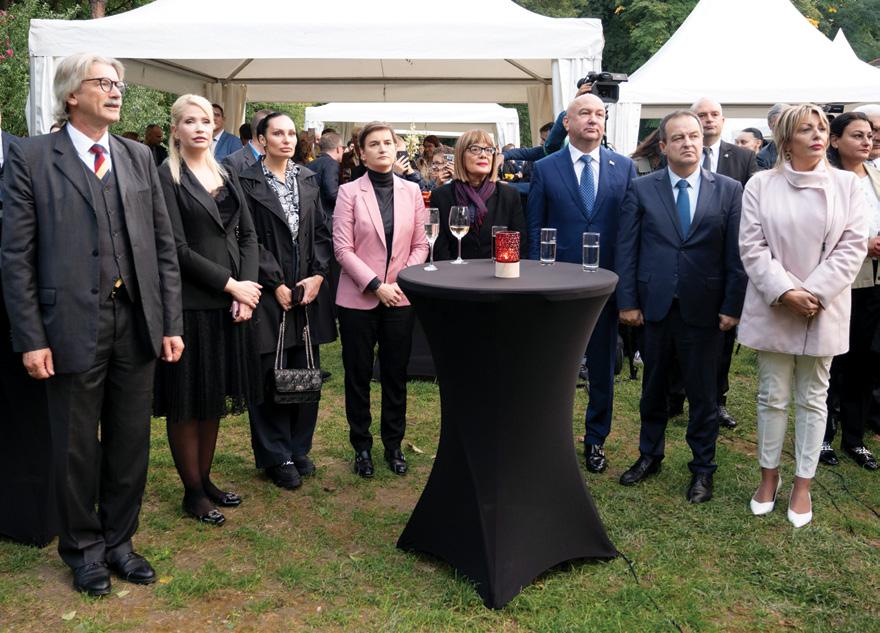
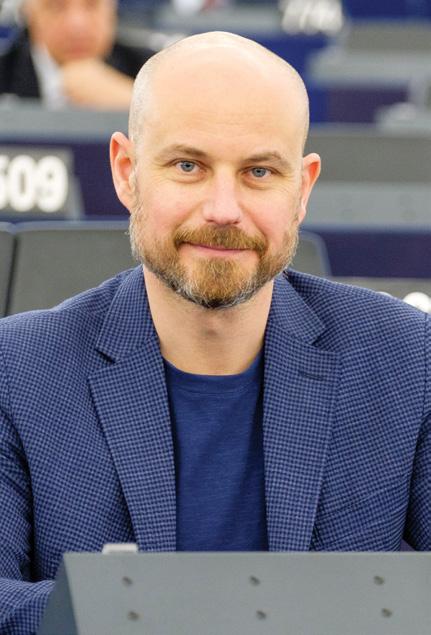
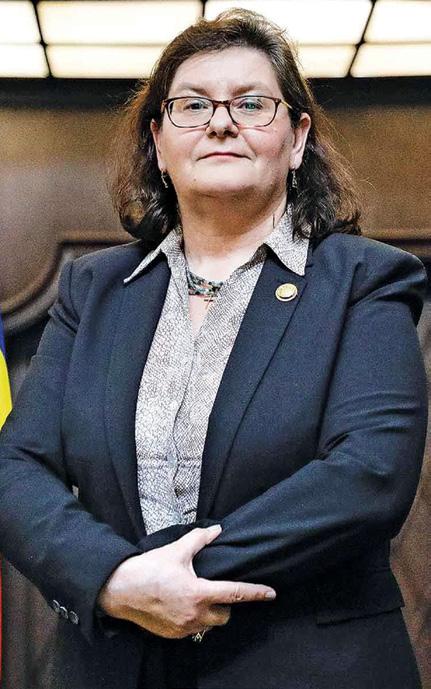

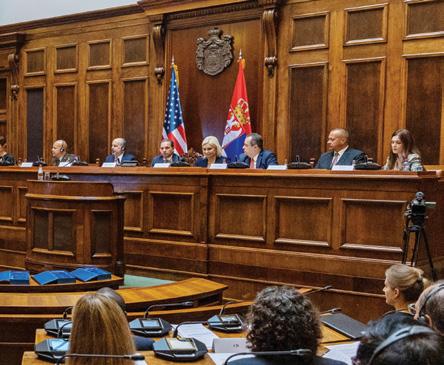

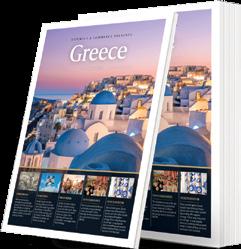
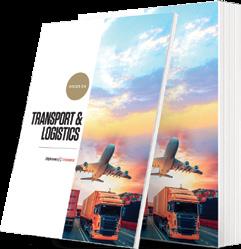

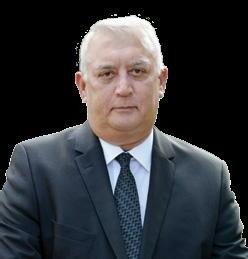

October 2022 | ISSUE No. 79 | Price: 350 RSD www.diplomacyandcommerce.rs The eU enlargemenT perspecTive reqUires poliTical will Vladimír Bilčík Member of the European Parliament, Standing Rapporteur for Serbia Day of america The friendship beTween romanians and serbs conTinues To inspire us Today H.E. SilVia daVidoiu Ambassador of Romania to Serbia Journalism as a proffesion, noT an ideology JoVana JokSimoVić Editor-in-chief of the Tanjug news agency (my) DalmaTian pašTicaDa mirJana BiščEVić spouse of Ambassador of Croatia oct. 04 day of german uniTy marked in Jevremovac boTanical garden TransporT & LogisTics Greece YorgoS diacofotakiS H.E. Ambassador of Greece to Serbia matEJ ZakonJšEk Director at Transport Community Permanent Secretariat 9772466380002

ENQUIRE ABOUT OUR LAST REMANING RESIDENCES PORTOMONTENEGRO.COM MADE FOR YOUR NEXT

WELCOME HOME TO A LIFE LESS ORDINARY CHAPTER
tanJa BankoVić
tanja.bankovic@color.rs
dragan nikolić
dragan.nikolic@color.rs
ognJEn trmčić
ognjen.trmcic@color.rs
Žikica milošEVić
zikica.milosevic@color.rs
roBErt čoBan
robert.coban@color.rs



tHE Eu EnlargEmEnt pErSpEctiVE rEquirES political will Vladimír Bilčík

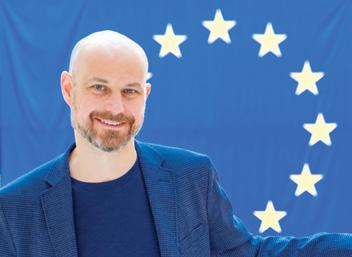
Member of the European Parliament, Standing Rapporteur for Serbia
tHE friEndSHip BEtwEEn romanianS and SErBS continuES to inSpirE uS todaY SilVia daVidoiu
H.E. Ambassador of Romania to Serbia
How long to rEign oVEr tHEm?
SomE of tHE nEw king’S rEalmS maY BEcomE rEpuBlicS

The queen’s passing gives them an opportunity to break the link to the British crown
JournaliSm aS a profESSion, not an idEologY
JoVana JokSimoVić
Editor-in-chief of the Tanjug news agency
grEEn lanE for wEStErn Balkan matEJ ZakonJšEk
Director at Transport Community Permanent Secretariat
Strong Economic coopEration BEtwEEn SErBia and grEEcE nikolaoS SliouSarEgko
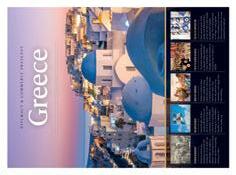
President of management board of Hellenic Business Association of Serbia
tHE tranSport induStrY facES grEat cHallEngES goran alEkSić
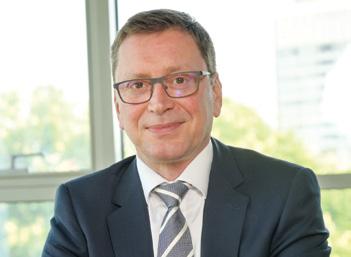
Director General of the Srbijatransport Road Traffic Business Association
Member of the Executive Board of the Union of Employers of Serbia
Chairman of the Assembly of the Branch Association of Road Traffic Employers of Serbia
wE walkEd, and wE alwaYS will!
ciVil rigHtS dEfEndErS
The EuroPride Week in Belgrade consisted of more than 130 events
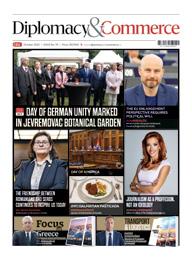
air cargo prioritiES for SuStainaBlE growtH

IATA highlighted four priorities to build resilience and strengthen air cargo’s postpandemic prospects
an ExcEllEnt and longStanding BilatEral rElationS
YorgoS diacofotakiS
H.E. Ambassador of Greece to Serbia, H.E. Yorgos Diacofotakis
Greece’s stance on Kosovo is well-known and remains unchanged.
contEmporarY art tHat iS accESSiBlE to EVErYonE mariJa milošEVić

Founder of Art for All Gallery
JEgrička flowS quiEtlY roBErt čoBan
On the porch of her house in the village of Parage, we spoke with Živana, the widow of the renowned American writer and journalist Charles Alverson, about his life in Bačka County.
6
10
14
18
24
28
35
38
44
69
78
84
sUbscribe now! in prinT anD online paymenT insTrUcTions: www.diplomacyandcommerce.rs /subscription Call us or send us request on: e-mail: pretplata-dc@color.rs Phone: +381 11 4044 960 4 www.diplomacyandcommerce.rs CONTENTS only 34 € per year ”Color Media Communications” LTD, 21132 Petrovaradin, Štrosmajerova 3 TIN 107871532 Matriculation number 20887303 Phone: +381 21 4897 100 Office: Braće Jugovića 23/2, Belgrade Phone: 011 4044 960 CIP - Katalogizacija u publikaciji Biblioteke Matice Srpske, Novi Sad 33 Diplomacy & Commerce / glavni odgovorni urednik Tanja Banković, 2016, br. 1 (mart)-.Novi Sad: Color Media Communications, 2016 - , -33cm Mesečno. ISSN 2466-3808 = Diplomacy & Commerce COBISS.SR-ID 303269895
Editor in Chief
Editor / Journalist
Advertising Director
Journalist
Director
Layout Vladimir dudaš C e n t r o b i r o Photos goran ZlatkoVić SHuttErStock Translation SnEŽana BJElotomić Print Birograf comp d.o.o. Zemun Atanasija Pulje 22
roBErt čoBan Director
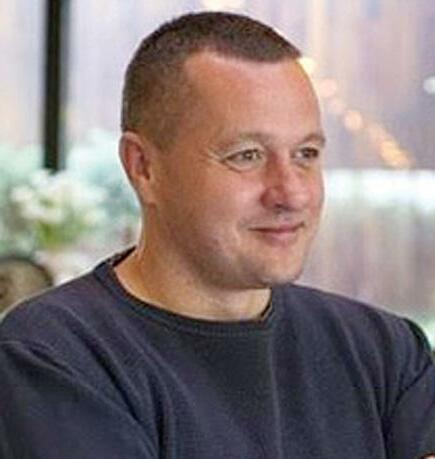
The film “Casablanca”, which President Vučić has mentioned, was inspired by Tangier, an international, neutral zone, a meeting place for spies and arms dealers from all over the world from 1923 to 1956. That com parison with Belgrade today is perfectly fine. But let’s not forget that, in the end, in 1956, Tangier still belonged to Mo rocco. Neutrality is, therefore, pos sible, but only if certain geopolitical prerequisites are met.
I was in Tangier exactly 10 years ago, in November 2012. The Cold War atmosphere was still felt on the streets 66 years after the annexa tion of this ‘International Zone’ to Morocco. Two years later, I visited Gdansk in Poland and pondered the status and destiny of these ‘Interna tional Zones’.
Are the political ambitions of rulers, dreamed-of but unrealized nationalist myths, corruption of the domestic establishment and other ‘burdens’ that most nation-states usually carry with them i.e. the most dangerous form of cancer that eats away at the progress of those communities? What would states and cities look like if they were organized as interna tional corporations? Would a professional, su pranational cosmopolitan management, whose task is solely to facilitate economic progress of the community (city, region, state) and its members, function better than parliaments and governments elected in elections, “by the will of the people”? Are “the people” competent enough to know what is good for them? Is there a guar antee that the election winners will not deceive the people and implement exactly the opposite of what they said and promised in the election campaign? Sounds familiar?
The cities of Gdansk and Tangier, each with a different history, one in Europe, on the coast of the Baltic Sea, and the other in Africa overlook ing the Atlantic, had the status of “international zones” between the two wars (Tangier and a little
Tangier

longer, until 1956). Gdansk (German - Danzig) was declared “The Free City of Danzig” by the Treaty of Versailles, it was governed by the City Senate, in which both Germans and Poles sat, and was under the jurisdiction of the League of Nations. The nationalists on neither side were satisfied with this state of affairs, as early as in “Mein Kampf” Hitler mentioned the “monstros ity of Danzig’s position”, while Germans and Poles often (peacefully) demonstrated in the city streets, demanding the annexation of the city to one or the other state. However, economic indi cators showed the opposite - in 1912, 5,966 ships docked in the port of Gdansk and 15 years later, in 1927, when Gdansk was declared Free City the number went up to 13,892. If tonnes of unloaded and loaded goods are a valid criterion, then we have to admit that the increase was staggering - 320%. During the 1930s, Gdansk climbed to first place as the largest port in the Baltic - ahead of Stockholm, Copenhagen, Szczecin, Riga and Leningrad. The official currency of the Free City
Tangier also received the status of an interna tional zone after the Great War, more precisely in 1924. The cosmopolitan mix of the population (of 40,000 inhabitants in the early 20th century, 10,000 were Jews, 10,000 Europeans and 20,000 Moroccans) was an excellent foundation for a prosperous community under the international administration of the great powers - Great Britain, France and Spain (later joined by Italy, Belgium, the Netherlands and the USA). By 1939, the number of inhabitants had grown to 60,000, and by 1950, to as many as 150,000. This period marked the great prosperity of the city, where many artists, writers, and Hollywood stars, but also spies, brokers and arms dealers immigrated. The official currency was the British pound. During the Second World War, Tangier was briefly occupied by Franco’s Spain, only to regain its pre-war status as an “interna tional zone” in 1945 and continue to attract people from all over the world. Representatives of the great powers sat down in Rabat in 1952 and decided that in 1956, Tangier would be reintegrated into the Kingdom of Morocco, followed by its decades-long economic decline and collapse. Today, Tangier is just a shadow of its former glory.
There were many similar cases all over the planet in the 20th cen tury: British Hong Kong, Portuguese Macau, Memel (today’s Klaipeda in Lithuania) and many others... Are the modern “international manag ers” appointed by the UN, the EU and today’s great powers more cor rupt and more incompetent than those appointed by the League of Nations between the two wars?
What do the experiences of Brčko, Kosovo and similar “territories” tell us about this? Are today’s “nationstates” more economically efficient and rational than those in the interwar period?
During that period, Gdansk served as a springboard to many German and Polish Jews for emigration to the USA. Although under the influence of the Nazis, the German majority in the city Senate did not implement “racial laws”, as was the case in the Third Reich itself, but also in many countries that were close to it (under the influence of Germany, even the Kingdom of Yugoslavia, legally limited the enrollment of Jews to colleges and banned them from trading in foodstuffs in 1939).In September 1939, Hitler, of course, took Gdansk as one of the first “tro phies” at the official start of the Second World War. In the war operations of 1945, the city was almost completely razed to the ground and as such was “returned” to Poland. Today, it has half a million people, an important port and is an in dustrial and tourist hub with a restored old city centre, but far from the importance it had when it was a Free City.
Was it enough to make the transition in industry and agriculture by denationalizing or privatizing factories, forests and agricultural fields? What about the biggest “business” in each of the states (cities, regions) - the state apparatus and its budget? How to achieve more professional man agement of the state apparatus?
Can you imagine Novi Sad, Subotica, Osijek, Dubrovnik or Mostar’s progress under a Norwe gian mayor, a city manager from Finland and a finance minister from Lucerne, of course, with the support of the most creative and capable local pro fessionals? Each of them could be given a salary of 10,000 euros, which would cost taxpayers much less than the millions swallowed by the corrupt administrations of cities, provinces and states. Can you imagine such a community? I can!
of Danzig was the Danzig Guilder.
5 FOr E wOrd
The EU enlargement perspective requires political will
We believe there is no better address today to discuss actual political topics in Serbia and the EU than Vladimír Bilčík, the member of the Euro pean Parliament and standing rapporteur for Serbia. He speaks clearly about the Europride, Rus sian aggression on Ukraine, Ser bia’s EU accessing process, and many regional relationships and issues.
You recently gave an awe-in spiring speech at Europride in Belgrade. Today, after this event, how do you comment on everything that happened re lated to Europride?
First and foremost, it was an honour to address the participants of Belgrade’s Europride in Septem ber with a special message from European Parliament’s President Roberta Metsola. I have always felt that Belgrade is a tolerant and safe city. Despite the difficulties prior to the Pride, it was very important that this European event took place.

There was a lot of work put into hosting it, and I would like to thank all those who positively contrib uted to the organisation of Euro Pride. I regret the violence against journalists and activists and the isolated incidents that occurred. Overall, I hope that next year’s edi tion of Belgrade Pride will be organ ised with more clarity.
How important is the connec tion of the Western Balkans re gion (e.g. the Open Balkans Initiative) for the region and Europe?
A common regional market within the Berlin Process frame work is an important part of the EU accession process. All regional economic cooperation schemes in the Western Balkans should be inclusive and open to all six part ners in the region. An inclusive initiative also treats all countries on equal footing. Its sole purpose should be strengthening further alignment with EU standards and the acquis in order to speed up EU integration and accession, not to create an alternative integration model.
E X C L U S I V E
Vladimír Bilčík
Member of the European Parliament, Standing Rapporteur for Serbia
Photo: Vladimír Bilčík / European Parliament
6 www.diplomacyandcommerce.rs FEATU r E d INTE rVIE w by Dragan nikolić
Serbia is one of the very few European countries not aligned with EU sanctions against Russia and is, in this respect, in an isolated
position
in the Western Balkans region
Read This on Web
Serbia‘s accession to the Eu ropean Union seems to have never been further. Who is to blame for that? Are the Serbian authorities not doing enough, or is the EU also to blame, which often does not show a friendly face to Serbia and pushes it fur ther away from itself?
Serbian political leaders have repeatedly confirmed that the coun try’s strategic choice belongs to the EU. Serbia is an EU candidate coun try. This means that its credible enlargement perspective requires political will, sustainable efforts and irreversible reforms in all areas, particularly those linked to the rule of law, as well as an unwavering commitment to European stand ards and values. It is a question of political leadership and responsibil ity, not friendliness.
Let us quote one of the offi cial documents of the European Parliament of which you are a member: „MEPs will assess the political situation in three ac cession countries: Bosnia and Herzegovina, Kosovo and Ser bia“. Why does this EU body call Kosovo a state when we know that the EU is status-neutral re garding the Kosovo dispute, bearing in mind that there was no consensus regarding its rec ognition when five EU members did not do it?
The European Parliament, with a huge majority, supports the EU-led Belgrade - Pristina Dialogue and the work of the EU Special Representa tive in this process. This is our pri ority. As the European Parliament is a democratically elected political body and the majority of its Mem bers recognise Kosovo, the practice in the European Parliament is to re fer to Kosovo as Kosovo, including in the Annual Report and in other official documents of the EP.
EU’s sanctions. I strongly regret the fact that Serbia has not yet aligned with EU sanctions following Rus sia’s invasion of Ukraine, and I have been repeating my position to all relevant stakeholders in Serbia. Ser bia is one of the very few European countries not aligned with EU sanc tions against Russia and is, in this respect, in an isolated position in the Western Balkans region. It is my hope that the newly elected authori ties will show unambiguous com mitment to EU values, standards and rules and align with the EU’s
we stand up to Moscow’s aggression together with Serbia and also work together with Belgrade on new, safer and more reliable sources of energy for the citizens of Serbia.
Will Serbia‘s support for Russia, which is reflected in various, but mostly symbolic things, af fect the negotiations on EU ac cession?
In today‘s world, there is a dis tinct polarity, and all the au thorities worldwide have a narrow view of solving the problem. Is it possible that everything in this world is black and white and that only one side is absolutely cor rect and the other is always to blame for everything?
Can Europe understand Ser bia‘s interest in not imposing sanctions on Russia due to its aggression against Ukraine?
Germany is heated with Rus sian gas, and Serbia is criti cised because a commercial airline flies to Moscow. Why?
Let us be crystal clear: Russia’s war of aggression against Ukraine is the reason for the existence of the
decisions and positions in foreign and security policy, which includes EU sanctions on Russia. Serbia’s en ergy dependence on Russia is by no means exceptional. Many European economies, including Slovakia’s, have been dependent on natural resources from Russia, and we feel the economic consequences of the Russian attack on Ukraine. This is precisely why it is important that
Russia’s war of aggression against Ukraine has turned around the entire security situation in Eu rope. There is a “before” February 24 and “after” February 24 moment on our continent. In these dif ficult times, Serbia has to choose a side. Even more in a situation where Russia keeps escalating by organising fake referenda, annex ing parts of Ukrainian regions and mobilizing additional troops. As a keen supporter of Serbia’s Euro pean future, I have to tell you that the recent consultations between Serbia and Russia at the United Na tions in New York have been seen by many across the EU as a politi cal setback for Serbia’s accession process. The symbolism of pictures with Russia’s Foreign Minister Lav rov has resonated strongly and not positively among Serbia’s partners in Europe.
Russia’s war of aggression on Ukraine should be seen as Russia’s most blatant attack on freedom and democratic values since the collapse of the Soviet Union. After attacking Georgia in 2008 and Ukraine in 2014, Russia has been waging a full-on war in Ukraine since February 2022. Let us be clear: Russia is mobilising to at tack an EU candidate country and is therefore attacking one of the most promising EU policies. There is no shade of grey to be defended in this situation. Those who try to relativize Russia’s motives are serving Russian state-run propa ganda.
The West is proud of its dem ocratic system but is it a de mocracy if the people haven’t been asked for anything, and policies are conducted ac cording to the interests of the political power and corpora tions?
I have a simple answer for you - the most advanced democratic systems in the world, which are by far and large in Europe - are con tinuously home to the happiest nations in the world. I think that speaks volumes for the Western democratic system.
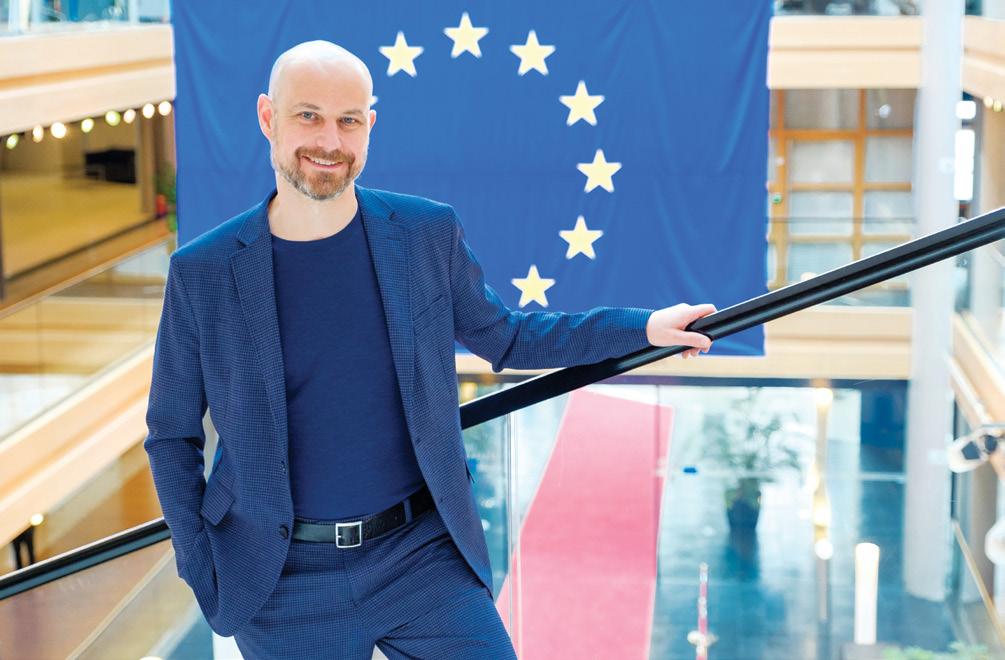
rUSSIA’S wAr OF AGGrESSION ON UkrAINE ShOULd bE SEEN AS rUSSIA’S mOST bLATANT ATTACk ON FrEEdOm ANd dEmOCrATIC VALUES SINCE ThE COLLApSE OF ThE SOVIET UNION
dESpITE ThE dIFFICULTIES prIOr TO ThE prIdE, IT wAS VEry ImpOrTANT ThAT ThIS EUrOpEAN EVENT TOOk pLACE. 7 FEATU r E d INTE rVIE w
The friendship between romanians and Serbs continues to inspire us today
The dynamic of the Romanian-Serbian relation, in general, has picked up the pace.
H.E. SilVia daVidoiu Ambassador of Romania to Serbia
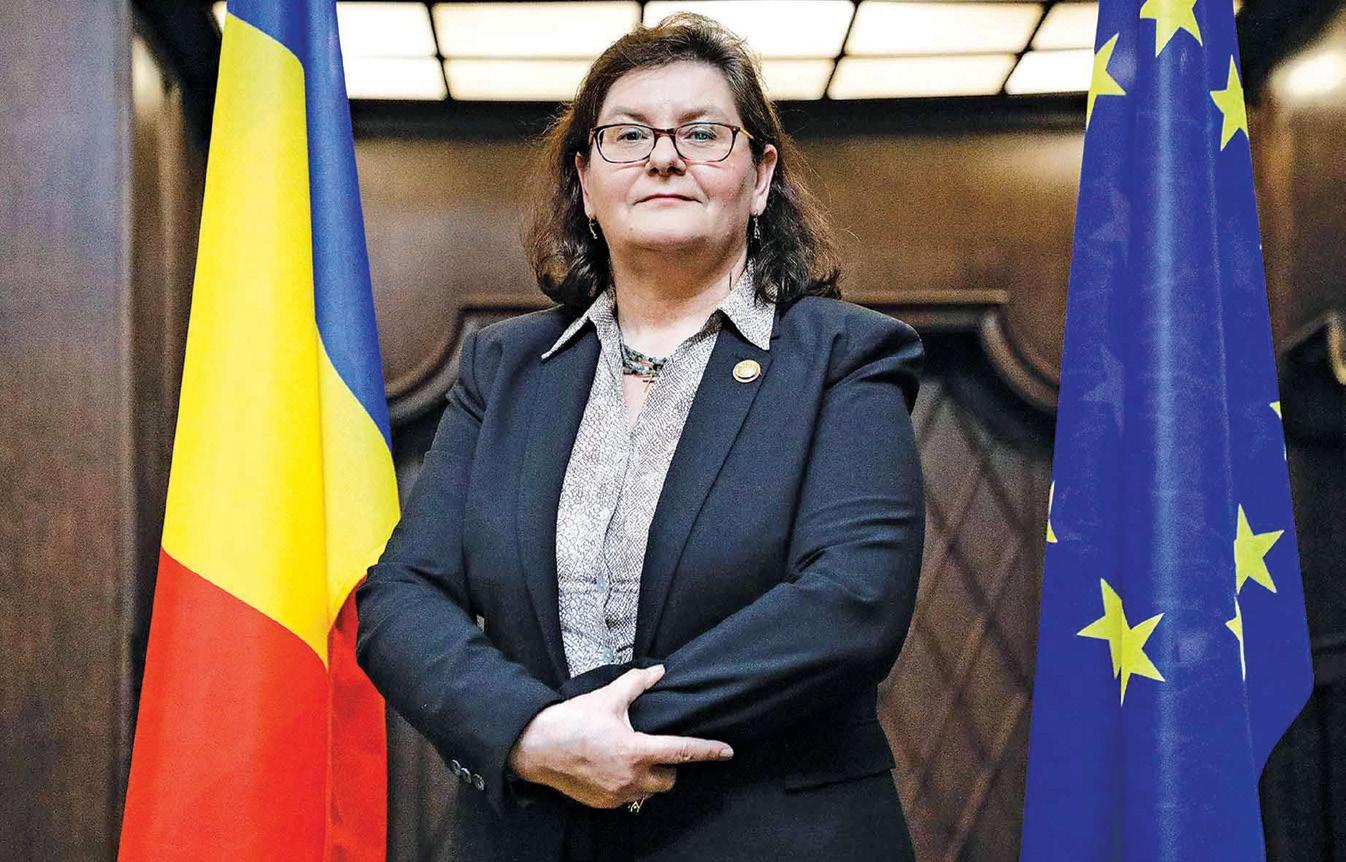
b etter transport links, tour ism and the economy be tween the two countries are on the rise, and that’s why we talked to H.E. Silvia Davidoiu, the Roma nian ambassador to Serbia.
Romanians and Serbs cherish a great and long-standing friend ship that has been confirmed throughout a long history with out any disputes or disagree ments. How do you see the rela tions between the two countries and two close nations?
Indeed, the friendship between Romanians and Serbs has passed the test of time. It is a bond whose strength overrides political divides of various regimes in the recent history and whose endurance continues to inspire us today. This is also a mature relationship, that turned outstanding issues into op portunities for developing bilateral ties. A recent example is the resolu
tion of the status of a compound of buildings –“Luceafarul” – that originally belonged to representa tives of Romanians in Serbia. This result, which we jointly achieved through political contacts at for eign ministers’ level and through technical dialogue, showcased once again the importance that Serbian authorities pay to their relations with Romania, an engage
ment and commitment we will also continue to show.
Just looking at this year, we can already conclude that the dynamic of the Romanian-Serbian relation, in general, has picked up the pace. Some of the highlights refer to: strengthened political dialogue, agreements to increase the level of connectivity between the two countries, positive developments in the area of bilateral trade, a new programme for cross-border coop eration recently launched (worth EUR 74,5 million in EU funds acces sible in the next five years), ampli fied cultural cooperation, thanks to Romania’s status as a special
ThE NUmbEr OF rOmANIAN TOUrISTS ACCOmmOdATEd IN SErbIA
wAS
28.000 IN 2021.
8 www.diplomacyandcommerce.rs INTE rVIE w by Dragan nikolić Read This on Web
guest in the prestigious Book Fair in Belgrade, and intensified peopleto-people contacts also in the con text of Novi Sad and Timisoara’s nominations as European Capitals of Culture in 2022 and 2023 respec tive. These are some of the few ex amples to illustrate my point.
There is still more work ahead of us, for sure, in various areas, but this should not deter us, on the contrary: this is a reflection of the complexity and depth of our bilat eral relation and the joint interest in pursuing our common goals. We feel encouraged by the results achieved so far and we look forward to other mutually satisfying accom plishments in the future.
National minorities, Serbs in Romania and Romanians in Serbia, have always been a bond between our two coun tries. How do you see the posi tion of the Romanian national minority in Serbia today?
Romania pays special attention to the situation of the Romanian minority living in Serbia. This is a natural interest on our part, but also on Serbia’s, in light of the need to fulfil the political criteria for ac cession to the EU. Essentially, the mantra guiding our actions is that Romanians living all over Serbia should benefit from all the rights provided by the national legislation and international documents that Serbia has assumed. This translates into unhindered access to educa tion, media and religious service in the Romanian language and into an administrative and political repre sentation at all levels, coherently and consistently upheld through out the territory of Serbia.
2022 is a particularly special year, a landmark concerning the situation of the Romanian minority. There are new developments arising from the population and household census in Serbia, started in October and from the elections for the National Councils for National Minorities on November 13. Likewise, the ongo ing talks on the third Protocol of the Joint Intergovernmental Commis sion Romania-Republic of Serbia for National Minorities weigh in on these implications to provide optimal conditions for the exercise of the special rights by Romanians in Serbia, as for Serbs in Romania. We are encouraged by the engage ment and receptiveness of Serbian authorities in these matters.
Why are these two neighbour ing countries have such poor traffic connections? How is the highway project between Bel
grade and Timisoara progress ing? How much did the growth of air traffic contribute to the development of tourist, cultural and economic ties between our two countries?
I would not define the trans port interconnections as poor, although there is obviously still room for improvement, taking into consideration our ”common highway”, the Danube and the Port of Constanta - a regional brand.
The traffic of goods on the Danube and through the Port of Constanta, originating in or transiting Serbia in 2021 amounted to 8.9 million tons, and for the first 6 months of 2022, it reached 4.1 million tons. As far as we are concerned, Serbia is welcome to make full use of the facilities of the Port of Constanta, thus contributing to strengthening
top of markets for Romanian ex ports and 8th for imports. Between 2015 and 2021, the bilateral trade doubled to nearly EUR 2 billion, in spite of some of the temporary set backs caused by the pandemic.
One of the biggest Romanian in vestments in Serbia is the thermal insulation panel factory of TeraS teel in Leskovac. The Romanian company offers complete solu tions for industrial construction in accordance with the highest standards. Moreover, the Romanian do-it-yourself (DIY) retail chain Dedeman is exploring the option of entering the Serbian market.
At the same time, we are inter ested in sharing our experience with the modernisation of energy systems and the transition from coal-dependent systems to green energy.
While anticorruption is a work in progress – in Romania, as every where else – it has already equipped us with stronger democratic re flexes and a societal consciousness with regard to the importance of the rule of law. These are key areas to be honestly and openly considered in any democratic country, particu larly candidates for EU member ship, such as Serbia, where these issues do not yet cover much of the public space. Romania’s experience and track record in fighting corrup tion is remarkable, both in terms of institutional building, and concrete results. My country is ready to share its experience with Serbian authori ties on the basis of their formal re quest and specific needs.
Does Romania support the Eu ropean integration of Serbia and the countries of the West ern Balkans? Are there open issues with Serbia that could stand in the way of our path to the EU?
our economic relationship by pro viding a maritime route for Serbian imports and exports.
Concerning road traffic, there are numerous developments ongoing as we speak. For example, our two Gov ernments signed recently in Tim isoara an Agreement to establish the connection of the Timisoara-Moravi ta motorway with the Belgrade-Vatin high-speed road, which will ensure a very important link between Roma nia and Serbia, but also with the road network in the Western Balkans and Southern Europe.
There are direct flights between Belgrade and Bucharest five days a week. Flights are operated by the Serbian airline Air Serbia and the Romanian national airline TAROM. In 2021, nearly 6.500 Serbian tour ists were accommodated in Roma nia, while the number of Romanian tourists accommodated in Serbia was 28.000 persons.
How much have economic rela tions advanced in the past few years? Are there Romanian in vestments in Serbia? In which branches of industry and in which fields can Romania and Serbia base their future coop eration?
Our countries’ bilateral trade flows show the complementarity of our national economies since the exchange of goods across various economic sectors is balanced. Ser bia is Romania’s 7th extra-Commu nity trade partner, ranked 5th in the
Laura Kovesi became widely known for her merciless fight against corruption. Her work could be a model for us. What can Serbia learn from the Ro manian example of the fight against corruption?
In 2006, Laura Kövesi became the youngest Romanian prosecu tor general and the first woman to serve in this capacity in Romania. Later she was appointed as the head of the Anticorruption Direc torate. She is currently the first Eu ropean Public Prosecutor, a newly established EU body. Her accolades are impressive, given Mrs Kovesi’s role in the reform of the judiciary as a person originating from inside the system. These contributions have had multiple positive effects on the fight against corruption, on Romanians’ trust in public insti tutions and on Romania’s demo cratic outlook and its credibility abroad.
However, the most important takeaway from our actions in this area refers to the understanding that combatting corruption can not be only the responsibility of a few, such as the prosecutor general. Anticorruption continues to have a mobilising effect in Romania, so the activity to prevent and penal ise illegal acts has been assumed across the board as a societal duty of prime concern. As such, Roma nians have become more aware and active in exposing and sanctioning corrupt practices.
Romania has been a constant ad vocate of EU’s Enlargement process on the basis of candidates’ own mer its in internalising the bloc’s values and principles. European integra tion implies that a candidate state is strategically aligned with the EU and fully complies with the stand ards set in the acquis, including the respect for fundamental rights and freedoms and harmonisation with the Common Foreign and Security Policy. This is an essential aspect ensuring the sustainability of this political and economic partner ship with candidates and potential candidates and the conditions for a strengthened and coherent EU in its internal and external action. Thus, I encourage Serbia to continue its efforts on its reform path to advance the EU accession negotiations.
Aside from the political sup port for Serbia’s European path, Romania also implements projects meant to stimulate the absorption of EU funds and the adoption of EU standards. The IPA cross-border co operation is one of the most impor tant areas where we contribute in this regard. Serbia’s current 7-year IPA programme with Romania re ceives the largest amount of any of the similar programmes between any two countries devised by the EU (EUR 74,5 million) and was the first one to be approved by the Eu ropean Commission.
Advancing Serbia’s EU path is closely linked to achieving concrete results in fulfilling the accession criteria, according to the EU acquis, including in terms of aligning with EU’s foreign policy.
ThE IpA CrOSS-bOrdEr COOpErATION IS ONE OF ThE mOST ImpOrTANT ArEAS whErE wE CONTrIbUTE
9 INTE rVIE w
monarchy or republic?
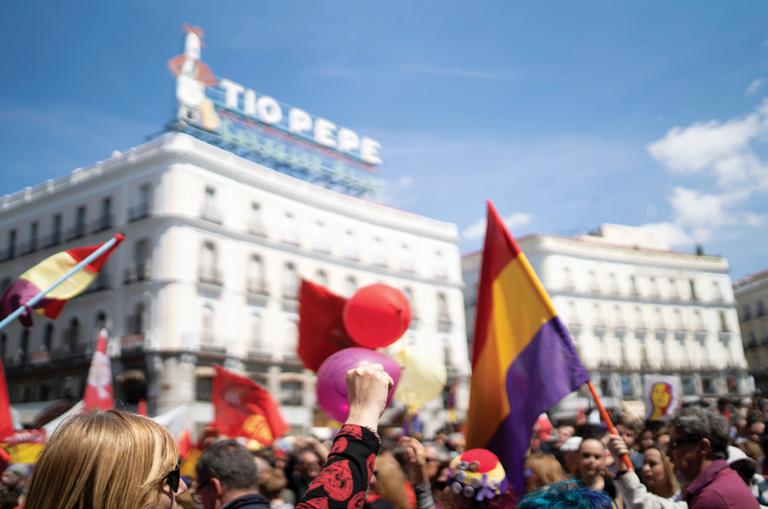



is about money!
Queen Elizabeth II passed away and her posi tion was overtaken by Charles III, some voices talking about the future of monarchy were ris en. And is it really so dysfunctional and impractical. Well, the list of the richest nations in the world shows that the monarchies are usually – the richest! It might be because there is no duality between the two branches of power (either the monarch rules and the elections are scarce, like in Asia, or the monarch is just a figure), or something else, but Monaco, Liechtenstein and Luxem
bourg are the 3 richest countries on God’s Earth. Too small and too easy to rule? They are followed by Singa pore and Ireland, two successful multilingual republics, and then again, Qatar (monarchy), Switzerland (confed eral republic), Norway (monarchy), UAE (confederal monarchy), the USA, Brunei (absolute monarchy) and the oldest republic of all, San Marino. All in all, out of 50 richest nations and territories, 29 are monarchies and 21 republics. Was it all about the system? Or it is about multilingualism or religion? More next month!
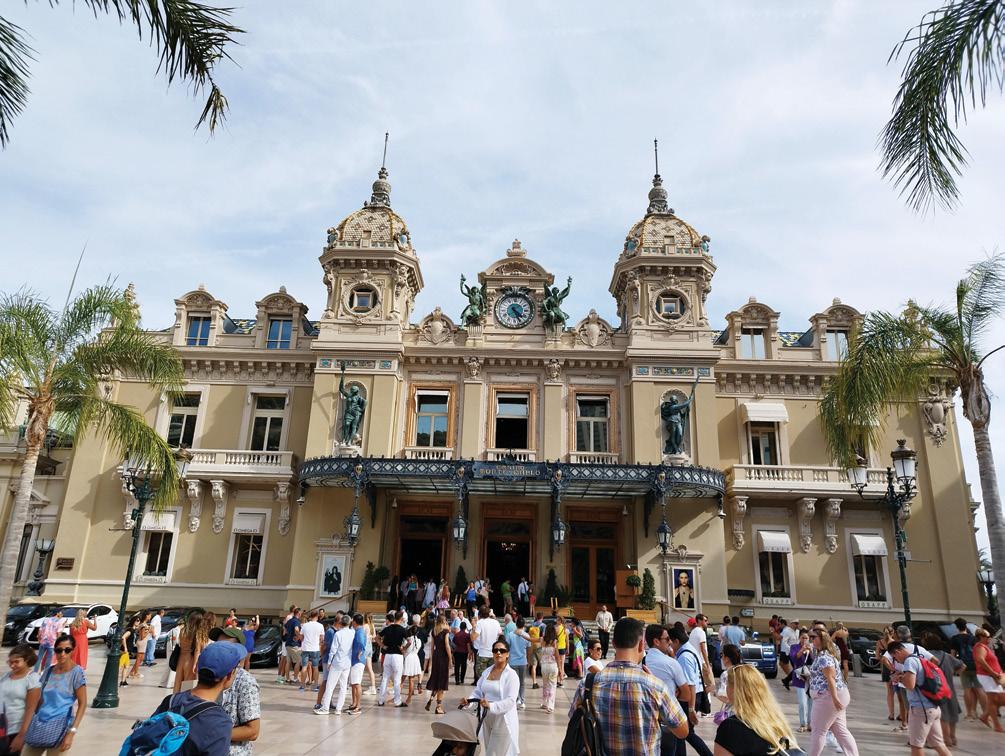









octoBEr 23 HungarY 1956 Revolution Memorial Day 24 un UN Day 26 auStria The Neutrality Constitution of 1955 28 cZEcHia Independence from Austria-Hungary 29 tÜrkiYE Republic Day noVEmBEr 01 algEria Start of the War of Independence 11 angola Independence Day 11 poland Independence Day 15 BElgium King’s Day 18 morocco Independence Day 22 lEBanon Independence Day 28 alBania Dita e Pavarësisë –Independence Day a s
It
tHouSand of pEoplE lEft to protESt againSt tHE monarcHY during tHE dEmonStration on tHE anniVErSarY of tHE proclamation of tHE SEcond rEpuBlic. spain, madrid 04/2019Photo: Aydan Metev / Shutterstock 10 www.diplomacyandcommerce.rs I NTE r ESTING FACTS NATIONAL dAyS
ankE konrad
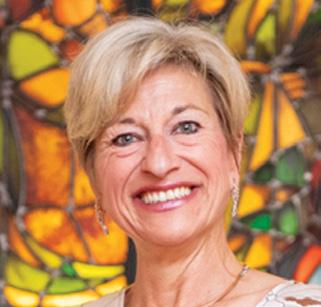
H.E. the Ambassador of Germany to Serbia
Her Excellency Anke Konrad has been appointed as the new ambassador of Germany to Serbia. She was born in 1966, in Süderholz in Mecklenburg–Western Pomerania federal state of Germany, then East Germany (DDR). She’s married and has three children. Before Belgrade, she worked in German embassies and diplomatic mis sions in Warsaw, Geneva, Abidjan, and Lusaka. This is her first appointment as ambassador. After graduating in Russian language and literature, she worked at the University of Greifswald before went for diplomacy at Bonn Diplomatic Academy. From her biography, we can learn that she is fluent in Russian and Polish. From 1985 until 1990, she studied Russian language and literature in Moscow, where she graduated in Slavic studies. Her

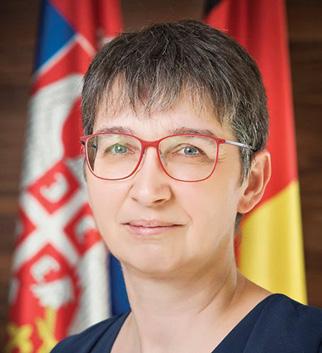
catHY BuggEnHout
first appointment after graduation was at the Univesity of Greifswald, where she worked as a research associate. Later she attended the Diplomatic Academy in Bonn, which was the start of her career in diplomacy. Right after the Academy, she joined the Ministry of Foreign Affairs and was sent to Warsaw at the Embassy of Ger many to Poland. In Lusaka from 2002 until 2004, she was a permanent deputy to the ambassador to Zambia, which succeeded in the same role in Côte d’Ivoire in the next two years. From 2006 until 2010, she was part of a permanent mission to international organisations in Geneva. After spending four more years in Warsaw Em bassy, she was promoted to Deputy Head of Department at her home Ministry of Foreign Affairs in Berlin.
H.E. the Ambassador Extraordinary and Plenipotentiary of Belgium in Serbia
In August 2022, HE Cathy Buggenhout was appointed as the ambassador of Belgium to Serbia just after be ing positioned as deputy director of the Division East Europe, Southeast Europe, Caucasus and Central Asia. She worked as consul general of Belgium in New York (United States) and Shanghai (P.R. China). A rich car rier in diplomacy and foreign affairs started as early as 1993, and interestingly, one of her first duties was in the Balkans, where she was a legal advisor to the European Community Monitor Mission in Zagreb during the wartime in Croatia. Three years later, she was appointed to the position of the First Secretary of Special Mission in Belgrade. In her career, she worked in Paris for Belgian representation to the OECD, and in London, as political and public affairs counsellor. In Luxemburg, Mrs Buggenhout was in a position of

finance and press attache. At home, in Brussels, she had many roles, from Director of the WTO/Trade Policy Department (2011-2012), Deputy Director of the UN Department during the Belgian EU Presidency in 2010), Deputy Director of the WTO/Trade Policy Department (2004-2006) to Spokesperson of the Minister of Econo my and Foreign Trade (2003-2004).
Mrs Buggenhout is a master of Law from Leyden University in the Netherlands with a special certificate in Labour Market Economy. Also, she’s a master of Sla vonic Philology from Ghent University in Belgium and an advisor in international humanitarian law at the Royal Defence College of Belgium.
She’s fluent in French, Dutch, English and German and has a basic to good knowledge of Russian, Serbian and Bulgarian. She’s married and has no children.
After being the ambassador of Austria to Spain and Andorra, and permanent representative at UNWTO in Madrid from 2018 to 2022, his excellency Christian Ebner was appointed to be the ambassador of Austria to Serbia. He graduated in Law at the universities in Vi enna and Salzburg and, right after, started his journey in diplomacy and foreign affairs, mainly in different ministries in Vienna but also in Austria’s UN mission in New York. After graduation, Mr Ebner stayed at the University in Vienna as an assistant at Institute for In ternational Law and International Relations. Four years later, in 2004, he got a job at the International Law Department at the Federal Ministry for European and
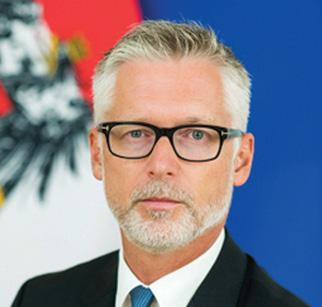
International Affairs and was soon upgraded to Chief of Secretary of State Office at the same Ministry.
From 2007 until 2011, he was the deputy of the per manent commissioner of Austria at the United Nations in New York. From 2011 until 2014, Mr Ebner worked as a counsellor for the Austrian Vice-chancellor and min ister for Europe, Integration and Foreign Affairs.
With the title of ambassador, he worked as a chief officer at the same ministry, and then, prior to his appointment in Serbia, he was the ambassador of Austria to Spain and Andorra and a permanent repre sentative at UNWTO in Madrid. He’s married and has two daughters.
The new Kuwaiti ambassador in Serbia was promot ed to ambassador rank last year. He is a Bachelor of Law and Politics / Political Science. H.E. Fayez Muj bel Sulaiman Almutairi joined the Ministry of For eign Affairs in 1988 as a diplomatic attache. Since


then, he has been appointed to many diplomatic positions in Muscat (Oman), Rabat (Morroco) and Djibouti. From 2016 until 2021, he was posted to the Ministry of Foreign Affairs. He’s divorced with six children.
 cHriStian EBnEr
cHriStian EBnEr
H.E. the Ambassador of Austria to Serbia
faYEZ muJBEl Sulaiman almutairi H.E. the Ambassador of Kuwait to Serbia
11 A rr IVALS & dE pA rTU r ES
Some of the new king’s realms may become republics
oOver the course of her long reign Elizabeth II served as head of state of 32 coun tries, most of them colonies. At her death she remained so for just 15. And for most of the subjects that she retained, the queen maintained a mere ceremonial presence in their lives. Her face appeared on banknotes and coins; prime minis ters met her; parliaments were opened on her behalf. But as King Charles III takes over from his mother, for some of the 15 remain ing realms even that limited inter action may be too much.
Many see maintaining links with Britain’s monarch as a colonial anachronism. “The time has come to fully leave our colonial past be hind,” declared Mia Mottley, Barba dos’s prime minister, in September 2020. Last November her country replaced the queen as head of state with Dame Sandra Mason, previ ously the island’s governor-general. Jacinda Ardern, the prime minister of New Zealand, has said she ex pects her country to become a re public “within my lifetime”. Before Barbados, the last country to sever ties with the British monarchy was Mauritius, in 1992. The queen’s passing provides an opportunity for others to make the break in a taste ful, diplomatic way.
Australia is a particularly inter esting case. The British monarch’s notional sway over its national af fairs has long seemed anachronis tic. In 1975 a deadlock between the House of Representatives and the Senate created a national crisis. To break it Sir John Kerr, the governorgeneral, or queen’s representative, of Australia personally dismissed the Labor government. Labor’s sup porters were distraught; in 1977 Sir John had to resign after enduring two years of protests and criticism.
His act remains one of the most controversial, and disputed, mo ments in Australian history. Sir John said he had informed Buckingham Palace of his decision only after making it. But in 2020 Jenny Hock
ing, an Australian historian, secured the release of papers from the palace showing that the queen’s private secretary, Martin Charteris, had told Sir John in advance that he had the power to dismiss the government.
Other papers showed that Prince Charles had written to Sir John after the dismissal, saying that, “What you did last year was right and the courageous thing to do”.
The release of the papers caused a storm. The reminder that, at least until recently, Britain’s monarchy exerted a considerable influence on Australian politics reinvigorated republicanism in the country. And with Charles now Australia’s king, many of its citizens will wonder if this is the moment to relinquish the monarchy. Polling finds that around one-third of Australians would back a republic. Fewer Aus tralians have links with Britain today than in the 1960s and 1970s, when it was still the primary source of new immigrants; more are aware
of the enormities inflicted on in digenous Australians by British colonialism. Ms Hocking, a repub lican activist as well as a historian, says that replacing the monarchy would be “the obvious end point of our postcolonial settlement” with Britain.
But breaking free is easier said than done. The switch to a republic would require a referendum to pass with majorities not only nationally but in at least four of Australia’s six federal states. The motion would also have to propose an alternative head of state, such as an elected or appointed president. In 1999, de spite pro-republican polling, a ref erendum failed by ten percentage points thanks partly to splits among the republican movement over which alternative to plump for. Canada, too, may decide to ditch the monarchy. But the hurdle to getting rid of Charles is even higher than in Australia. Instead of a referendum, Canada requires
“unanimous consent”: that is, a majority of the House of Commons, the Senate and all ten provincial legislatures. Emmett Macfarlane, a political scientist at the University of Waterloo, points out that no pro posed constitutional amendment has ever passed such a high bar. “The irony is that probably the most likely way Canada would abolish the monarchy is if the United King dom did it,” he says.
Some places are less strict. In New Zealand, an act of parliament would suffice to remove the mon archy. But despite her conviction that the monarchy will not last her lifetime, last year Ms Ardern said that she had not yet “sensed an appetite from New Zealanders for significant change in our con stitutional arrangements”. Many Caribbean countries could turn republican without referendums, too. Yet several have failed to de liver on promises to do so in the past. A number of Jamaican prime ministers have announced fruit less plans to unseat the queen. A referendum in St Vincent and the Grenadines in 2009 failed. Barba dos’s successful attempt to remove the queen was preceded by a failed one in 2008. Several Caribbean realms still rely on the privy coun cil, a court that advises the mon arch, as a supreme court. Changing that is another tricky challenge for republicans.
In the end, King Charles III may continue to reign over several places simply because of inertia. The modern monarchy is not as popular as it once was, but nei ther is it widely resented. In many places certain politicians might like to get rid of it; now, as the crown passes from Elizabeth to Charles, should be their moment. But many countries have far more pressing problems than King Charles.

From
under licence.
article, in English,
The Economist, published
The original
can be found on www.economist.com
The queen’s passing gives them an opportunity to
break the link to the British
crown mANy COUNTrIES
hAVE FAr mOrE prESSING prObLEmS ThAN kING ChArLES.
Photo: Wikimedia 12 www.diplomacyandcommerce.rs hOw LONG TO r EIGN OVE r T h E m? Read This on Web

NEMA STAJANJA!
Vojvodina as an attractive mini-Europe
SecretarIat In the pa St two yearS focuS and programme mea SureS
With incentives for the develop ment of business, entrepreneur ship, tourism, regional economic events and the employment sec tor, we contribute to the higher competitiveness of the Vojvodin ian economy and all its branches, boosting tourism capacities, im proving infrastructure, and facili tating employment and additional work engagement of a large num ber of people. Visibility, availability, constancy and accessibility are all features of our administration, and our efforts to invest in religious, cultural, multicultural, multi-eth nic and multi-confessional, rural and bicycle tourism, as well as in all strategic micro-destinations in Vo jvodina, in many ways are changing the comprehensive image of Vojvo dina as an economic-tourist region, which makes it a very attractive mini-Europe of sorts.
In the past two years, the Sec retariat for Economy has been focusing on micro, small and medi um-sized enterprises and entrepre neurs. Given that 2020 was a pan demic year and was characterized by anti-COVID measures, most of the economic indicators, especially in tourism, were conditioned by that situation. On the other hand, we tried to develop domestic des tinations, as well as other relevant institutions and organizations, so that tourism still generated income from domestic tourists, through internal migration tourism.
nEnad iVanišEVić
Vojvodinian Secretary of Economy and Tourism
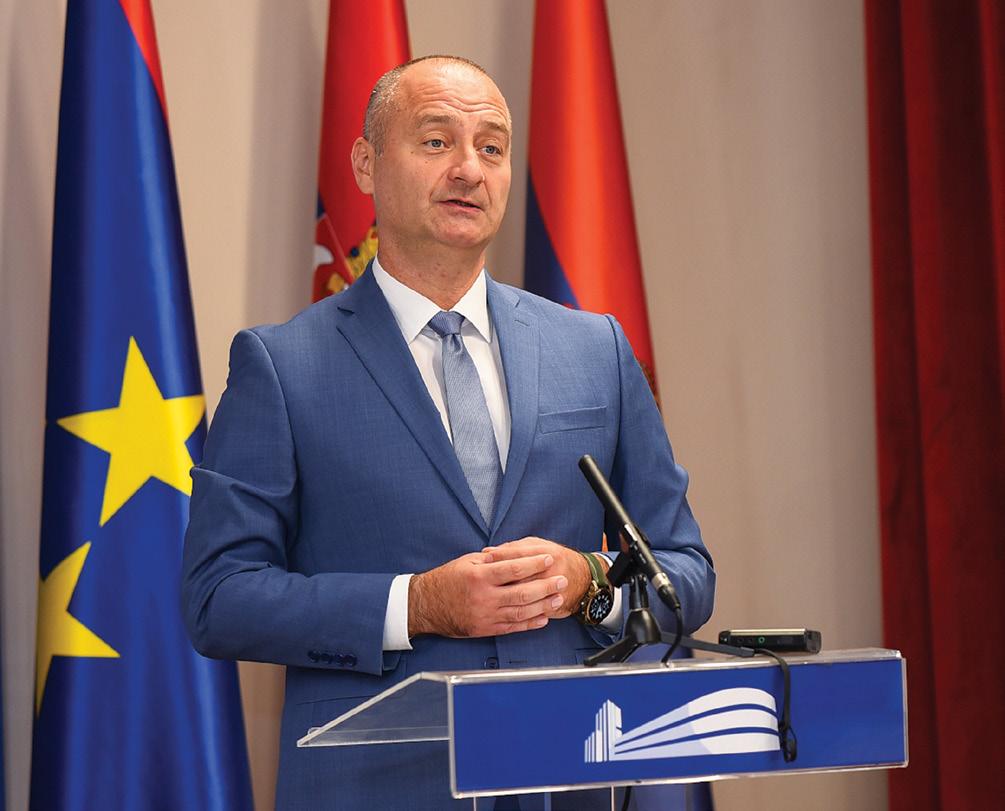
i
n his interview for our mag azine, Nenad Ivanišević, the Vojvodinian Secretary of Economy and Tourism, speaks about several current topics and gives a review of the result accom plished in the last two years.
Secretary IvanIševIć on hIS abundant experI ence and ItS uSe In the provInc Ial SecretarIat for economy and tourISm’S work
My abundant working experi ence in the public sector, govern ment institutions, in the Geron tological Centre of Subotica, as a university professor, and now as
a member of the Provincial Gov ernment, has enabled me to use a wide range of experiences and know-how acquired in many ar eas of strategic importance for the development of the economy and infrastructure, but I also implement social policies in my work in the Provincial Secretariat for Economy and Tourism. Performing the duties of State Secretary in the Ministry of Labour, Employment, Veterans and Social Affairs and in the Min istry of Construction, Transport and Infrastructure, as well as be ing a special advisor to the Deputy Prime Minister of Serbia, and the
results achieved during the abovementioned mandates had a great influence on my current position.
As a provincial secretary, I can con tribute a lot, establish, define and create, in line with the competenc es of the Secretariat’s departments – economy, tourism, employment and electronic communications.
Drafting public policies is certainly a very important, but also truly dif ficult task because you have to keep in mind a handful of indicators that must be incorporated in all aspects of these policies in such a way that everything presented functions as a whole.
Thanks to a budget increase at the very beginning of the mandate and its review in September 2021, when it was increased by over 100 percent, the Secretariat allocated significant funds for the develop ment of entrepreneurship and micro, small and medium-sized enterprises, which are driving force behind the development of both individuals and the community. In 2022, thanks to its support meas ures, the Secretariat subsidized the costs of purchasing machines, equipment, software, intangible assets, and raw materials, improve ment of business activity and market competitiveness, including support for innovative products and processes, the introduction of digitization in business processes, provided support for arts and crafts and female entrepreneurship. Funds were allocated in the form of subsidies, but also refunds.
We have also co-financed the program relating to the develop ment and operation of local social and economic councils, as well as
With incentives, we contribute to the higher competitiveness of the Vojvodinian economy.
wE ALSO prESENTEd ThE FIrST GUIdE FOr dIGITAL NOmAdS IN ThE Ap VOjVOdINA, whICh wE SUppOrTEd.
14 www.diplomacyandcommerce.rs INTE rVIE w Read This on Web
the work and establishment of local tourist boards.
In terms of employment, we are trying to improve it through special competitions, which rules stipulate banning layoffs for a period of six months and employing workers for an indefinite period, in order to save as many jobs as possible.
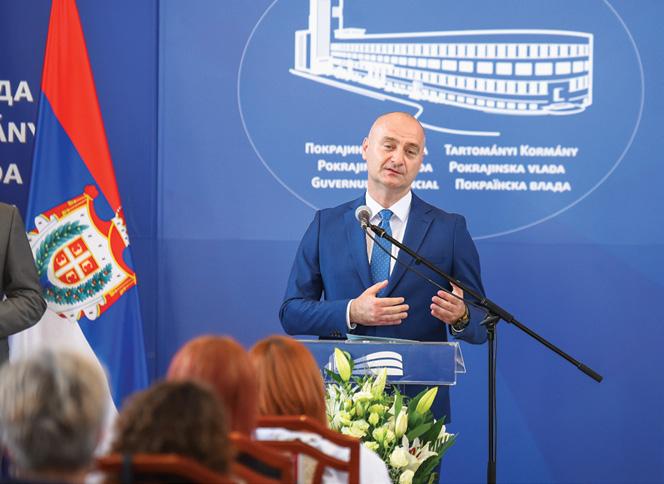
The competition for arts and old crafts also boosts competitiveness. In addition to well-known events, and there are over 1,800 annually in Vojvodina, old crafts, as well as handicrafts and works of art, are another generator and driving force for tourism, attracting a large number of domestic and foreign tourists who want to spend more in a certain location for the duration of the event.
the beSt of vojvodIna project
We have re-launched the Best of Vojvodina product quality mark, which now also applies to the ser vice sector (tourism and catering), as well as to the event sector. This project recognizes and rewards the best product, service and business, while all awarded products meet European product quality stand ards, namely, they are all HACCP and ISO certified. By awarding this mark, we focus on the domestic economy and production, as well as on the service activities of compa nies in Vojvodina. In 2021, this des ignation was awarded to 18 users who are entitled to use the Best of Vojvodina designation in the next three years. They also undergo sys tematic control to check whether they are fulfilling the required con ditions. This year, the Commission is yet to decide who will be given the Best of Vojvodina designation.
IncentIveS In numberS
In the period from 2016 to 2020, the Provincial Secretariat for Econ omy and Tourism allocated a total of 1.7 billion dinars worth of over 3,000 individual subsidies. From 2016 to 2021, it allocated a total of 1.1 billion dinars as incentives to 1,700 beneficiaries. In tourism, in the same period, the Secretariat al located a total of 742 million dinars to 649 business entities and asso ciations through incentive funds, while for the employment sector, got 415 million dinars from the Sec retariat, which directly facilitated the employment of about 2,500 people in Vojvodina.
In 2022, 213 million dinars were allocated to businesses, 185 million dinars to tourism, and 50 million dinars for employment purposes, which has resulted in the employ
ment of 180 people in the territory of the Autonomous Province of Vojvodina.
projectS Implemented by the SecretarIat
The Secretariat has also signed a contract with the Ministry, which provides funding for the drafting of project documentation as part of the project realization process and the implementation of project ac tivities on the former PetrovaradinBeočin railway corridor. This route, which is about 20 kilometres long, is intended as a special purpose area - more precisely a tourist route known as the green path. There has been a strong interest in transform ing the railway into a green path for pedestrians and cyclists.
We implemented a project to renew the existing tourist signage in the wider area of Fruška Gora, on
I would like to point out that we have recently opened up new top ics such as blockchain technology and initiated discussions with the experts and representatives of the business sector.
Furthermore, we have signed a cooperation agreement with the Italian-Serbian Chamber of Com merce (Belgrade Business Associa tion) which stipulates mechanisms of cooperation on common visions and goals, to have more effective action on improving the business climate in the AP Vojvodina. We want to organize a presentation on the potential of Italian companies in Vojvodina, and connect our com panies with Italian ones.
At the Educational and Training Centre for Professional and Work Skills in Novi Sad, we presented a training module for solar panel installers.
Vojvodina, in Čenej, from Septem ber 25 to 27. The event was organ ized by the Committee for Space Program Development (CSPD). Additionally, we have defined co operation parameters with a special focus on the tourism aspect and economic potential. The Cham pionship is run by a Consortium headed by India and Serbia and includes 62 countries, while 15 countries made it to the Champion ship finals.
what IS the current SItuatIon In the tourISm and economIc Sector In vojvodIna?
the section of the EuroVelo 6 cycling route in Vojvodina, on the high ways E-70, E-75 and along the rivers Danube and Tisza, we completed the documentation for the installa tion of tourist signage in the areas of Upper Danube and South Banat, and the documentation for the construction of bicycle paths on the European Corridor 6 (Danube route) on the Novi Sad-Belgrade stretch.
We are currently drafting the project documentation for the Begeč-Bačka Palanka bicycle path and the Bačko Novo Selo-Bačka Palanka section, as well as for the first-class Novi SadBelgrade road, number 100.
We also presented the first guide for digital nomads in the AP Vojvodina, which we supported. This unique digital and printed edition is published in English and contains all the facts related to the comparative advantages of Vojvo dina, as a destination that should attract people who use modern digital and communication tech nologies to do their job and live a nomadic lifestyle.
Finally, I would like to underline that we supported one of the most globally significant events - the World Final of the CanSat/Rocket Championship, which was held in
According to the data collated by the Chamber of Commerce of Vojvodina, in the first five months of this year, 89.9 percent more guests came to Vojvodina than in the same period last year, of which 42 percent were foreign guests. The total number of overnight stays went up by about 70 percent. These data show that tourism has managed to recover. We are ap proaching the figure of half a mil lion overnight stays recorded in the first half of the year, which clearly shows the tendency to exceed the 2019 data. I am especially happy to see that our citizens travelled across Serbia and got to know their country much better. The Secre tariat’s investment of over half a million dinars in the past period in boosting tourist capacities in the AP Vojvodina facilitated repeated tourist visits to Vojvodina (a 200% increase in the number of tourists relative to 2021). Current indicators and expert predictions show that 2022 will be much better than 2019, which is taken as a reference year in terms of tourism.
A more serious and uniform ap proach to the branding of Vojvodina as such and its products, the pro cess of certification and standardi zation of resources, as well as their media promotion, are our focus and goal, while Vojvodina’s ample diversity has a strong influence on the perception of art and culture.
two yearS at the ServIce of benefIc IarIeS
The Provincial Secretariat and I, at its helm, have been working very diligently on the best pos sible visibility of the activities and programme measures we imple ment to cover the greatest possible distances and reach as many people as possible, i.e. those who need institutional support, a kind word, public visibility or support in the realization of plans, undertakings and projects.
wE hAVE rE LAUNChEd ThE bEST OF VOjVOdINA prOdUCT qUALITy mArk, whICh NOw ALSO AppLIES TO ThE SErVICE SECTOr (TOUrISm ANd CATErING), AS wELL AS TO ThE EVENT SECTOr.
15 INTE rVIE w
journalism as a profession, not an ideology
I trust news more than opinions because every opinion is essentially fake news.
JoVana JokSimoVić Editor-in-chief of the Tanjug news agency

at a time when the public blames journalism for all the problems in society, we spoke with Jovana Joksimović, jour nalist and editor-in-chief of the Tanjug news agency, about the challenges of her profession, while at the same time, she shed light on the most common prejudices re lated to the relation between jour nalists, the political system and so ciety as a whole.
Your long-standing journalistic career has been quite diverse. Apart from being known as the editor and host of a very popu lar morning programme, since last year, you have also been the editor-in-chief of the larg est national news agency. How challenging are these different genres of journalism for you? Could you tell us which one is your favourite?
Since both the morning pro gramme and the agency deal with information/news, I would disagree with you about these two being dif ferent genres. Journalism is simply journalism, a job that consists of telling people what is happening around them and in the world, so I deal with one and the same thing both in the morning and the af ternoon, and that’s my favourite. I report the news.
Morning programmes on all TV stations in Serbia are one of the most watched and most popu lar programmes. Has that hab it of “turning on the TV” as soon as we get up perhaps fad ed a little today and instead we all turn on our mobile phones first?
There is a theory that says that, in about thirty years, there will be no TV sets, but it does not say that there will be no TV stations and TV programmes. And that is, you will agree, quite true, as we watch

ThE mOST TErrIbLE ThING IS ThAT ThE mEdIA ThEmSELVES hAVE dECIdEd TO GIVE Up ThEIr INdEpENdENCE ANd SIdE wITh A CErTAIN OpTION Foto: Miloš Nadaždin 16 www.diplomacyandcommerce.rs INTE rVIE w by Dragan nikolić Read This on Web
more and more programmes on our tablets, laptops and phones. Our job is to adapt to that, as well as the generations to come who have no desire to watch anything for more than a few minutes.
How much does the way news is consumed change the way it is transmitted? As an edi tor, what do you think of the necessary changes that jour nalism is currently going through?
They are not that bad because these changes are forcing us to re turn to the basic postulates of the profession that we have somehow neglected - to be fast, accurate and to break the news immediately. Many journalists today do not know what a lead is. Now, they will have to learn, if they want anyone to read, listen to, or watch them.
In my opinion, the most terrible thing is that the media themselves have decided to give up their inde pendence and side with a certain option. Whoever they work for, it’s their choice, just like it’s their choice to work against someone, and to engage in politics, instead of just reporting about it. There are al most no media outlets that are not convinced that it is their God-given right to decide who should win the elections, even though they do not participate in those elections per se, nor would they pass the election threshold. And that is horrible!
How can you uphold the digni ty of the journalistic profession?
How can we defeat the tab loidization of the entire society, which has a growing appetite for sensations, scandals and ca tering only to basic instincts?
The inevitable question, with out which we could not imag ine this conversation, is related to media freedom. We are very interested in your view on this matter, especially considering that your name and the media you work at are often viewed as being “closely linked to the state authorities”.
We were labelled that on certain social media platforms, thanks to the rumours spread about us by the competition, which doesn’t toler ate anyone who would go about their business without siding with anyone. For them, journalism is not a profession, but an ideology, and that’s why they need to dig trenches and shoot everyone who isn’t in them. For them, it is more important to shout slogans than to report the news, and you cannot re ally talk to slogans. On several occa sions, I tried to get an explanation about what this “close link to the state authorities” actually entails and I never got one since it does not exist, nor is it important. The only thing that mattered to them was de grading someone because they did not side with anyone.
Is it utopian to expect that the media can be independent to day (from a global perspec tive)? Has media freedom long since disappeared and the state authorities are now in the same subservient position to big cap ital and corporations?
To be clear, tabloids have existed since the time of William Hearst and Joseph Pulitzer, so basically they have always been here and will continue to be. They did not create the society, but the society created them. And I use the word “society” on purpose instead of the word “politics”, because politics only uses what society serves it on a platter. Maybe, we should all change, not the tabloids.
Which type of journalism pre vails today – copy journalism or the investigative kind?
One of the first rules you are taught in journalism school is that “adjectives are the greatest enemy of nouns”, therefore also enemies of writing and reporting. That’s exactly why I never liked adjectives to be used in conjunction with the word “journalism”, even by those people that talk about various “types” of this profession. If you want to report news from an outdoor green market, you have to go there in person and talk to sellers, wholesale buyers, management, inspectors, shoppers, cleaners… Once you do that, you need to make a three-sentence news piece, which you cannot even claim as your own. And that is true for whatever you do. This is not any spe cial kind of “investigative” journal ism, but simply your job. That’s why I think that “types of journalism” were invented by people to add something to their name, not to their profes sion. And by doing so, they ruined it.
When you are not at work and when you change into ‘civilian’ clothes, do you be lieve the news you read and watch? What do you think about today’s media con tent? What advice would you give to readers and viewers?
I would tell them that they should demand the media to do their job and serve the purpose for which they were created, to report the news to the people and not to tell them what to think. That’s the principle I work by. I trust news more than opinions because every opinion is essentially fake news.

mAybE, wE ShOULd ALL ChANGE, NOT ThE TAbLOIdS.
Foto: Miloš Nadaždin 17 INTE rVIE w
The biggest challenge in the work of the Commissioner’s Office
The amendments to the law are so comprehensive that at this moment it is impossible to assess whether they have achieved the expected goal so far.
ThE ESTAbLIShmENT OF ThIS SySTEm
bENEFITS bOTh FOr CITIzENS whO
C
ommissioner for informa tion of public importance and personal data protec tion, Milan Marinović speaks about new amendments to the Law of Free Access to Information of Pub lic Importance and all challenges that he faces with implementing it in practice.
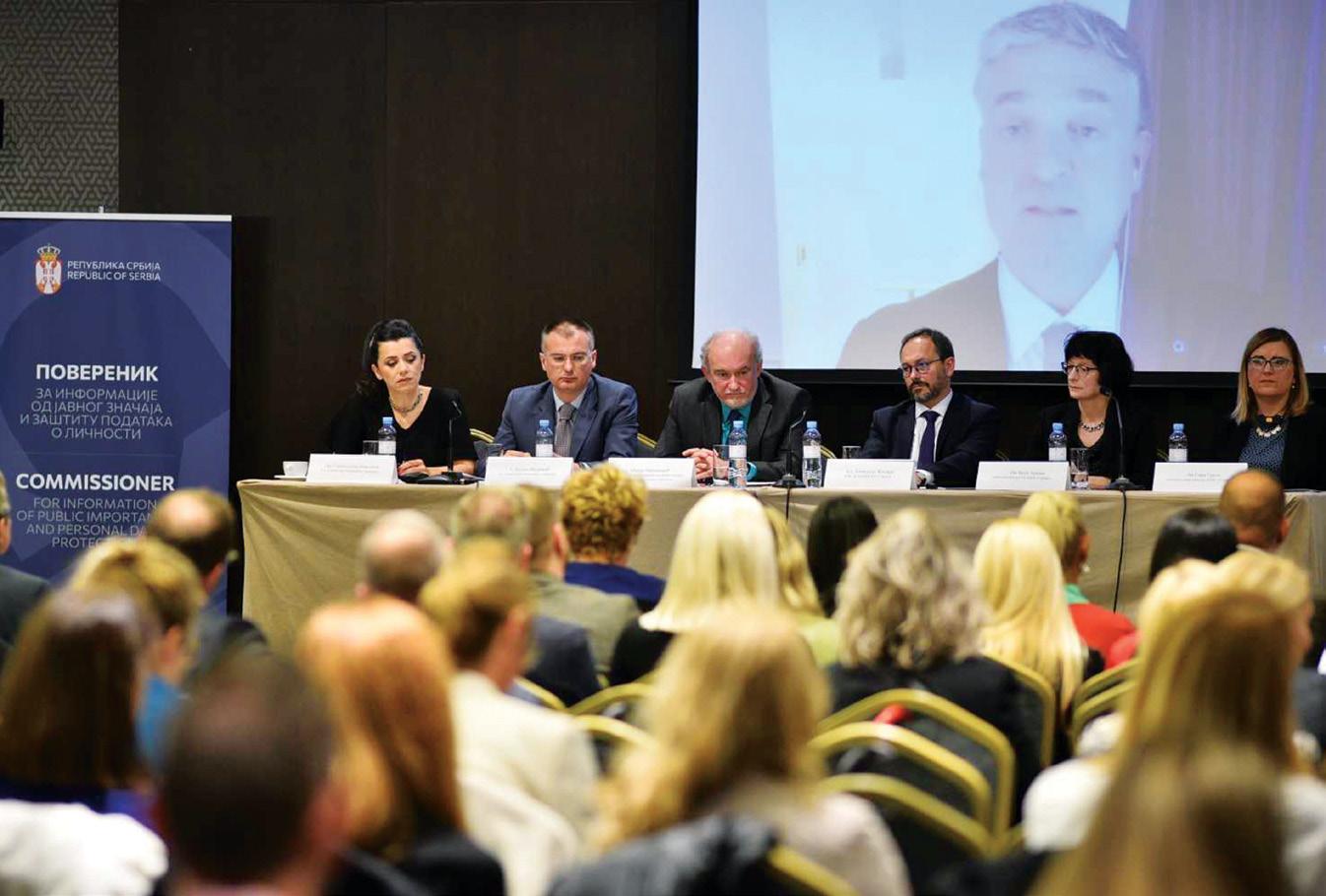
Did the amendments to the Law on Free Access to Information of Public Importance achieve the expected goal?
LOOkING FOr INFOrmATION
FOr AUThOrITIES
The amendments to the law are so comprehensive that at this moment it is impossible to assess whether they have achieved the expected goal so far. I would like to point out that the Commissioner is currently, and that will certainly take some time, acting in parallel both on appeals submitted under
the previous text of the law and on appeals submitted under the amended law. Some of the changes will require much more time and practice to assess their effects. And for some of the changes, the effects of their introduction cannot be assessed at the moment since the legal deadline for their implemen
tation has not yet come. Neverthe less, it can be said with consider able reliability that certain changes have already begun to produce their positive results. I am primarily re ferring to those changes regarding the significantly expanded powers of the Commissioner.
What extended powers did it bring you? Please give exam ples of where you are already applying them.
We have obtained new powers in dealing with appeals requesting confidential information, the pos sibility to impose a fine on the au thorities for non-implementation
milan marinoVić Commissioner for information of public importance and personal data protection
brINGS
ArE
ANd
Photo: Marko Rupena
18 www.diplomacyandcommerce.rs I NTE rVIE w Read This on Web
of our decisions, and the right to demand from the authorities all information relevant to the appeal decision, especially those concern ing misdemeanour liability of the authorities’ actions against the law. Thus, the Commissioner is already issuing misdemeanour orders imposing a fine of 30,000 dinars on authorized persons in public authorities or heads of public au thorities in which such persons have not been designated for fail ing to act on the received request for free access to information of public importance in cases of socalled “administrative silence”. By collecting fines imposed in the said manner, the Commissioner now joins the circle of budget fillers. We have also started filing requests to the competent misdemeanour courts to initiate misdemeanour proceedings against the respon sible persons in those authorities that we determine, during the ap peals procedure, to have commit ted some of the misdemeanours under the law.
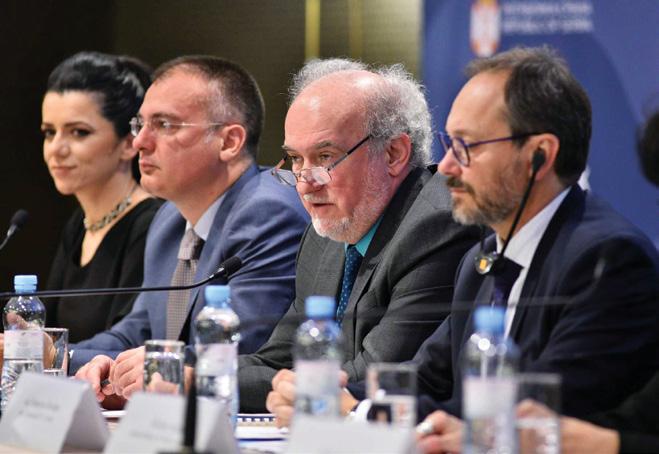
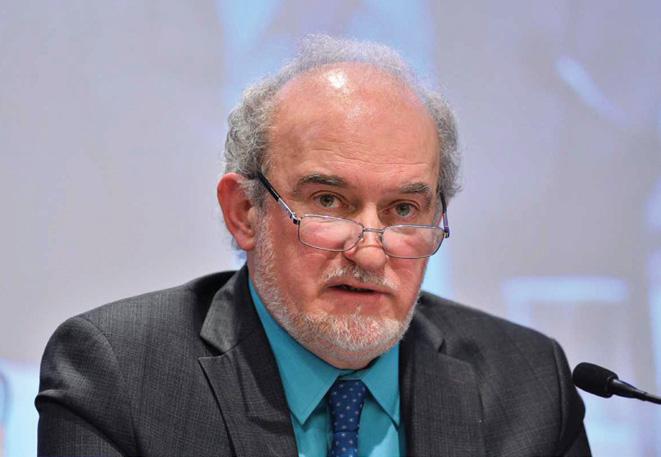
Why is November 16, 2022, so important?
In terms of its long-term ef fects, the most important change in the law is inseparably related to November 16 of this year. On that day, the legal deadline expires for all authorities that have the legal obligation to publish Informa tion Booklets on their work via the Unified Information System of Information Booklets platform, which is managed and maintained by the Commissioner. If by then the authorities do not fulfil their obligation and do not prepare and publish Information Booklets on their work in the prescribed man ner, the Commissioner will begin to implement his legal authority and file to the competent misdemean our courts a request for the initia
tion of misdemeanour proceedings against the managers of those authorities with a fine from 20,000 to 100,000 dinars. This obligation to create and publish Information Booklets on the work of public authorities is extremely important for the more effective realization of the right to free access to informa tion of public importance in the Republic of Serbia. If it is taken into account that the content of the In formation Booklet was significantly changed by the amendments to the law, by increasing the number of columns with data on the work of public authorities from nine to as many as twenty-four, which, among other things, includes data on public procurement and paid salaries and other incomes, it can be assumed that citizens, to a much greater extent than before, will be able to more easily obtain certain
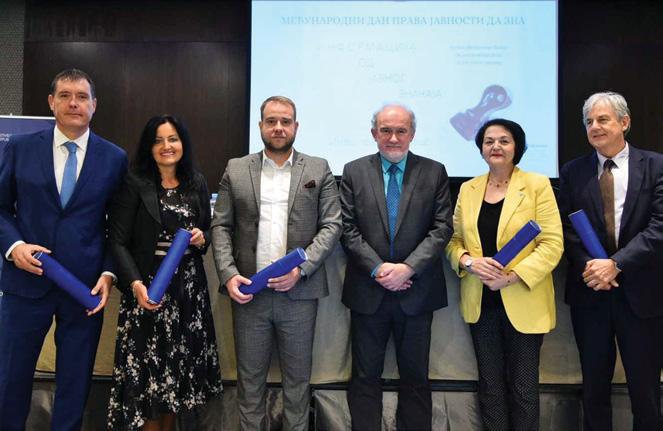
information on the work of public authorities, and thus the need to submit requests for free access to information of public importance will be reduced.
What benefits do state bodies have, and what benefits do cit izens have from the mentioned platform on which public insti tutions submit reports on their work?
The establishment of this system brings benefits both for citizens who are looking for infor mation and for authorities. In ad dition to the fact that much more information about the work of the authorities will now be published in advance, citizens will be able to get the desired information simply and quickly, with just a few “clicks” on the computer instead of starting the procedure by submit
ting a request to the authority and then by filing a complaint to the Commissioner, which, in some cases, meant it could take several months, which in some cases even led to making the right itself abso lutely meaninglessness. Authori ties will benefit from the publica tion of Information Booklets by no longer being “overwhelmed” with requests for free access to information, and thus increased visibility and transparency of their work will consequently lead to strengthening citizens’ trust in those authorities and their work. The fact that these Information Booklets will be published for the first time on a single platform of the Commissioner will undoubt edly contribute to the uniformity of the Information Booklets of all authorities, their better readability, and as well, easier control by the Commissioner.
What challenges are you cur rently facing in your work and what do you plan to improve in the upcoming period in the field of the right to access in formation?
Unfortunately, so far, just a small number, out of the estimated four teen or fifteen thousand authorities that are obliged, have fulfilled this obligation, so I use this opportunity to forewarn them to do so within the legally prescribed deadline of November 16. This is currently the biggest challenge in the work of the Commissioner’s Office, and we will use all available means to persuade the authorities to respect this ob ligation. For this purpose, but also to familiarize all interested parties with the changes in the law, we are planning to hold a large number of lectures, round tables, and meet ings, and along with all of this, we expect a great deal of support from the media.
ThIS IS CUrrENTLy ThE bIGGEST ChALLENGE
IN ThE wOrk OF ThE COmmISSIONEr‘S OFFICE, ANd wE wILL USE ALL AVAILAbLE mEANS TO pErSUAdE ThE AUThOrITIES TO rESpECT ThIS ObLIGATION
Photo: Marko Rupena
Photo: Marko Rupena
Photo: Marko Rupena
19 I NTE rVIE w
Energy-efficient construction as a prerequisite for a healthy environment
environmental responsibil ity and energy efficiency is the guiding idea of the Wie nerberger Company, a global leader in the production and sale of con struction materials and infrastruc ture solutions. They conduct their business in Serbia in line with the world standards, and the system solutions produced in their factory in Kanjiža also meet world stand ards and norms. We spoke with Ivan Vujisić, member of the Manag ing Board and Commercial Director of Wienerberger Building Solutions Central Balkan, about the innova tive methods that this company im plements, and the practices that prioritize energy efficiency in con struction.
What does having an energyefficient space imply?
Such a space, whether it is a house, an apartment or some other facility, should ensure the desired quality of life and a sense of com fort with as little energy use as possible. Consequently, reduced energy needs imply less use of electricity and gas. Decarboniza tion, which is still in its infancy in our country, can also lead to the reduction of the greenhouse effect, thereby also affecting the preserva tion of the environment.
In terms of a healthy living en vironment, the first thing that comes to mind is regular hy giene, cleaning and ventilation of the space. What about oth er elements of healthy housing, such as the choice of materials and quality construction?
Polluted air and CO2 emissions represent a major threat to the en vironment. We try to ensure that our materials have as little CO2 as possible, as well as to use materi als that better insulate the space
with the view of reducing the use of energy for heating and cooling. It is also very important that the materials last a long time, because the longer they are used, the lower their impact on the environment is.
The impression is that Serbia has never had such lively con struction activity. Is Serbia ready for the transition to con struction that less harms the environment and why should developers choose green ma terials?
I think that awareness about the necessity of construction that causes less damage to the environ ment is slowly but surely growing in Serbia. Most of the new build ings meet the minimum standards of energy consumption, which is recorded in the energy passports, which are also still in their infancy.
Furthermore, the energy crisis affecting the whole world has sig nificantly influenced the growth of consumer awareness of the need for efficient space. Still, it is notice able that we are lagging behind global standards.
How does the Wienerberger Company manage to achieve such impressive results in en vironmental responsibility and efficiency? What are your strongest assets?
First of all, we respect our con sumers and the environment. We think long term and our business is based on decarbonisation, circular ity and biodiversity. Our products are completely natural, given that we use natural materials, such as clay. I always liked the term borrow area, because we really do borrow from nature, and therefore we have
to return something to it. In Serbia, we are even the bearer of the ecomark, which confirms that we take care of the environment.
You recently presented new products manufactured by your factory in Kanjiža, in which you invested over 10 million eu ros. What have been the reac tions of your customers so far and what makes new products stand out in the market?
The clay never changes, but the technology does. We, as global lead ers, use the latest technology in the factory in Kanjiža, which is our latest investment that we aspired to reflect the global standards, con sidering that 60 per cent of its prod ucts are intended for export. New products are not lagging behind world trends and contain less CO2 per square metre, are lighter and more durable, pollute less, and are more aesthetically pleasing. Twist 9 is the new tile design produced in Kanjiža, while some old and always popular brands, such as Kontinen tal 9, have been modernized.
Could you tell us something about Wienerberger‘s plans and projects in the coming period?
When you are the market leader, the unfortunate thing is that you will be copied very quickly. Our rule of thumb is that a product is con sidered new for seven years, after which it is perceived as something that needs to be improved. We al ways have innovations ready, which we usually implement seven years after the previous big investment. This year, we were surprised by the high demand for our products, so I would have to apologize to our loyal customers because the pro duction could not always keep up with the demand, even though the factory was working at full steam. However, now that the factory is in full operation, you can expect many new products from us in the next seven years.
 iVan VuJiSić, member of the Managing Board and Commercial Director of Wienerberger Building Solutions Central Balkan
iVan VuJiSić, member of the Managing Board and Commercial Director of Wienerberger Building Solutions Central Balkan
I ALwAyS LIkEd ThE TErm bOrrOw ArEA, bECAUSE wE rEALLy dO bOrrOw FrOm NATUrE, ANd ThErEFOrE wE hAVE TO rETUrN SOmEThING TO IT.
20 www.diplomacyandcommerce.rs corporate COrp Or ATE
The energy crisis affecting the whole world has significantly influenced the growth of consumer awareness of the need for efficient space.

recessions as a test of the strength of the bank-client relationship
in the last two decades, the economic sector in Serbia has learned the importance of resilience in a crisis. After the 2008 recession and the global crisis caused by the pandemic, it contin ues to operate with long-term nega tive effects, disruptions in the sup ply chain and, more recently, inflation. This is why this sector’s sense of the financial health of businesses is essential, and under standing revenue flow and liquidity management often makes the dif ference between survival and exit from the market. We spoke with Dubravka Djedović, a member of the Managing Board for corporate clients and investment banking at NLB Komercijalna Banka, about how banks can be a support, as well as why the strong relationship with corporate clients, based on trust, is experiencing a renaissance in the recession period.
In what way has the current crisis apostrophized the impor tance of the relationship be tween corporate clients and banks? How can trust and transparent communication help businesses get through the recession more easily?
Recessions are a kind of test of the strength of the relationship be tween banks and all their clients, es pecially corporate ones. Take small businesses for example - for them, doing business with a bank is not only important for access to capital, but also for other seemingly less important things, which can often prevail in the face of an unpredict able business environment. When the future of your business is in question, you certainly don’t want to be wandering around automated phone lines and numbers looking for a solution. Likewise, you don’t want to stand in line behind bigger,
prioritized clients while waiting to apply for a loan or government as sistance. No, in moments like those, you want a person in the bank who knows your business inside and out, making every step of the banking process more personal and efficient. This key support for businesses is woven into the very DNA of our new NLB Komercijalna Banka.
You say that „it is important for a bank to know its clients’ business inside and out”. What concrete benefit does that bring to clients?
When you know your client’s business as well as your own, you can always offer them the right solu tion. NLB Komercijalna Banka of fers a whole range of products and services, each of which can be a good
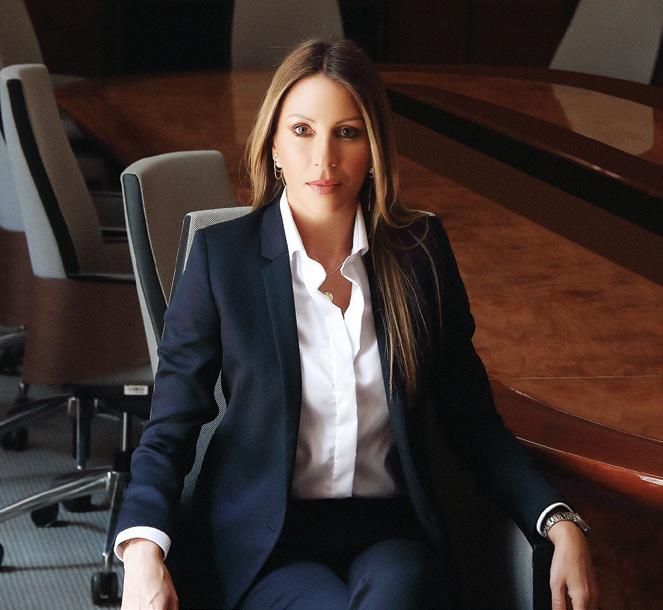
tool for overcoming challenges or improving business, depending on the circumstances, such as loans, securities management, factoring, guarantees and documentary busi ness, all the way to redemption of debt claims, exchange rate protection instruments and special loan pro gramme for small business owners and micro, small and medium-sized enterprises, such as the Cosme line for improving business and increas ing competitiveness.
Can directing businesses to ward green banking products be a good tool for overcoming the consequences of the ener gy crisis?
Although energy-efficient solu tions may seem more expensive at first glance, there is always a clear
calculation of significant savings behind them. Interest in this type of lending has been growing expo nentially in Serbia in recent years. The reason is the obvious economic and environmental advantages for all participants - clients, banks, the state and society as a whole. This is precisely why, in the current chal lenging economic circumstances, it is more important than ever that we remain focused on the green transition, while educating sector by sector and client by client. Be cause of all this, we do not expect the global recession and the con sequences of the pandemic to slow down and limit the demand for this type of loan. On the contrary, we predict that, in the coming period, we will see their full potential for every economic segment and every household, and what we call to day green finance will soon become just finance. A transition period is necessary, but we are already seeing strong demand for these products as our clients are increasingly fo cusing on self-sustainability.
We can deduce from all of the aforementioned that NLB Komer cijalna Banka’s strategy for cor porate clients rests on three key pillars - a strong relationship of familiarity, trust, flexibility and sustainable business. What re sults have you achieved using these pillars so far?
From the beginning of 2021 to date, we have provided unprec edented support to all our clients, adapting every aspect of their busi ness to them - from the portfolio of our products and services to our internal procedures. A jump of 20 percent and granting 470 million euros worth of new loans in the first half of this year alone, com bined with an increase in our share in the corporate lending sector, are for us solid evidence that we are on the path to stability and recovery together with our clients, as well as that we are ready for whatever comes next.
When you know your client’s business as well as your own, you can always offer them the right solution.
rECESSIONS ArE A kINd OF TEST OF ThE STrENGTh OF ThE rELATIONShIp bETwEEN bANkS ANd ALL ThEIr CLIENTS, ESpECIALLy COrpOrATE ONES
duBraVka dJEdoVić member of the Managing Board for corporate clients and investment banking at NLB Komercijalna Banka
22 www.diplomacyandcommerce.rs COrp Or ATE
U s on
TransporT & LogisTics

foc
Gr EEN L ANE FOr wESTEr N bALk AN
The major aim of the eU’s Transport Community is to complete the integration of Western b alkans’ transport markets into the eU.
ture to bring the core transport network up to EU standards. Major sustainable transport Flagship projects, connecting East to West, North to South and the coast al regions have been identified, and rail plays a central role in the plan. To further spur regional cooperation and integration, connecting capitals in the region and with the EU is an important priority, as well as the promotion of multimodal transport solutions and modal shift, and reducing transport-related pollution.
I will mention some of the projects, highlighting those with a strong relevance for Serbia. Your rail connections with Hungary and North Macedonia are already being modernised. In particular, the Niš railway bypass in Serbia will be finalised as a priority. Rail links with Croatia, vital in terms of freight and passenger transport, will also be improved. Demining of the Sava River and addressing bottlenecks on the Danube River will improve navigability of these important waterways and improve waterborne transport mode as part of the TEN-T network. Central European capi tals will be within easier reach through Sarajevo and links with the Adriatic coast improved. Rail Route 4 linking Belgrade to Podgorica and to Port of Bar will be fully re habilitated from the Serbian border to the sea, to restore this wonderful train route to its former glory.
Have you returned the railways to the Balkans, as you promised last year?
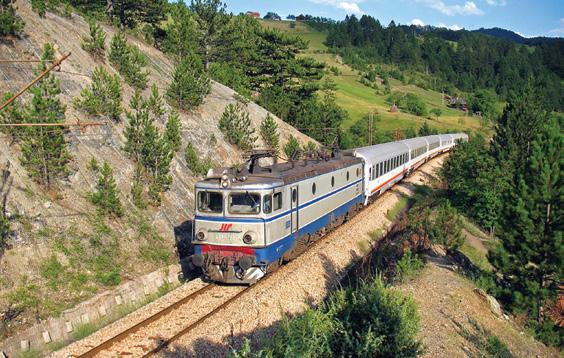
Where is rail transport in the Bal kans today, especially compared to the EU?
Many people don’t know about Transport Community. That’s why we talked to Mr Matej Zakonjšek, Transport Community’s Director, who re vealed some of their most important pro jects that will help countries from the Western Balkans in joining the EU process.

How would you explain to our read ers what exactly the Transport Com munity is and how it is important for the citizens of Serbia and the Western Balkans?
Transport Community is an interna tional organisation the field of mobility and transport. Our membership consists of 33 participants: all Member States of the European Union (EU) represented by the European Commission and six regional partners in the Western Balkans, includ ing Serbia. The aim of the organisation is clear - complete integration of Western ‘Balkans’ transport markets into the EU. In other words, there should be no difference of how transport is organised in Sweden or in Serbia, Austria or Albania. With the ‘EU’s support, we want citizens of Western Balkans region to enjoy sustainable con
nectivity in the widest sense of the word. We believe that our work in five key areas – rail, roads, waterborne transport, road safety and borders – will prepare the re gion for EU integration. At the same time, while doing this, we want to contribute to good neighbourly relations in the region, which can be done by better connecting its major cities and creating a sustainable transport network that our citizens can rely on.
Where does the region stand when it comes to investments in transport in frastructure?
Western Balkans is geographically part of Europe, and the EU is its largest inves tor. Ongoing and future investments in transport infrastructure are implemented in the framework of the European Com mission’s Economic and Investment Plan for the Western Balkans. The plan priori tises investments on the indicative ex tension of the Trans-European Transport Network (TEN-T) to the Western Balkan. Actions are being taken to speed up the construction of new transport infrastruc ture and upgrade the existing infrastruc
Rail is one of the most sustainable, in novative and safest modes of transporta tion. To mark the European Year of Rail in the region, we organised, together with the EBRD and EIB, the First Western Bal kans Rail Summit in September 2021. Min isters in charge of transport in the Western Balkans dedicated themselves to taking full part in putting rail back on track. With available funding, coordination among governments, their EU-membership aspi rations and the wish to be part of the EU’s transport market, I am sure there will be improvements in the rail system and net works in the Western Balkans.
At the moment, there is a big gap between the region and the EU when it comes to rail. Transport volumes for pas
matEJ ZakonJšEk
Director at Transport Community Permanent Secretariat
The cost of transportation is evident and is paid by the consumer through the price of the product or service.
I NTE r VIE w 24 www.diplomacyandcommerce.rs by Dragan nikolić
sengers and freight have had an overall negative trend in the last twenty years, even though investments in rail infra structure in the Western Balkans during this time amounted to around EUR 2 bil lion. This is only 11% of total investments in the road sector during the same period. Statistics from Serbia indicate that rail passenger traffic volume is only around 7% of the road (source: Statistical Report in Serbia). These numbers leave a lot of room for improvement, given the poten tial of rail to speed up economic develop ment and offer citizens a sustainable, safe and fast mode of transport.
However, there are also numerous pos itive developments. The Belgrade – Novi Sad section, part of rail Corridor X, was completed in March 2022 and is currently the only section in the Western Balkan with the speed up to 200 km/h. In the first six months of operation, the Serbian na tional railway undertaking carried around 1 million passengers on this section, around 30% of the total number of pas sengers. Furthermore, construction works on the section from Novi Sad to the Hun garian border began in April and should be completed in 2024. Improvements are also planned on railway line from Nis to Skopje, in line with our overarch ing goal of bringing rail back on tracks in the region. In summary, to answer your question directly, in terms of political focus and support – we did bring rail back on track. Did the rail system evolve into the desired state of play? Not yet, there is plenty of work in front of all of us, but we are certainly getting there.
How is the implementation of the Green Lane project progressing?
What are its advantages and what will it bring to the economy of the Western Balkans?
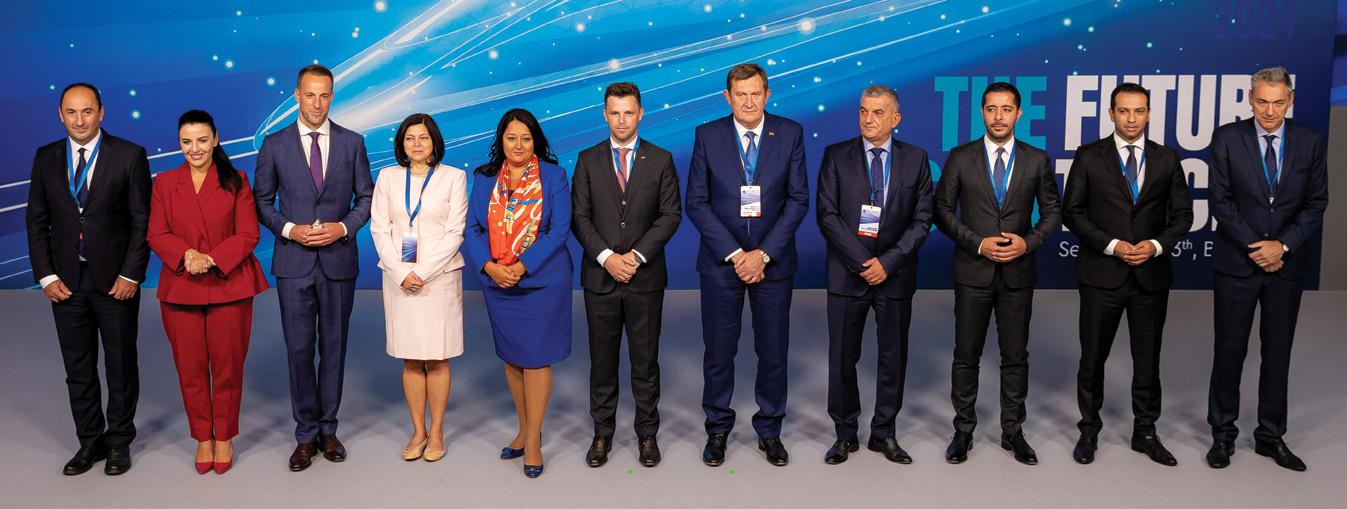
According to a 2015 World Bank study, waiting time at region’s borders was esti mated at about 26 million hours per year. A significant share of these waiting times could be avoided through improved in frastructure and better coordination. The
cost for Western Balkans was estimated to be 250-300 million EUR per year. This in cludes the costs for transport and logistic companies, but also missed opportunities in terms of the region’s economic attrac tiveness and general competitiveness.
Green Lanes are a great way to address these challenges. They were established at the beginning of the COVID-19 out break, as a joint initiative of Transport Community, CEFTA and Regional Coop eration Council to prevent shortages of essential goods and medical equipment. Their launch has proven to be one of the most successful examples of regional cooperation, managing to preserve trade flows, not only for the economic benefits, but also for effective fight against the pandemic.
Within the region, the first- priority truck lane dedicated to the Green Lanes in the Western Balkans was opened on bor der crossing Presevo-Tabanovce, between Serbia and North Macedonia. This prior ity lane serves as a green corridor for the agreed priority list of goods. In addition, establishment a well-functioning system on this crossing was facilitated by the so called „one-stop-go“ model, introduced in 2021, and now in operation in both directions. Waiting times have been re duced, while export, import and transit of goods have accelerated.
This year, the first Green Lane bor der crossing between Western Balkans and the EU became functional between Greece and North Macedonia. Exchange of pre-arrival information with Greece is now a reality, allowing for targeted risk assessments, and faster controls. This opened the possibilities for further expansion of the Green Lanes initiative to other EU Member States. Just a month ago, the electronic exchange had been agreed by the Customs Administrations of Albania, Montenegro and Italy for the goods transported by maritime transport via the SEED+ system (Blue Lanes).
By establishing the Green Lanes on the borders with the EU, we are bringing the region closer to the EU. This kind of cross
ings are a steppingstone to even better managed borders and lead to decrease of waiting times for passengers and freight.
I really expect that other neighbouring EU Member States will build on the positive examples I mentioned, and that the con cept will be applied to all border crossings between the region and the EU.
Last year you launched a traffic safety campaign related to raising awareness about the safety of lev el crossings. How would you rate this campaign today? How success ful was it?
Our regional campaign “”It’s a Thin Line” aims to increase the safety of in tersections of railways and roads in the Western Balkans, was very successful. It addressed a serious issue in the region - 59% of collisions at railway crossings result in fatalities and severe injuries. I am pleased that in all six regional partners, we encountered the full support of the authorities to tackle this issue. By joining forces, coordinating our actions and hav ing a region-wide approach to increase public awareness, we can decrease the number of accidents on rail level cross ings towards zero by 2050. The campaign targeted a wider audience via animated videos, dedicated events and printed ma terials. It is part of “soft” measures to raise all traffic participants’ awareness about the dangers of improper crossing of road/ rail intersections.
In parallel, the Transport Community is supporting the regional partners in Western Balkans to improve the infra structure, to procure safety equipment and install proper signalling on level crossings. Mapping of priority railway crossings in the region was done with EU’s support and all six regional partners participated. The Prioritisation Report which was produced as a result of map ping exercise can now be used in the pro cess of obtaining appropriate financing from relevant financial institutions, in order to improve the condition of most critical level crossings in the region.
we believe that our work in five key areas –rail, roads, waterborne transport, road safety and borders – is preparing the region for EU integration
25 Read This on Web
TThe company’s impressive develop ment, its sustainable and socially responsible business, the use of re newable energy sources and the implemen tation of the green agenda, are just some of the secrets of the success of M&M Militzer & Münch Serbia. We spoke about these and other topics with the company’s director, Filip Simović, who gave an interview for the Transport and Logistics special.
Your company has recently expanded to the entire Western Balkan region. Are you present in this market through your Belgrade subsidiary?
Last year in June, M&M Serbia expanded its operations to Sarajevo, Bosnia and Her zegovina, and Podgorica, Montenegro. Sub sidiaries in Albania and North Macedonia are under development. With its logistics centres, M&M Serbia serves as a regional hub. Through M&M, we have the oppor tunity to cover the entire region, with the highest level of services and excellent speed of shipment deliveries in all Western Bal kan countries. Of course, all new branches in the above-mentioned countries also function individually and provide services to the market in which they are located.
SErbIAN Tr ANSpOrT ANd LOGISTICS m A rk ET IS CONSTANTLy GrOw ING

Thanks to its sustainable development and the quality of the provided services, the M&M Militzer & Münch Company in s erbia doesn’t feel a crisis.
How important is regional market con nectivity to your business?
Regional market integration is very im portant, especially since we have elevated the cooperation with regional countries to a much higher level compared to previous years. Our idea is to enable unhindered delivery of goods to end customers through the regular collection service we provide for clients with whom we already cooperate in Serbia, and who are present in Bosnia and Herzegovina and Montenegro too.
Considering the looming energy cri sis, how well are people and the econ omy adapting to it? Does your compa ny have a sustainable programme for them?
Even before the beginning and herald ing of the energy crisis, M&M Serbia was engaged in sustainable development. We offer our clients international transport services with environmentally friendly vehicles that use natural gas, as do our cou rier vehicles. We also constantly strive to reduce CO2 emissions. Also, by investing in a solar power plant, we are using a natural resource to supply our logistics centre with electricity.
Solar panels are growing in populari ty and demand. What does your com pany offer to the Serbian market at this moment?
This year, by investing in a solar power plant, we have become completely inde pendent, and by using natural resources, we can offer our clients services that are in line with the highest possible standards. Our solar power plant has a 300kwh capacity, which completely meets all the needs for the smooth operation of our logistics centre.
Transport and logistics are your core business. Where is Serbia at this mo
ment in relation to the region and Eu rope?
Compared to the region, Serbia is very much ahead of the curve considering a large number of foreign direct investments. The logistics and transport market is constantly growing in Serbia. It seems to me that more trucks and free storage space are often required, which is why we are constantly developing with transport partners and expanding our storage capacity. In the last year, there was a need to increase our stor age capacity from the existing 10,000m2 to 36,000m2.
Serbia is figuratively called „a house in the middle of the road”. How beneficial was that for transport and logistics?
Do you think that we have utilized that advantage as a country or have other countries surpassed us in that?
The favourable geographical location of Serbia has had a beneficial effect on our becoming a leading regional centre. Large multinational companies re-export goods via Serbia to end consumers in the entire region. Nevertheless, Serbia has not yet utilized all its potential, but it is on the right track.
Green and socially responsible options are increasingly being considered in the modern age. What is your compa ny’s position on this matter?
The focus of M&M Serbia is coopera tion with large multinational companies that have a clearly defined environmental protection strategy. We are constantly im proving our services and in line with special requests, we offer the transport of goods by green trucks or by rail. After investing in the solar power plant, our next plan is to invest in an electric vehicle fleet and electric de livery vehicles for our courier service M&M Express.

filip SimoVić, managing dirEctor M&M Militzer & Münch RS d.o.o. regional market integration is very important, especially since we have elevated the cooperation with regional countries to a much higher level compared to previous years.
26 www.diplomacyandcommerce.rs CO rp O r ATE Read This on Web

What is the situation in road trans portation in Serbia in brief?
The public road transport sector is the carrier of about 80% of the flow of goods in the physical and financial sense and in that sense has great importance for the economy, citizens and society as a whole, as users of services. Transport exists be cause of the users of the services and it is necessary to be economically and func tionally efficient so that the users of the services have certain benefits, quality of business and quality of life.
The public road transport sector employs around 64,000 employees. Of which, 44,000 work in freight transport and around 20,000 in bus transport and achieve a total annual income of over 2,000,000,000 euros. They pay for customer service because the mobility of goods and passengers is vital. In this sense, the creating of a business environ ment that eliminates transport obstacles and creates conditions for efficient, func tional, safe and economically sustainable operations of carriers is extremely im portant for the Republic of Serbia.
Serbian carriers in road transport have a number of problems that accumulate, and the state takes about 30% of the total income through various fees, excises, contributions and taxes. Gray economy, unfair competition, lack of drivers, de
GLObAL dr IVEr ShOrTAGE dr IVES US INTO ThE Cr ISIS
The lack of professional drivers is one of the biggest challenges for the transportation industry at the moment
General Director of the Road Traffic Business Association Srbijatransport Member of the Executive Board of the Union of Employers of Serbia President of the Assembly of the Branch Association of Road Traffic Employers of Serbia
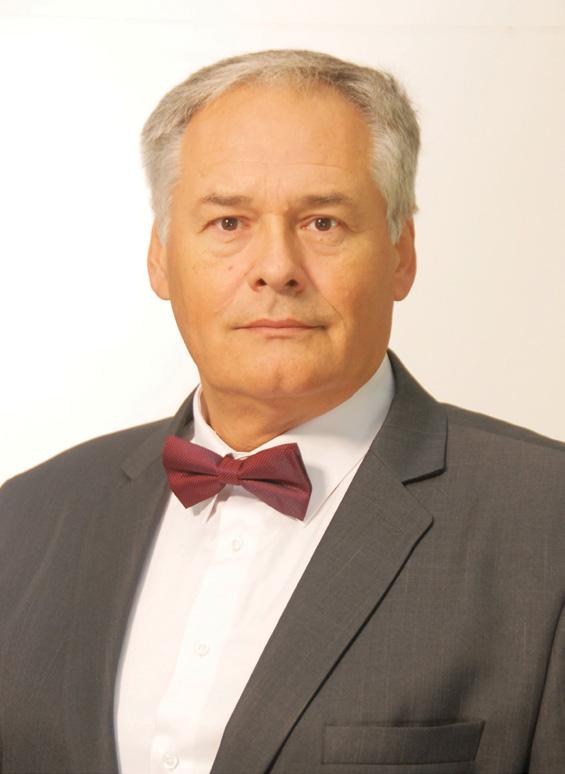
tention at the borders and an unorgan ized business environment are the big gest problems for the quality of service and traffic safety. Serbia lacks a National Traffic and Transport Strategy that will define systemic and strategic solutions.
We saw the problems the UK faced after Brexit when they ran out of drivers. How pronounced is this problem in Serbia?
The shortage of professional drivers is one of the biggest challenges for the transportation industry at the moment, and will continue to affect transporta tion prices in the near future. The age structure of drivers is a concern as 34% of drivers are over 55 and young drivers under 30 represent less than 10%.
Earnings of drivers in Serbia have in creased significantly and are higher than in neighboring countries, working condi tions have improved significantly, but we are far from being an attractive country for drivers from other countries. Serbia must solve its problem with very specific measures, by lowering the age limit for entering the profession in accordance with the solutions and good practice that, for example, applied in Germany, but also by better organization, efficiency and more rational use of transport resources and arrangement of the business environ ment, while lowering costs, taxes and lev ies for public road transport.
What is the real reason for the driv er shortage?
For years, the production of new pro fessional drivers in road transport has
been decreasing. With the abolition of regular military service, the Serbian Army no longer trains drivers; since 2009, the age limit for entering the profession has been raised, so now in Serbia you can only take the bus driver test at the age of 24; the adoption of the law on the working hours of vehicle crews limited the engage ment of drivers, so since then more driv ers are needed to perform the same job; significant departure for better earnings of drivers to EU countries and finally, with the implementation of CPC (Professional Competence) for drivers, initial training is expensive and high costs of periodic training for professional drivers have been introduced every year. At the same time, there is an obvious demographic problem, the reduction of the working-age popula tion, and not enough drivers are being trained through high schools, which are needed by the Serbian economy, and the problems are growing every day.
The fact is that the economic growth in Serbia is obvious, new production capacities are being opened, Serbia is be ing built, unemployment is decreasing and demands for transport are increas ing significantly. Regional cooperation processes, the Open Balkans, as well as encouraging economic cooperation with the EU and other countries in the world, is a significant factor in encouraging the flow of goods and mobility of the popula tion, and thus increasing the demand for transport services.
At the same time, we are witnessing various processes and circumstances in Europe and the world, in countries that have a higher standard of living and
We spoke with Goran Aleksic, gen eral director of the road traffic business association „Srbi jatransport“, about many challenges that harm industry and economy worldwide and reflected on Serbia.
goran alEkSić
The cost of transportation is evident and is paid by the consumer through the price of the product or service.
CO rp O r ATE 28 www.diplomacyandcommerce.rs Read This on Web
where the lack of qualified labor is a prob lem. This leads to significant processes of labor migration, including the departure of workers from Serbia. The earnings of employed professional drivers have in creased significantly in previous years, even above the business opportunities of employers, but Serbia must certainly find other, own solutions that must provide this very important business resource for the functional sustainability of transport in the interest of its own economy and citizens as service users.
Does this problem affect traffic safe ty since due to lack of manpower we have professional bus and truck drivers who are now working and should have retired?
In Serbia, about 170.000 professional drivers are registered with the traffic safety agency, but a significant number of them do not work as drivers or have gone to work in EU countries, America or Canada. Estimates are that our economy lacks about 12.000 drivers, which is slightly less than 10% of drivers perma nently engaged at work.

This is an extremely large amount for our economy, which has led to a signifi cant drop in the supply of quality labor, intensive turnover of workers, lowering the quality of service, and which further cause an increase in the operating costs of carriers and greater risks for traffic safety. In order for employers to over come, for them, a huge problem, they hire pensioners and tolerate the mistakes of employed drivers, increase wages and thus, now, for the relatively low quality of the workforce, high wages are paid, which are more than a significant num ber of highly educated educational and medical workers in Serbia.
The technology of providing goods and passenger transport services in pub lic road transport is not possible without professional drivers, as an important and now irreplaceable resource of the transport economy. The Government of the Republic of Serbia must adopt urgent concrete plans, adopt strategic systemic measures and undertake activities in or der to ensure more favorable conditions for access to the profession and educa tion, thereby improving the quantity and quality of production and labor supply of professional drivers on the market.
How do you explain the situation that professional drivers today have a higher salary than university pro fessors and doctors, and yet even that is not enough for them to stay in Serbia and go abroad?
Countries with developed economies have greater capacity to attract the miss ing labor force, especially professional drivers in road transport as a priority professional resource for society, so the borders are open and the selection criteria for professional labor needed
by the economies of these countries are lowered. There are organized campaigns, young people are recommended to engage in these jobs, various incentive activities are undertaken, such as mini mum wage limit measures. Thus, the Government of the Republic of Germany made a decision that from October 2022 the minimum wage for all professional drivers working in Germany is 12 euros and it applies to German companies but also to all foreign carriers who drive on the territory of Germany.
Bearing in mind that the EU countries have a significantly greater capacity to attract workers, our country must create and combine various solutions in its own interest, which mainly rely on regional connections, own resources and poten tials, along with arrangements for a busi ness environment that encourages eco nomically sustainable public transport.
Given the rising inflation and the en ergy crisis, can we expect an in crease in transport prices? How much does the price of passenger and goods transportation affect the growth of prices of goods and ser vices?
The crisis and disruptions in the world economy have started since 2008. Since then, there have been successive events that deepen this kind of crisis (wars, droughts, pandemics, migra tions...). We must not lose sight of the position of Serbia and what kind of processes the society and the economy went through for 2 decades before 2008 (hyperinflation, rations, restructuring,
bombing, privatization...). At the same time, Serbia is in the constant center of attention and attempts to influence various countries and economies, but de spite everything, in the last 10 years, the constant growth of the economy, the rise of social standards and the improvement of the quality of life of citizens have been evident.
The current inflation in Europe and the processes that have caused disrup tions in the economies, including the lack of gas and energy products, have led to an increase in the prices of gas and Eu rodiesel fuel in Europe and thus in Ser bia. Rising energy prices and rising inter est rates, on the one hand, the growth of industrial production and the construc tion industry, which boosts the volume of requests for transport services, on the other hand, along with the intensive growth of professional drivers‘ wages, have led to disruptions in the structure of business costs, disruptions in cash flows and uncertain operations of carriers.
Transport has a large and multiple functional and economic impact on the price of products. The cost of transporta tion is evident and is paid by the con sumer through the price of the product or service. European economies pay spe cial attention to public transport through a defined lower level of excise duties and taxes for Eurodiesel, by suppressing the gray economy and unfair competition, by subsidizing the business of especially bus carriers and creating a competitive business environment in the interest of their economies and the roots of trans port services.
The technology of providing goods and passenger transport services in public road transport is not possible without professional drivers
Photo: shutterstock
29
SIX Tr IpS ArOUNd ThE wOr Ld
The “Cycling around the World” campaign organised by inter national transport and logistics company Gebrüder Weiss ended as a resounding success. For six months, cyclists around the world hopped on their bikes and used a cycling app to re cord and add up the distances covered. The original goal was to circle the globe once, i.e., to cover a distance of around 40,075 kilometres. The result: participating cyclists substantially exceeded expectations by completing a total distance of 247,000 kilometres, more than six times the length of the equator.
“We would like to thank each cyclist for supporting our campaign. Our aim was to set an example of sustainable mobility. “Cycling around the World” will see a comeback next spring,” says Frank Haas, Head of Corporate Brand Strategy & Communications at Gebrüder Weiss.
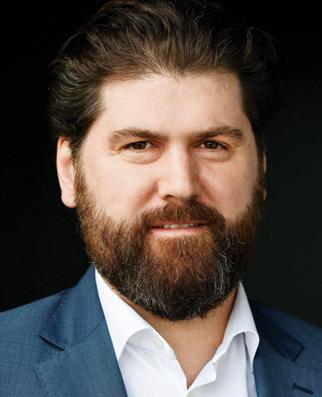
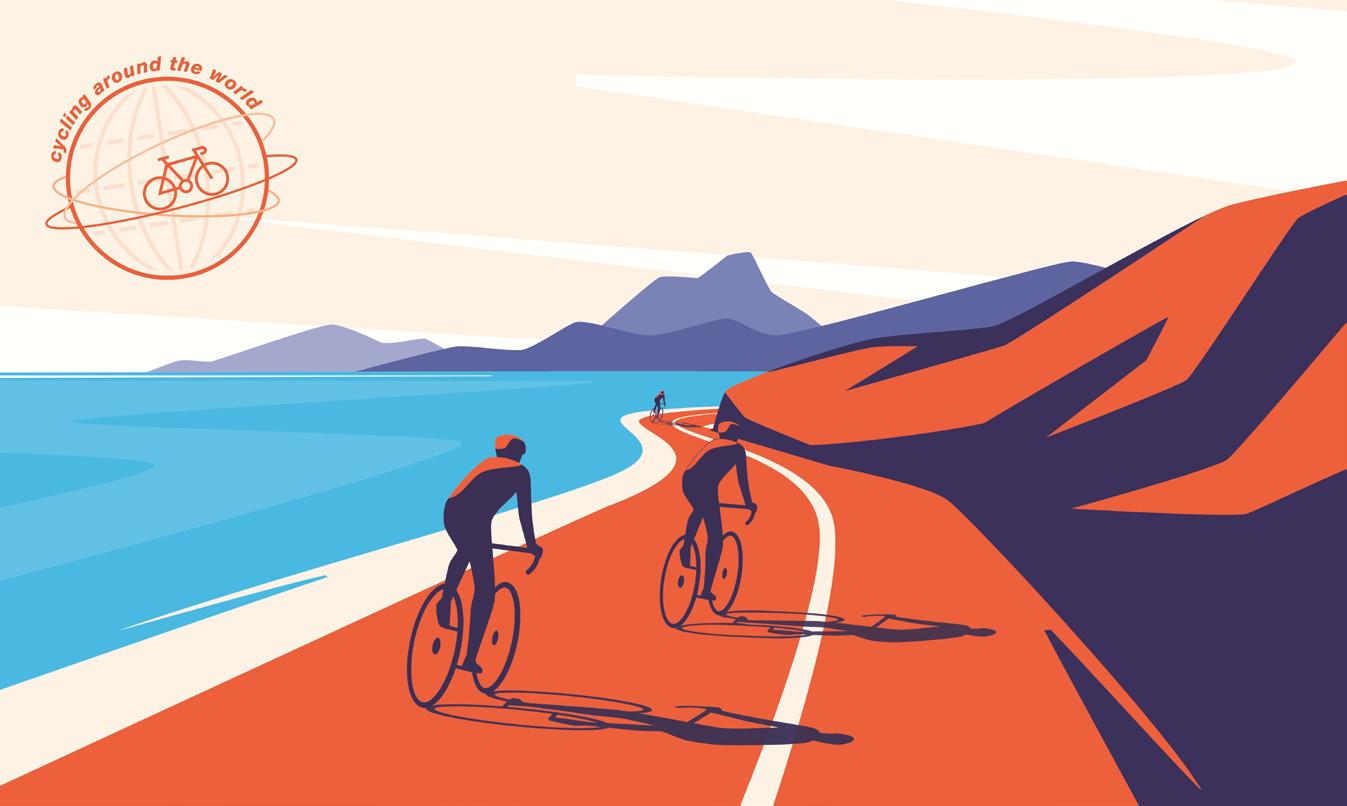
The immense success of the campaign is also beneficial for the refor estation project supported by Gebrüder Weiss in cooperation with sus tainability partner natureOffice in West Africa. The logistics company financed planting one tree for every 40 kilometres cycled. Thanks to the cyclists’ efforts, the corporate forest in Sokpokopé, Togo, now comprises 5,000 trees and has reached its maximum capacity. The company also donated 20 bicycles to local school children, enabling them to reach a secondary school in Kpalimé every day which would otherwise have been difficult due to the lack of transportation infrastructure.
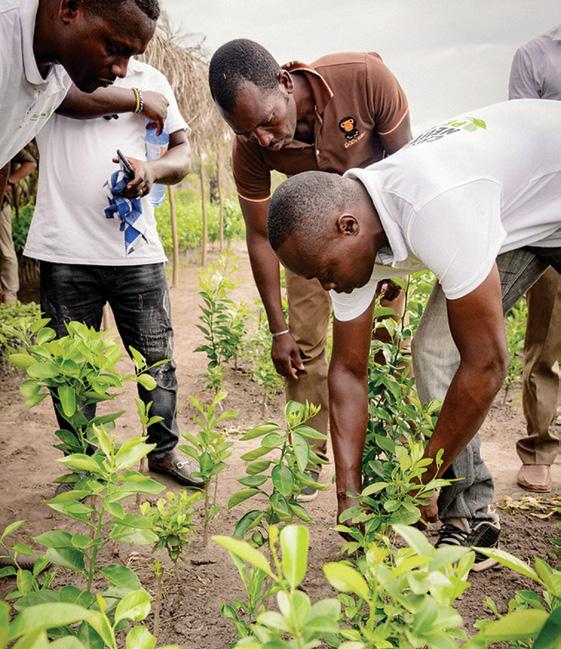
CO rp O r ATE
gEBrÜdEr wEiSS international bicycle campaign
Our aim was to set an example of sustainable mobility.
30 www.diplomacyandcommerce.rs
international cycling campaign finishes with 247,000 kilometres covered and 5,000 trees planted in corporate forest Read This on Web

www.gw-world.com/mygw The new customer portal One user account for everything –clearly structured and easy to customize.
The common transport policy is one of the key pillars of the Euro pean Union’s economic policy, as a referential example of a regulated mar ket, state measures and, finally, the val ues towards which Serbia strives. One such relevant EU policy has been imple mented within the framework of “Coun cil Directive 2003/96/EC of 27 October 2003 restructuring the Community framework for the taxation of energy products and electricity”. The directive aligns the amount of state taxes on en ergy products in regard to the competi tiveness of EU economies and products and regulates the possibility of a special incentive for public transport through an additional reduction of excise duty only for companies whose core business ac tivity is transport.
Through its fiscal policy, the state of Serbia has the autonomous right to de fine the amount of excise duty for certain motor fuels, but also to enable a certain rebate of excise duty for fuel used for commercial purposes. What Serbia is not but should be doing is incentivizing only public transport, through an additional reduction in the excise duties on Euro diesel, more precisely, an increase in the refraction of the paid excise duty only for public transport (and not for all transport purposes). This possibility for Serbia ex ists in the Directive’s preamble, which states “the Member States may differenti ate between commercial (public trans port) and non-commercial use of gas oil”.
The previous position stated in the Directive is fully in line with one of the main postulates of the common EU transport policy - favouring public trans
ENCOUr AGING T hE COmpETITIVENESS OF pUbLIC T r ANSpOrT IN SErbIA
s erbia is now a completely different country in terms of traffic and logistics, and it uses the advantages of being like „a house in the middle of the road” much more, as the great Jovan Cvijić used to say.
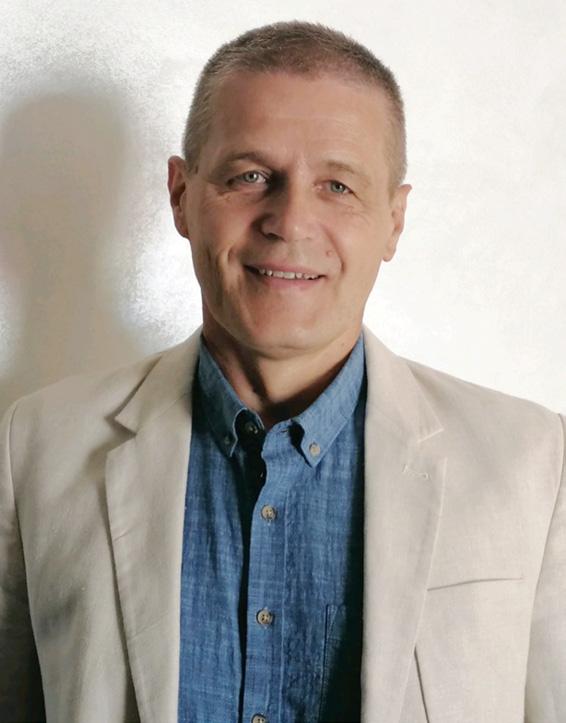
port (performed by specialized transport companies) in all aspects and types of transport in relation to own transport of passengers and goods. In economic the ory and especially in European practice, the main advantages of public transport are well-known and proven, both in the transportation of passengers and in the transportation of goods and in regard to individual (private) transport:
• Public transport is always more eco nomical and it is of a larger volume, therefore there is a faster decrease in fixed and total costs in transport that are inherent in this activity, which is the basis for reducing the selling price of transport;
• Public transport differs in everything from own transport, in terms of or ganization, cost structure, the public service obligation it fulfils, etc.;
• When production and commerce companies, as well as companies from any other economic branches, use public transport that creates an opportunity for these companies to spend the funds they would other wise use for transport capacities on developing their own business;
• As a rule, public transport implies working in a regulated (“white”) fis cal zone, thus reducing the possibil ity of operations in the “shadow”, especially with stronger inspection services and wider fiscalization of its activity. Curbing the irregular (“shadow”) segment in the transport business can have a big impact on the country’s shadow economy.
• Only investments in public transport capacities can solve severe conges
tion on main transport corridors and motorways, especially in large cities; All the intentions of the EU’s common infrastructural transport policy, from increased investments in new road trans port (in the less developed countries in Europe), through significant investments in the revitalization of the existing net work and the construction of new highspeed railways, go in the direction of fa vouring public transport, which is more massive, more profitable, more special ized, and in a word, the bloodstream of every economy and society.
It is commendable that the Serbian authorities have noticed this in the past ten years, with so many traffic infrastruc ture projects completed and many are nearing completion and/or just starting. However, one thing is clear - Serbia is now a completely different country in terms of traffic and logistics and uses the advantages of being like „a house in the middle of the road” much more, as the great Jovan Cvijić used to say. Substan tially increased transit traffic on the main road corridors validates this claim.
Scientific and various other empirical research has repeatedly demonstrated that the development of multimodal transport infrastructure is extremely important for the advancement, develop ment and competitiveness of the econo my and implies a better quality of life for citizens. New and revitalized roads and railways and other transport infrastruc ture are the basis for boosting the volume of traffic flows, but also attracting new (especially foreign direct) investments.
In terms of European experiences relating to favouring public transport
what Serbia is not but should be doing is incentivizing only public transport, through an additional reduction in the excise duties on Euro diesel.
profESSor SloBodan aćimoVić PhD, University of Belgrade’s Faculty of Economics
32 www.diplomacyandcommerce.rs CORPORATE Read This on Web
and the intention to reduce the share of transport for own needs in the total vol ume of traffic in each EU country, then the direction of the need to increase the competitiveness of public transport in various segments should be clear too, that is, to discourage individual (private) transport in the Republic Serbia.
One of the measures related to this can be implemented in the segment of additional excise duty refraction for fuel for public transporters. Business experi ence shows that companies opt for their own fleet only when they want to main tain a high level of customer service or if they have large volumes of transport for their own needs (e.g. certain large retail chains). Every different situation stimu lates the engagement of public transport companies. We can conclude from all of this that a very important aspect of pre ferring public transport can be done via the reduction of the inputs that go into its production, more precisely, the addi tional reduction of excise duties on Euro diesel for public transport. At the same time, all companies that do their own transport would be stimulated to consid er whether such a transport mode is still profitable for them or whether it is better to hire public transport companies.
Although we live in a time of con stantly growing fuel prices (due to inter national instability) and state control of the final fuel prices, primarily through the reduction of excise duties, we believe that such a situation will end sooner or later, but that one measure – that is an additional reduction of the excise duty on diesel only for public transportersshould always be in force.
Overall, favouring public transport through the additional refraction of paid excise duty is a good measure that can bring the following benefits for Serbia:
• Favouring the public transport model as a priority transport policy, because this model of carrying out transport activities, according to the economic logic of things, is more efficient and thus more ac ceptable for the economy that uses it. This would reduce the share of individual (private) transport, which by nature is less competi tive, consumes more energy, creates more traffic jams, noise, etc. This is not only business efficient and rational (at the level of a specific company or individual), but it can also have strong macro-ecological effects, bearing in mind that accord ing to research, public transport is
a significantly smaller consumer of energy per unit of transport (1ntkm or 1npkm) in relation to transporta tion for personal needs (in all types of traffic, especially road traffic);
• Faster alignment of our excise pol icy on Euro diesel with the relevant EU policy, that is, the specific EU Di rective, while using the possibility of clearly differentiating commer cial (public) from non-commercial (individual) transport. In this way, we would be able to redefine the do mestic fuel excise duty policy much better and be better prepared for negotiations with the EU;
• Increasing legality in the transport sector improves business competi tiveness, which is especially impor tant for road transport. It can also generate additional revenue for the state budget.
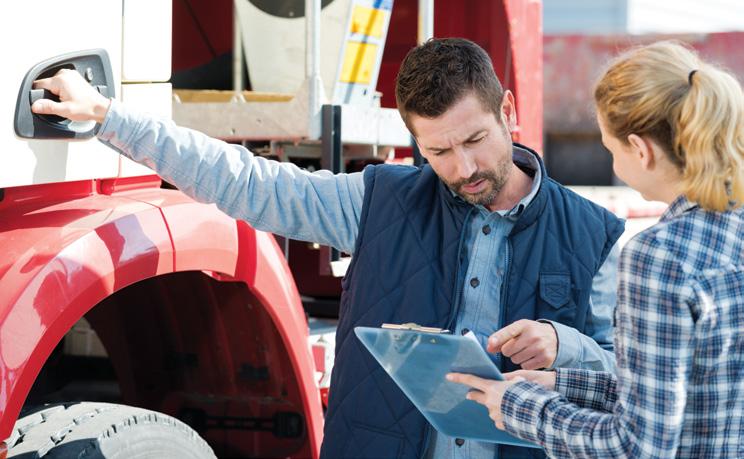

An additional reduction of the excise duty on diesel only for public transporters should always be in force.
Photo: shutterstock Photo: shutterstock 33
ThE FUTUr E LIES IN mOdEr N TEChNOLOGy
one of our priorities in the coming period will also be digital transformation and joining the global digital supply Chain.
EricH coSSutta President of Dragon Maritime Group
i
n accordance with economic trends and changes in the busi ness climate, our company start ed a serious process of diversification of operations, Erich Cossutta, President of Dragon Maritime Group, says for Diplomacy&Commerce. Our goal is to be able to offer a one-stop shop to our cli ents, Cossutta says.
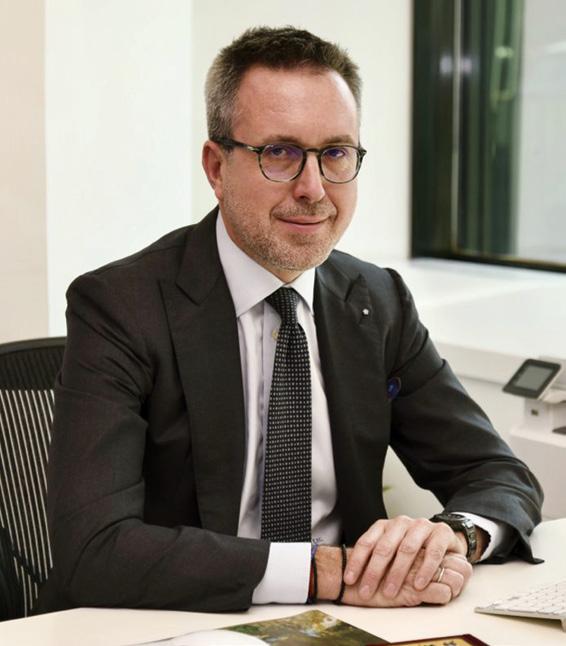
As the president of a company that operates in several countries of the region, how do you see the business climate in the region?
If we look at the real indicators, the region has achieved positive economic growth in recent years despite the global crisis. We also feel a positive trend in the normalization of relations, and we are especially pleased that the southern part of the Region has started to think unanimously. We still have a long way to go, but a positive outcome is very certain through regional economic integration and a common business approach. This is exactly why the Open Balkan initiative is important, since it aims to unify the region and integrate it into the single European market. This initiative means the removal of many barriers that signifi cantly slowed down and anesthetized the Balkans region.
How much do the new business cir cumstances – after the pandemic, the war in Ukraine, inflation and in stability, affect your business opera tions? What do the numbers say?
The recession caused by the pandem ic, and the consequences of the conflict in Ukraine are reflected in all national economies. The logistics sector itself faced many challenges, and all the weak nesses of global supply chains came to the fore. During 2021, the demand was at
its peak, but on the other hand, the lack of operation and congestion in the ports could not keep up with it. This caused a classic imbalance of supply and demand and led to a skyrocketing of freight rates, which rose up to 800% compared to the pre-pandemic period. At the same time, the allocation on ships was extremely limited, while transit times were much longer than usual. Today, the situation is drastically different, the high rate of inflation, geopolitical conflicts, the en ergy crisis and the pandemic have led to a drop in demand, and therefore a sharp drop in freight rates, and it is uncertain how long this trend will continue.
You do business in Slovenia, Croatia, Bosnia and Herzegovina and Ser bia. How much doing business dif fers considering the fact that two of these are EU member states and two are not?
There is no doubt that the differences exist. Slovenia and Croatia are part of a single EU market where the free move ment of goods and services is ensured, thereby saving time and reducing the costs of administrative procedures for forwarding and customs clearance. How ever, we have no major difficulties with doing business in Serbia and Bosnia and Herzegovina. Both countries are signato ries to numerous agreements and initia tives - free trade agreements, they are part of the SEED project, the Green Corridors initiative, the Open Balkans initiative. EU membership will certainly make doing business in Serbia and BiH even easier.
What are the idiosyncrasies of the Serbian market?
Serbia is a part of Europe and as such, is an almost exclusive link between the world’s most important markets, such
as the European Union on the one hand, and the Mediterranean and Asia on the other. Serbia’s geography facilitates lo gistical connections which is one of its special and crucial advantages in the modern world.
By joining the global digital “Supply Chain”, Serbia becomes a valid link in that chain and a place where the same standards apply as in the rest of the chain.
Through this global digital supply chain, Serbia really has an opportu nity to use all its potential, first of all geographical, but also production, logistics, intellectual, agricultural and all the others at its disposal. To quote Marshall:”Technology brings ways to bypass obstacles, that is, to pass through them”, including, for instance, bottle necks created by outdated customs pro cedures.
The logistics industry already has a large share in Serbia’s economy because, by its nature, it had to recognize Serbia’s advantages early on, and that it did. But there is still room for great progress in the development of Serbia’s strategic ca pacities.
What is it that separates Dragon Mar itime Group from its competition?
Tradition and people. I am part of a business that has been handed down in my family for generations, and today, together with my partners who are part of the ownership structure of Dragon Maritime Group, we endeavour to cher ish the same values, which is to always put people first. Our focus is always on our employees and we can boast a very low brain drain. Although tradition is very important to us, as a company we are always focused on the future and in novation.
Our focus is always on our employees and we can boast a very low brain drain
34 www.diplomacyandcommerce.rs CORPORATE Read This on Web





The World Cargo Symposium (WCS) is the largest and most pres tigious annual event regarding car go air transport. The 2022 edition brought 1400 delegates to London, Eng land, from 27 to 29 September 2022.
In his keynote speech at the World Cargo Symposium in London, Brendan Sullivan, IATA’s Global Head of Cargo, high lighted four priorities to build resilience and strengthen air cargo’s post-pandemic prospects.
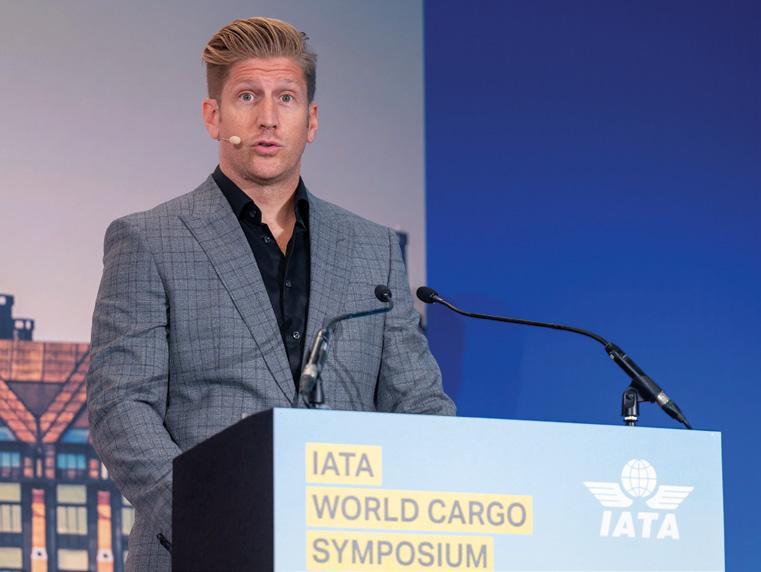
He stressed achieving net zero carbon emissions by 2050, modernising processes, finding better solutions to safely carry lithium batteries and making air cargo at tractive to new talent.
“Air cargo had a stellar year in 2021, achieving $204 billion in revenues,” said Sullivan. “At present, however, social and economic challenges are mounting. The war in Ukraine has disrupted supply chains; jet fuel prices are high and eco nomic volatility has slowed GDP growth. Despite this, there are positive develop ments. E-commerce continues to grow, COVID restrictions are easing, and highvalue specialised cargo products are prov ing resistant to economic ups and downs. In the future, achieving our net zero com mitment, modernising processes, finding better solutions to carry lithium batteries safely, and making air cargo attractive to new talent are critical.”
the road to net zero
In 2021, the aviation industry agreed on a balanced plan to achieve net zero CO2 emissions by 2050 through Sustainable Aviation Fuel (SAF), hydrogen and electric propulsion, more efficient operations and offsets, and eventually through carbon capture, an out-of-sector solution while technology develops.
“SAF is the key to achieving net zero emissions,” Sullivan noted. “Airlines used every drop that was available in 2021. And it will be the same this year. The challenge
is SAF production capacity. The solution is government incentives. We could see 30 billion litres of SAF with the right incen tives by 2030. That would be a tipping point by 2030 toward our net zero ambition of ample SAF quantities at affordable prices.”
modernISatIon and effIc Iency
“The challenges of the COVID crisis gave us confidence that we can change and adapt fast. We need to use that confidence to get even closer to our customers’ expec tations for modernisation. And we need to be true to air cargo’s unique selling point and move even faster,” said Sullivan.
IATA’s ONE Record allows everyone across the industry’s value chain to see the same shipment information. Already, 156 companies and four customs authorities are using it. Also, IATA Interactive Cargo Guidance provides a common framework so that tracking devices can monitor the quality and accuracy of conditions of time and temperature-sensitive goods.
Government support for the modernisa tion agenda through facilitating trade is also critical.
“The Revised Kyoto Convention, which brings standardisation, technology, pre dictability, and speed to trade facilitation and the World Customs Organization (WCO) SAFE Framework of standards to facilitate and secure trade are major steps forward in supporting global trade,” said Sullivan.
Safety Safety, specifically finding better solu tions to safely carry lithium batteries, was highlighted as a priority for the industry.
“We can be proud of the progress we are making to further improve the safe han dling of lithium batteries,” said Sullivan.
“For air cargo, this is a top priority. But even the best regulatory structure means nothing if the rules are not followed.
Compliance is an issue with the transport of lithium batteries, particularly with the
A Ir CA rGO pr IOr ITIES FOr SUSTAINA bLE GrOw Th
IATA highlighted four priorities to build resilience and strengthen air cargo’s post-pandemic prospects
proliferation of new—and inexperienced— entrants in e-commerce activities.”
IATA called for regulatory authorities (EASA and FAA) to accelerate the develop ment of a test standard that can be used to demonstrate that fire containment pallet covers and fire-resistant containers are capable of withstanding a fire involving lithium batteries.
To embed best practices on the safe car riage of lithium batteries across the value chain, IATA has expanded its CEIV Lithium Battery program to include airlines and shippers.

people
“People are the core of any improvement in what air cargo can deliver,” Sullivan suggested. “Sadly, we saw thousands of jobs leave the industry during COVID-19, especially cargo handlers. We are now com peting for talent in a very tight job market. And when we do find the right and willing talent, training and longer-than-usual se curity clearance processes delay their entry into the workforce.”
IATA is calling for governments to accel erate clearance processes, including those for security, as a short-term solution and long-term to do a better job of attracting, onboarding, and retaining talent.
Safety, specifically finding better solutions to safely carry lithium batteries, was highlighted as a priority for the industry.
Photo: Courtesy of IATA 36 www.diplomacyandcommerce.rs CORPORATE source: iaTa press release Read This on Web
aThenian Democracy
athenian democracy developed around the 6th century bC in the Greek citystate (known as a polis) of athens, comprising the city of athens and the surrounding territory of attica.
heLLenic repubLic
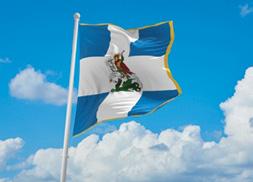
Greek People call their country different from the rest of the world. if you think that Greece is the official name of the country, you’ll be wrong. it is the hellenic Republic, or hellada, as Greeks usually say.

FOCUS ON
name Day (imenDan)
similar to serbian slava, Greeks celebrate many saints like their name days. if someone has the same name as a saint, then their day will have a big celebration, even bigger than their birthday.

The yo-yo is maDe in greece
The Greeks invented the yoyo despite many believing it was invented in China. actually, the first mention of the yo-yo was in Greece in 500 bC.


The eviL eye supersTiTion
since ancient years, Greek people have believed that a person can harm other people by sending off negative energy. This is why they wear an evil eye, a very popular piece of jewellery and souvenir, which is believed that can save someone from bad luck.

Greece d I p LO m AC y & CO mm E r CE pr ESENTS
An Excellent and long-standing bilateral relations
Greece’s stance on Kosovo is well-known and remains unchanged.
I NTE rVIE w
We talked to H.E. Yorgos Diacofota kis, Ambassador of Greece to Serbia, about the Open Balkans initiative and Greek-Serbian coopera tion based on the 2019 Declaration of Strategic Partnership signed by the two countries.
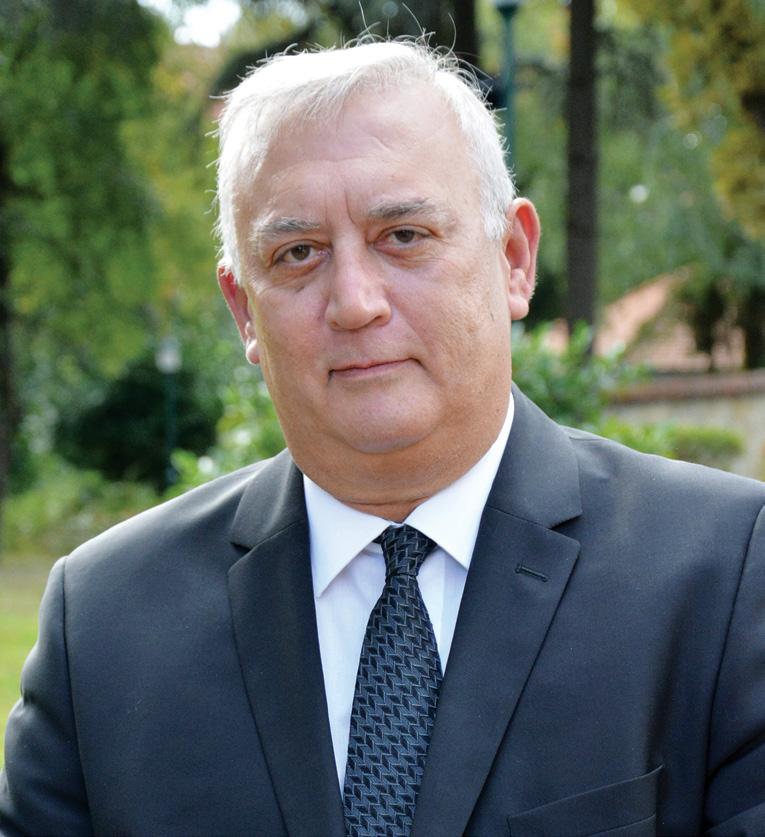
The Open Balkans initiative brings together countries in the region so that Greece will be invited to next year’s summit in Tirana. What is your view on this initiative, and how do you see its future?
The Open Balkans is an important initiative because it has regional owner ship. It can improve mobility, trade and
cooperation among the countries of the region. It is important that it remain in line with the EU acquis.
Is the Open Balkans initiative a con solation prize for countries still far from full EU membership?
I believe that it is wrong to talk about a consolation prize or even a substitute for full EU membership. There is no substi tute for EU membership.
Initiatives such as the Open Balkans reflect a regional ownership and bring closer the countries involved. We expect that their fruitful cooperation be in line with the EU acquis and further pave the way to EU membership.
What is Greece’s official position re garding the European integration of Serbia and the countries of the Western Balkans?
Since the Thessaloniki Agenda (2003), Greece has been a staunch supporter of Southern Europe’s EU aspirations. As the oldest member of NATO and the EU in the region, Greece has invested a lot of effort to bring its neighbours closer to Europe and its values. Greece has led initiatives to advance regional cooperation and promote connectivity and synergies among the countries of the region.
Take as a recent example our initia tive to provide energy security to the
Greece is one of the first and big investors in Serbia, and one important trade partner of Serbia.
H.E. YorgoS diacofotakiS Ambassador of Greece to Serbia
38 www.diplomacyandcommerce.rs G r EECE by Dragan nikolić
Balkans and beyond through the port of Alexandroupolis. We believe in and firmly support the European perspec tive of all Western Balkan countries.
As the first Balkan country to join the EU and benefit from its European integration, Greece is constantly trying to assist its neighbouring countries in following this same path and is con tinuously working on ensuring that the Western Balkans remain at the top of the EU agenda. We want to welcome Serbia, as well as the other countries of the region, as members of the Euro pean family. Reforms and patience are needed in order to reach the EU acquis. However, based on our own experi ence, I must say that these long-term efforts are worthy, as they can ensure stability, prosperity and security for Serbia and the entire region.
You recently stated that Greece is not changing its position on Koso vo and that there is no pressure on your country to recognise Kosovo. Why do you think Serbia is afraid that Greece might still recognise Kosovo? How do you see the solu tion to the Kosovo dispute?
I think that the first part of your question should be addressed to oth ers, not me.
Greece’s stance on Kosovo is well known and remains unchanged. We firmly believe that issues of this nature must be resolved through dialogue, with mutually accepted solutions.
Greece fully supports the EUfacilitated dialogue between Belgrade and Pristina. Together with the other EU Member States, we fully support the effort undertaken by Mr. M. Lajcak and commend his valuable work. We are looking forward to a comprehen sive agreement between Belgrade and Pristina, as provided for by the EU Council Conclusions, in line with the EU acquis.
How much did the crash of a Ukrainian plane with Serbian weapons near Kavala in Greece threaten the otherwise excellent
relations between the two coun tries? What was the biggest prob lem for Greece in this incident and how was it resolved with the Serbi an side?
Regarding this tragic accident, which occurred last July and claimed the lives of the crew, it is needless to point out that the crash could have taken place in nearby villages and in habited areas. It is a miracle that this did not happen. Since the aircraft took off from Serbia and its dangerous cargo was loaded in Serbia, we consider that the Serbian authorities should have in formed in advance Greece’s competent authorities, in accordance with the international regulations in force. We requested information and clarifica tions from the Serbian side. The whole matter was dealt in good faith between the two Governments.
How do you see the future of Serbi an-Greek cooperation on the politi cal, economic and cultural levels?

The Joint Declaration on the Strate gic Partnership between our countries, which was signed in Athens in Decem ber 2019 outlines our bilateral coopera tion in various fields and is solid proof of our excellent, long-standing bilat eral relations. Within this framework, we are determined to enhance our cooperation.
We also pay special attention to the exchange of high-level visits and try to expand our cooperation through re gional multilateral, trilateral and quad rilateral formats.
What is the economic coopera tion between Serbia and Greece to day, considering the pandemic, the Ukrainian crisis, sanctions against Russia and the impending energy crisis? Where are our two countries in all this? Greece is one of the larg est and most important investors in Serbia. Are you satisfied with the scope of economic cooperation, and where do you see opportunities for improvement?
As you mentioned, Greece is one of the first and big investors in Serbia, and one important trade partner of Serbia. Of course, there is plenty of room for our bilateral cooperation to be strengthened and expanded.
Over the past two decades, the Greek private sector has invested ap proximately 2.5 billion Euros and cre ated around 25.000 jobs. Serbia is an important business partner and many Greek companies are active in various fields of the Serbian economy, such as construction, building materials, fuels, energy, food and beverage, etc.
Over the past two years, both coun tries have faced the consequences of the pandemic, and recently the Ukraine war, and its impact on the
global economy and energy market. Both countries are faced with many challenges, especially in the field of energy, the need to secure stable prices in the market. It is time now to reaf firm that Greece and Serbia are two countries that are connected not only by geography and history, culture and religion, but also by our common vi sion towards sustainable development and prosperity in our region.
Serbia has demonstrated an impres sive resilience during the pandemic, while Greece has recovered rapidly, at taining important growth rates.
In recent years the annual volume of bilateral trade amounted to 500 million euros while the exchange of services is also estimated around 500 million. I am confident that both fig ures can increase dramatically in the future. It is noteworthy that, only the first six months of 2022, bilateral trade has reached the amount of 400 million euros, according to the Hellenic Statis tical Authority’s data.
Until the end of 2022 we are ex pecting to welcome around 900,000 Serbian tourists, approaching the prepandemic levels. Serbia has also been advancing as a tourism destination for Greek people.
We are ready to support investments in your country. Areas in which we can further boost our bilateral economic cooperation and which can also reflect the future presence of Greek invest ments in Serbia are energy, transport, infrastructure, recycling, wastewater treatment, information and commu nication technologies, the IT sector, tourism, food and beverage trade, agri culture, construction, etc.
Our Prime Minister, Mr. Mitsotakis, has underlined that the modernisa tion of the Piraeus-Thessaloniki-Skop je-Belgrade railway axis is of strategic importance, as it will contribute to an improved trade and transport network and enhanced connectivity. It will also promote effectively sustainable mobility and development in South East Europe and further cooperation with Serbia and the countries of the Western Balkans, as a means of ensur ing stability and welfare in the wider region.
Greece also supports the construc tion of the Interconnection Bulgaria – Serbia, and its connection with TAP, through the Interconnector GreeceBulgaria, that will strengthen Serbia’s energy diversification. And of course, the port of Alexandroupolis, as a gateway for LNG is something that interests not only Greece, but also South Eastern Europe as a whole. Our ultimate objective is energy security, affordable prices and diversification of the energy sources, taking into ac count the new landscape after the war in Ukraine.
we believe in and firmly support the European perspective of all western balkan countries
Photo: Pixabay 39 Read This on Web
The Open balkan initiative creates opportunities for Greece
in order to create a friendly business environment, s erbia is moving forward by adopting eU standards.
Vassilis Skronias, minister counsel lor for Economic and Commercial Affairs from Greek Embassy in Bel grade, in this interview reveals to us how the Open Balkan initiative reflects on Greek and Serbian cooperation, and what are the main challenges that Greek busi ness experience in Serbia.
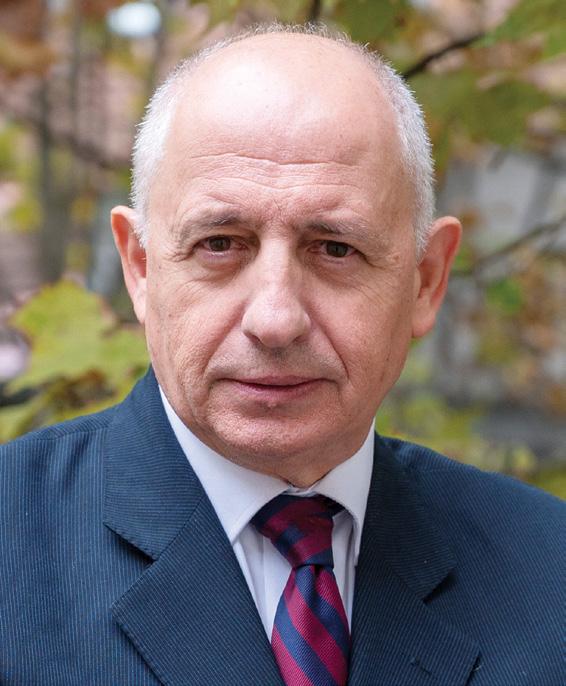
How will the Open Balkans initia tive help the development of econom ic relations in the region, and does the Greek economy see an interest in this kind of integration of its neighbour hood?
The Open Balkan Initiative managed to create synergies in the area of economic cooperation among the member coun tries- faster flow of people, goods, capital and services, growth of all economic in dicators, better and more comprehensive political cooperation, prompt resolution of all internal problems and bureaucratic obstacles.
Since the beginning, the creation of the green corridors for the transportation of foodstuff at the border crossings led to a 17 percent increase in trade in this sector.
It goes without saying that the Open Balkan Initiative is a regional project, but is not a substitute for membership in the EU; therefore, it should complement other EU initiatives. In any case, the Acquis Com munautaire should be taken into consid eration by all the countries involved in the above-mentioned initiative.
It is well known that many Greek com panies are active in Serbia, North Macedo nia and Albania, therefore facilitating trade between these countries can only have positive effects. Thus, the Open Balkan
initiative creates opportunities also for Greece, mainly in the field of transport and the expansion of networks in multiple sec tors, including multimodal transport and cost reduction of products.
Generally speaking about transport, Greece strongly supports investments and projects within the Trans-European Transport Network (TEN-T), as well as, related to the Western Balkan Countries, the interconnection of vertical axes to wards Greek strategic Ports, Highways and Railways (ie Pan-European Corridor X). We value regional cooperation with Serbia, as an effective tool for the development of the South East Europe. The development of transport networks, sustainably mobility, multi-modal infrastructure, moderniza tion of the rail connection ‘’Piraeus/Thes saloniki-Skopje-Belgrade-Budapest’’ are deemed as highly important. Especially the establishment of the Rail Freight Corridor 12 (RFC12), a main Regional Initiative, will facilitate the rail freight transport, from Pi raeus to Central and Western Europe.
Does Serbia’s non-participation in EU sanctions against Russia harm eco nomic cooperation between Greece and Serbia?
Serbia has its own specific policy re garding sanctions against Russia. Greece as a European Union member-state since the year 1981, is not used to make sugges tions to any third country on its policy choices. I believe the main issue for almost all European countries is the energy ef ficiency. Hopefully, the sound economic and business relations between Serbia and Greece will not be affected by the abovementioned issue.
I NTE rVIE w VaSSiliS SkroniaS Minister Counsellor for Economic and Commercial Affairs - Embassy of Greece in Serbia
In the EU accession process, did Serbia adopt the necessary standards for do ing business and in which areas do you think additional progress is needed?
In order to create a friendly business envi ronment, Serbia is moving forward by adopt ing EU standards through implementation of modern laws, simplification of procedures and a vast network of trade agreements.
With its skilled easily-trained workforce, the cost-effectiveness of Serbia as an investment destination is among the top appeals for expanding businesses. Thanks to govern ment reforms, it has jumped from 91st posi tion in the world to 42nd according to the last World Bank and IFC indexes, taking less than 12 days to form a new corporate entity. Duty-free exports, mainly to the EU market, composed of hundreds of million consum ers, have turned the country into a manu facturing hub for global businesses looking to expand in Eastern Europe, USA or Asia. In addition to that, it is worth saying that Serbia has managed to address the global economic recession better than most of its neighbours, highlighting the resilience of its economy.
Nevertheless, as a former ‘’socialist’’ econ omy country, there are still old practices and areas where improvement is expected, like: the effective enforcement of the new legal framework related to the free-market and fair competition rules (ie equal treatment at ten ders, intellectual property), faster operations and efficient banking rules, privatization of state owned enterprises and banks,, effective jurisdictional system, bureaucracy, anticorruption measures, energy, environment, rule of law etc. Moreover, there is a need to simplify trading across borders as it is both a costly and bureaucratic process (barriers on issuing export/import licenses, long customs
As a former ‘’socialist’’ economy country, there are still old practices and areas where improvement is expected
40 www.diplomacyandcommerce.rs G r EECE Read This on Web
clearance procedures-ie two weeks to import/ export goods because of non-tariff obstacles etc), enforce contracts and resolve insol vency, decrease the costs associated with obtaining construction permits, proceeding to the registration of property, getting credit and protecting investors etc.
Is there a joint strategy between the two countries to fight the energy crisis that inevitably awaits us during the winter?
Long time before the actual international energy crisis, Greece used to attach utmost importance in regional energy schemes, like Energy Community, CESEC or SEECP.
The Strategic Partnership between Greece and Serbia provides a solid basis for deepening our energy cooperation, diversi fy energy sources and routes, and maximize energy security for SEE countries. Thus, we actively support the Interconnector Bulgar ia Serbia (IBS) and its connection to Trans Adriatic Pipeline-TAP, through the Intercon nector Greece-Bulgaria (IGB) and the Verti cal Gas Corridor. The construction of the new Thessaloniki-Skopje pipeline, could be extended in Serbia as well. Greece remains always a strategic partner with Serbia, ready to look upon prospects on bilateral coopera tion in the electricity sector as well.
In addition to the above-mentioned pipe lines in Greece, the existing LNG Terminal in Revythoussa and the recently developed in Alexandroupolis, as well as the Underground Gas Storage in South Kavala, provide addi tional ways to further diversify natural gas energy sources.
Balkans could become an important transportation corridor for Europe’s energy supplies in the medium term. Indeed, West ern Balkans, as a new nearshoring destina tion, could strengthen EU supply chain resilience.
To survive the imminent energy crisis, Greece, among the European Union mem ber-states on one side and in cooperation with few third neighboring countries as well, tries to improve its energy coopera tion with its partners using all available ways and means. On the other side, Serbia benefits of preferential prices related to the Russian gas provisions, representing the two third of its needs. Following Prof. PhD Zorana Mihajlovic, Deputy Prime Minister and Minister of Mining and Energy, approx imately 50% of Serbia’s energy needs in oil is supplied by Russia or few other provid
ers and the 20% by domestic production; thus the Serbian market will not be affected significantly, in comparison with other countries. In addition to it, Mrs Jovanka Atanackovic, State Secretary in the Ministry of Mining and Energy, stated that Serbia will have to buy more 800 million m3 of natural gas of the international market in much higher price. But, in addition to this process, Serbia could get eventually profit as well, of the initiative ‘’REPower EU’’, aim ing to fast forward the green transition.
What is the trend of Greek investments in Serbia, and are there any Serbian in vestments in Greece?
Just after the war in the former Yugosla via, Greece has been one of the most impor tant investors (around 2,5 billion Euros). But during the Greek dept crisis, its debtors de cided the closure of most of the Greek banks abroad, reducing the level of Greek invest ments. Nowadays, approximately 250 com panies of Greek interest have invested more than 1.5 billion Euros in Serbia, employing 25,000 people. Greek owned companies in Serbia are involved in various business segments, from banking and real estate to construction of infrastructures (highways or airports), food/beverage industry and sup plying chains, trade, banking, distribution of fuel and oil, hospitality, telecommunication, transport, aluminum profile-cement-mining or sugar industries, logistics, renewable en ergy sources (R.E.S.), recycling, waste water treatment etc; we remind the last year merger of Eurobank with Direktna Bank and the acquiring of the 10,24% equity stake of the B.S.E. by the Athens Stock Exchange.
Regarding the Serbian investments in Greece, the main sectors are real estate and tourism.
During the previous years -before 2019 and after covid pandemic-, our annual bilat eral trade on goods and services surpassed the 900 million Euro. The big projects in Serbia may increase further our investments, trade and economic ties through the mod ern railways, Corridor X, highways, airports linking our cities, ports etc. Both countries should endorse policies aimed at develop ment of innovations and digital economy, especially in the fields of support to small and medium-sized enterprises, start-up com panies as well as promotions of partnerships between research centers and technological incubators.
What are the most common obstacles faced by Greek companies operating in Serbia?
The usual obstacles faced by the Greek and most of the European companies oper ating in Serbia, are the following:
• Delays due to excessive border controls, resulting in additional costs and dif ficulties when importing products to Serbia, negatively affect their competi tiveness.
• There are non-transparent procedures for the selection of the contractor for public works under design and non-
application of the EU Procurement Regulation. Despite the adoption of new legislation in line with the EU Regulations (‘’aquis’’), the country has not made significant improvements in the fight against corruption and the sanctioning of public procurement of fences etc.
• Outdated bureaucratic system regard ing import/export licenses, taxation etc, has to be reformed. Bureaucracy in Serbia leads to a dysfunctional ad ministration. For instance, a key role in this field would be to simplify and digitize the tax compliance process and strengthen tax education.
• Time-consuming legal proceedings of resolving business disputes are a well known issue.
• The modernization of the railway sec tor in Serbia represents an important challenge for the country’s freight co operation with Greece. A large number of railway lines are not used, while at the same time the speed of freight transport is far from satisfactory.
• Further simplification of the property rights registration may be considered as a critical problem. Although the pro cedure for obtaining a building permit in Serbia has been simplified, the com petent authorities should issue permits with the appropriate content. In ac cordance with the current regulations, the investor could register his property rights for newly built facilities without being exposed to additional loss of time and waste of funds, for obtaining additional, special documents.
• Unclear terms of labor law and lengthy procedure for issuing a work permit to a foreigner should be revised. Despite the benefits resulting from the latest amendments to the Law on Employ ment of Foreigners and the Law on Foreigners in Serbia, certain provisions still provide that a work permit may be issued on the basis of the foreign worker’s temporary residence permit; this aspect remains problematic.
• Because of the annual emigration of a percentage of Serbian labor forces and few other reasons, most of the compa nies have difficulties to hire enough and appropriate staff.

Some important Greek groups would have already proceeded to much higher in vestments in Serbia if the above-mentioned obstacles did not exist; because of a certain number of these obstacles, unfortunately, few other Greek firms left the country dur ing the last 20 years…
Last but not least, as Serbia has been the seventh and last assignment of my interna tional, professional career, before leaving Belgrade at the end of this year, I take the opportunity to thank “Diplomacy & Com merce” for giving me the chance to express my views, at least for twice, during my actu al mission and to wish all the best for pros perity to Serbia and its proud people.
Since the beginning, the creation of the green corridors for the transportation of foodstuff at the border crossings led to a 17 percent increase in trade in this sector.
41
Uncertainty is now the main feature of the business environment.
We have to make s erbia synonymous with a favourable state where organizations with skills and business ethics can develop their plans and flourish, creating value for the country and for the people of s erbia.
speaking with the manager of INOS Balkan, Iosif Vangelatos, we dis covered an optimistic message about our society and how we can and should cope with modern challenges and civil issues.
The war in Ukraine, sanctions against Russia, the energy crisis, and frequent shortages in supermarkets - all influ ence us to reassess our priorities on a personal level and reorganise our lives as necessary. But what is hap pening with business, with the indus try? How do turbulent times like this affect changes in goals and priorities?
At the end of 2021, and as humanity was celebrating the prevailing science over Covid-19 and the beginning of the post pandemic era within optimistic con templation of the future, there were many voices of concern, warning for the increas ing inflation rate, which could potentially undermine global economic growth.
The war in Ukraine only came to com plicate and worsen the situation. The strong dependence of the EU economy on Russian fossil energy resources and the potential disruptions in the energy supply chain have created new inflationary pres sure on the global economy.
Uncertainty is now the main feature of the business environment. Agility and adaptability is our choice in order to navi gate safely through the complexity of our times. Our response to the crisis is to create agile commercial policies, to identify and mitigate all kinds of risk and to maintain our financial liquidity. We are trying, always in close cooperation with our part ners, to resolve all disruptions in the sup ply chain, to secure the sourcing of raw ma terials for our productions units, while on the same time; we are keeping a low level of inventory, in order to anticipate the huge fluctuation on the prices of commodities.
Is turning to sustainable develop ment, circular economy, recycling, and savings a way to keep produc tion and business afloat until the
crisis passes? Can we be optimis tic and believe that some good prac tices adopted in these times of crisis will remain alive when the dangers have passed?
Being an optimist by nature, I am al ways considering that the time vector can only point towards the direction of evolu tion. Human race is facing climate change as the biggest challenge of our times. World nations have undertaken certain commitments on global level – i.e Paris agreement adopted in 2016 by 194 nations, COP26 Glascow Climate pact 2021 – and they have put in action the necessary tran sition policies.
The war in Ukraine and the corre sponding consequences on the energy sector will eventually speed up the tran sition to a sustainable business model. What was until yesterday, an environmen tal target today becomes a strategic or geo politics necessity. Some measures that EU states are currently considering – aka en ergy production from coal – are certainly temporary and short-term measure. The scope of those measures is nothing but to minimize the strong dependence of EU economy from the Russian fossil energy resources.
Moreover and on business level, we are witnessing the great impact of fossil fuels skyrocketing prices on all aspects of entrepreneurship. Scarcity of certain raw materials, as well as, supply chain increas ing costs, are underscoring the necessity for the quick transition to a circular eco nomic model.
We are witnessing how many for eign companies bring dirty technolo gies to our country. Fortunately, your company does not have such a co lonial attitude towards Serbia. How would you, as a responsible foreign investor, advise us in that field?
Most of our readers clearly understand the reference, implied by your question but I would like to take the chance and ex tend my reply a little further. In my point of view, not only reported pollution prob
ioSif VangElatoS General manager, INOS Balkan doo
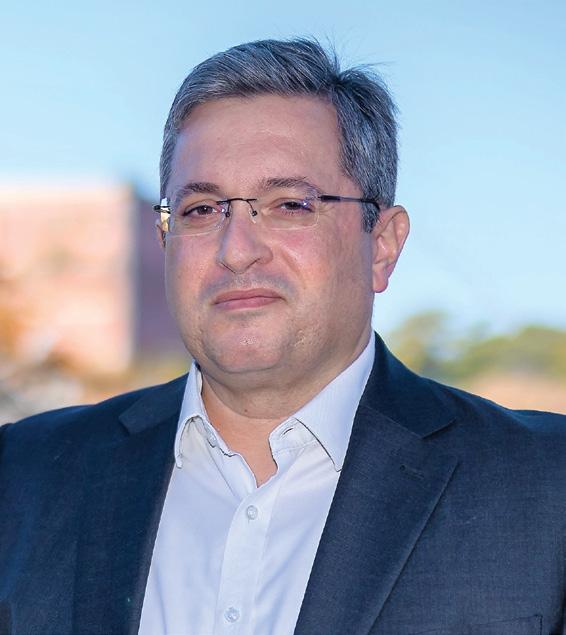
lems and not only foreign companies are creating the issue.
Serbian economy is in a great need for Direct Foreign Investment (DFI) and therefore for an appropriate business environment. The basic components of what we define as a competitive business environment are; stable macroeconomic conditions, solid regulatory and legisla tive framework, transparent public sector related processes, rule of law and secured operations of independent regulatory au thorities - competition authorities etc.
As foreign investors in Serbia for more than twenty years, we are witnessing the continuing improvement of the business environment in Serbia. The more the country is aligning with the EU acquis, the more the competition and the parameters of economic freedom are improving.
In my perspective, a foreign or a do mestic company, which is irresponsibly polluting the environment is as toxic for the country as a company, foreign or domestic, which is violating the rules of competition or the labor and the financial legislative framework. Let us not forget that in many business environment sur veys, corruption is among the most fre quent reported problems.
A few days ago, I was visiting a super market in Belgrade, when someone parked his car next to mine on a parking spot des ignated for disabled people. When I, in a polite way and with my broken Serbian, in dicated to him the yellow color on the park ing spot, he replied me with a nice smile pictured on his face; “This is Serbia…”. The meaning of this phrase we have to revisit. We have to make Serbia synonymous to a favorable state, where organizations with skills and business ethics can develop their plans and flourish, creating value for the country and for the people of Serbia.
Our respond to the crisis is to create agile commercial policies, to identify and mitigate all kinds of risk and to maintain our financial liquidity
COrp Or ATE
42 www.diplomacyandcommerce.rs G r EECE
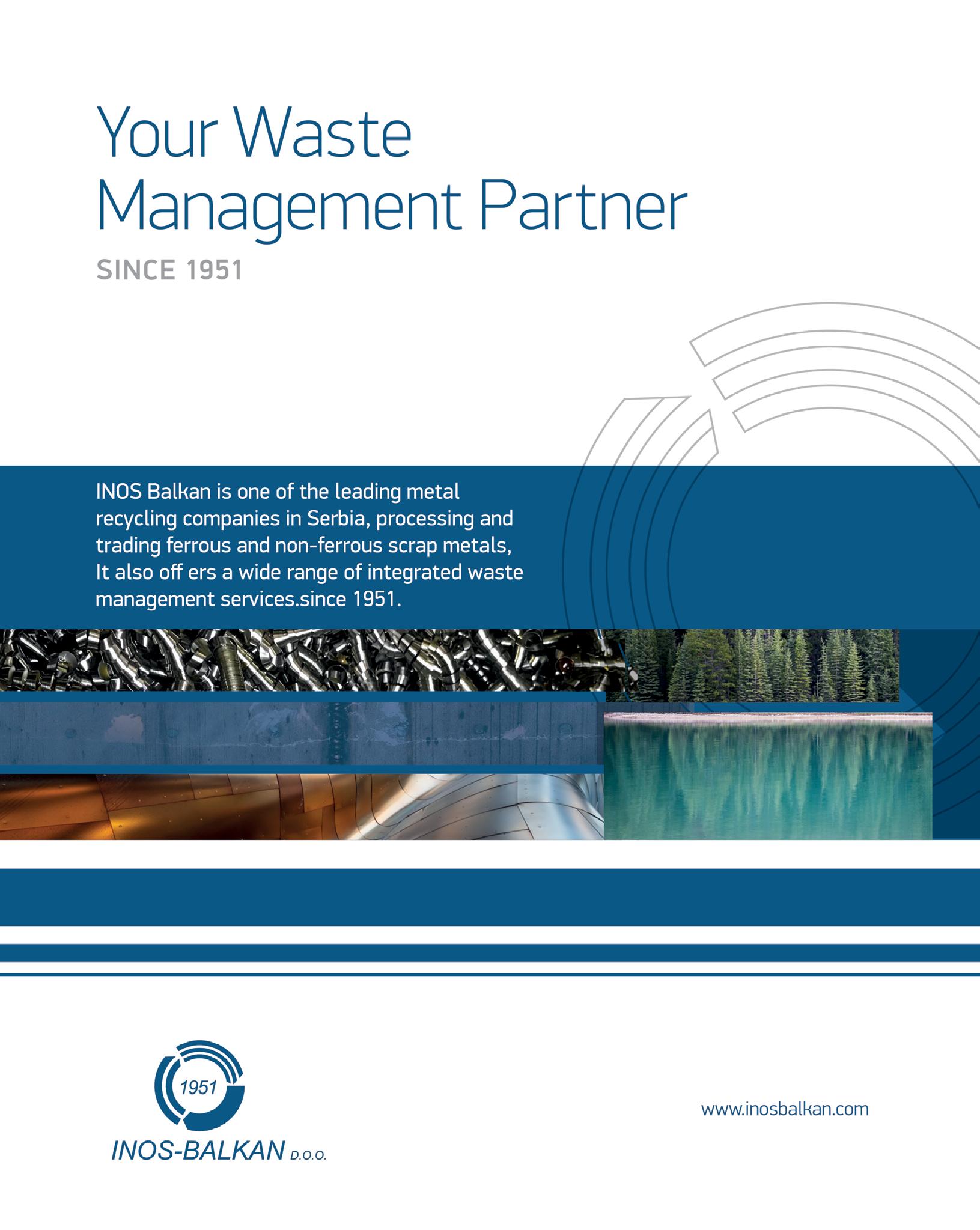
Strong economic cooperation between Serbia and Greece
Is Greece still among the biggest foreign investors in Serbia? Which of the recent investments (in 2021) would you like to single out as the most significant?
Greek companies are among the foreign investment pioneers in the country and have been present in Serbia for more than two decades. Today, Greek companies generate over one billion euros in annual turnover. Re garding new investments, in 2021, Eurobank has successfully completed the process of merger with Direktna Bank, which was one of the most important business activities of Greek companies in the previous period, as it validates the stability of the Greek banking presence in the country. Furthermore, the long-term successful cooperation and devel opment of business ties between the Athens Stock Exchange and Belgrade Stock Exchange resulted in the former buying 10.24 percent of the total number of shares of the Belgrade Stock Exchange.
W
e spoke with Nikolaos Sliousaregko, President of the management board of the Hellenic Business Association of Serbia (HBA), about Serbian-Greek cooperation in tourism, transport, energy and economy, as well as about the volume of that cooperation and plans and expectations for the near future.
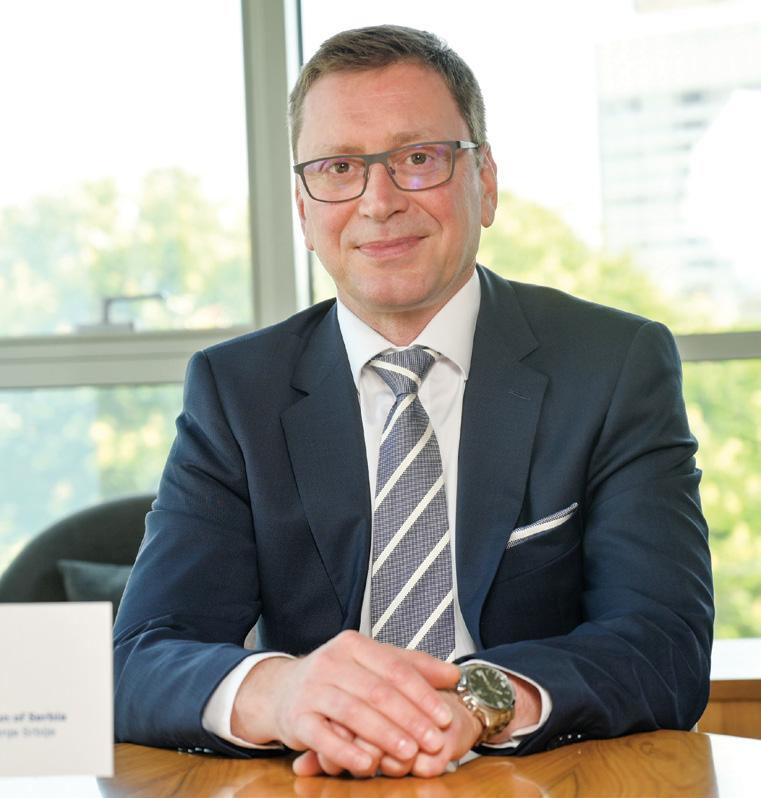
The pandemic has significantly affect ed all segments of our lives, including business relationships and results. How would you rate the current economic cooperation between Serbia and Greece in light of the pandemic?
The pandemic has had a significant impact on the economic activity of all coun tries due to reduced business revenues and demand for goods and services but has also hampered supply chains. The service sector, especially the hospitality industry, faced the
biggest challenges, both in Serbia and Greece.
The Serbian economy has reverted to the prepandemic growth level, primarily thanks to the growth of private consumption and the increase in total investments. The same can be said for Greece, which has recovered from the recession, thanks to an adaptable mon etary policy and significant support from the EU, as confirmed by the IMF’s official reports.
The value of the external trade between Serbia and Greece went up in 2021 and amounted to 636 million euros, while the highest officials of the two countries stated that this year the positive trend could result in 1 billion euros in the coming period. It is very important that Serbia and Greece continuously show their willingness to strengthen bilateral relations and improve cooperation at all levels, as evi denced by the regular visits of the top officials from the two countries.
In the coming period, the Belgrade Stock Exchange will join the trading platform which the Athens and Cyprus stock exchanges al ready use and improve liquidity and the range of services. We are particularly pleased with the construction of the Super Vero and Jumbo hypermarkets in Novi Sad, thanks to which Veropoulos is expanding its activities to other cities in Serbia. Greek companies have longterm investment plans for Serbia and have been continuously investing in the Serbian economy, as proved by the long-term suc cessful operations of numerous companies, including Autostop Interiors, Hellenic Sugar Industry, Alumil YU Industry, Kleemann, EKO Hellenic, Isomat, Titan, Eurobank Direktna, Super Vero, Viohalco Group, Lampsa Group, Daskalantonakis Group, and many others. De spite the decrease in Greek investments due to the longstanding crisis, Greek interest in investing in Serbia is still present and focuses on small and medium-sized enterprises.
How much does the current crisis in Europe, caused by the war in Ukraine, sanctions against Russia and disagree ments within the EU, affect the econ omy? What challenges do your mem bers face?
The escalation of the crisis in Ukraine, apart from its tragic consequences, is a new focal point of economic uncertainty that exacerbates inflation challenges reflected in increased energy prices and key raw materi als prices, which will certainly have negative
The service sector, especially the hospitality industry, faced the biggest challenges.
nikolaoS SliouSarEgko President of the management board of Hellenic Business Association of Serbia
I NTE rVIE w
Serbian economy has reverted to the pre-pandemic growth level, primarily thanks to the growth of private consumption and the increase in total investments.
44 www.diplomacyandcommerce.rs G r EECE Read This on Web
effect on the level of financial performance in 2022. At the same time, disagreements within the European Union related to a com mon position on the numerous challenges arising from the crisis, further complicate the already difficult circumstances in the economy. In terms of our members, Greek companies in Serbia are going through chal lenges that all the other companies in the country are facing - the crisis in Ukraine is hindering trade and logistics both from ter ritories affected by war or sanctions, but also from EU countries and China due to high transportation prices and difficult access to available roads for trading goods.
Europe is in for a very uncertain winter energy-wise. How is the Greek econo my preparing for the winter and is there a fear of stagnation in economic activi ties with Serbia and other neighbouring countries?
It is now quite certain that the energy crisis will affect the sudden increase in the prices of products and services, and will put pressure on purchasing power. At the recent ly held meeting of the EU Energy Council, we had the opportunity to hear the presentation of the Greek Minister of Environment and Energy, Mr Skrekas about Greece reduc ing the consumption of natural gas by 15% thanks to the increase in the use of renew able energy sources, as well as the fact that it doubled the production of electricity from lignite. Additionally, incentives for reduc ing electricity consumption in households by providing larger subsidies, as well as the possibility of introducing similar incentives for companies have been announced. Since the escalation of the conflict in Ukraine, the Greek economy has faced numerous chal lenges, which especially applies to large Greek companies that have suspended their economic activities in Russia.
On the other hand, in the last six months, Greek companies have managed to maintain open channels with foreign buyers and re main reliable suppliers despite the obstacles caused by the effects of the war in Ukraine, as evidenced by a recent analysis by the Panhel lenic Exporters Association and the Export Research Centre. . Based on this analysis which covers the period from January to June 2022, Greek exports increased by a total of 40 percent, while imports, in the same period, increased by 51.7%, thanks to European countries, which are traditionally the largest users of Greek products and services. Speak ing of developments in the energy sector, a new gas pipeline was completed in July this year that will deliver natural gas from Azer baijan to Bulgaria via Greece, and commercial deliveries should begin by October 1.
At the opening ceremony, the Prime Minister of Greece underlined that the inter connector provided an important boost to Europe’s common goal of achieving energy diversification, as it will transport gas from Azerbaijan through the Trans-Adriatic pipe line and from other sources via the planned liquefied natural gas terminal in Alexan droupolis, northern Greece. In particular, the
construction of an LNG terminal in the Greek port could help Serbia to diversify its energy sources, i.e. using gas from other sources.
In Serbia, the first thing that comes to mind when Greece is mentioned is sum mer vacation, and it seems that ordinary citizens do not know much about other forms of economic cooperation. Which industrial and economic branches would you like to single out in the Serbi an-Greek cooperation according to their scope and importance?
Our cooperation in tourism is certainly very well-known in Serbia, considering that over 50% of Serbian tourists spend their sum mer vacation in Greece. Specifically, in terms of the 2022, the available data indicates that 900,000 Serbs visited Greece during the sum mer. Still, there are other significant sectors of cooperation. Greek companies in Serbia are active in almost all economic sectors, especially in the hotel industry, construc tion, cement and sugar production, sector of construction material, aluminum profiles, oil trade, banking sector, food and beverage retail, service sector, etc. At the same time, in the previous period, very successful Serbian companies have managed to establish busi ness in Greece, through franchises and distri bution in the sectors like cosmetic products, sportswear and equipment and furniture.
In addition, the Declaration on the Strate gic Partnership of Serbia and Greece foresees the strengthening and establishment of co operation in the energy and mining sectors, such as the diversification of natural gas sup ply routes, connecting gas pipeline systems in Southeast Europe, the use of renewable energy sources, and linking electricity trans mission systems.
How important are the ever-improving traffic links (completion of the motor way, having more direct flights, etc.) for the economic cooperation between Ser bia and Greece?
A good transport connection between Ser bia and Greece is of strategic importance for the economic cooperation between the two countries, both for the tourism sector and trade exchange. A significant number of di rect flights from Belgrade and Niš to numer ous destinations in Greece certainly contrib ute to this, and the direct flight from Kraljevo to Thessaloniki, which was launched last year is equally important.. At the same time, we hope that flights to Greece will be established from the new airport in Kruševac as well. Furthermore, I have to mention Corridor 10 as the one of the most important pan-European transport corridors that pass through Serbia and connects it with Greece.
Finished road construction work on the section towards Greece has importantly fa cilitated the transport of people and goods, and at the same time, has the potential to attract direct foreign investments, due to a faster flow of goods and lower transport costs. The Memorandum of Understanding on the development of railway infrastructure of common interest, signed between Serbia and
Greece, contributes to potential improvement of cooperation in this type of transport. The process of modernizing the railway connec tions between the two countries is underway, while particularly significant potential is reflected in the possible development of the Belgrade-Budapest high-speed railway project into a modernized Budapest-Belgrade-Thes salonica-Athens railway project.
How important is the Thessaloniki Port and what are its advantages for the Serbian economy today?
The Thessaloniki Port and its connection with Piraeus have great importance for Serbia, both for imports and exports, but also for the operations of its river ports. The head of the Thessaloniki Port has stated that they have been actively working on upgrading the infra structure and improving railway connections with neighbouring countries, as well as on developing into a port of international impor tance capable of receiving direct calls of ships of main lines connecting South-Eastern, Central, Eastern Europe and the Balkans with the rest of the world. On August 17 of this year, the first container - block train left the terminal in Thessaloniki and arrived at the terminal in Niš on the same day.
In combination with several maritime lines, Serbia is thus connected to the Chinese, Indian, Middle Eastern, Eastern Mediter ranean, South Korean, and North American markets, while the Thessaloniki Port becomes a maritime gateway of Serbia. Plus, land ter minals will have to keep up with the Port’s development, which, in turn, creates the possibility for further improvement of infra structure in the country.
Although the age we live in is very difficult and not conducive to giving forecasts, could you tells us about the direction in which the SerbianGreek cooperation will take place the next year?
Current geopolitical events do not give us too much room for forecasts when it comes to any aspect of the economy and coopera tion, but we are certain that the economic and investment plan for the Western Balkans fa cilitates the long-term economic recovery of the region and it is based on the pillars of the green and digital transition. As such, it sup ports regional integration, creates numerous opportunities for the further development of trade relations, and at the same time, gives a geostrategic contribution to the region’s sta bility. Greece actively supports the European future of the Western Balkan countries and strives to contribute to its socio-economic development and the acceleration of the EU accession process. In this sense, and taking into account the expertise of Greek compa nies regarding renewable energy sources, there is great potential for further develop ment of cooperation in the implementation of the Green Agenda for Serbia. Specifically, cooperation in the coming period has the potential to focus on the circular economy, wastewater treatment, waste management, and construction.
Greece has reduced consumption of natural gas by 15% thanks to the increase in the use of renewable energy sources.
Greek companies are among the foreign investment pioneers in the country and have been present in Serbia for more than two decades.
45
The very good economic coopera tion between Greece and Serbia and numerous Greek invest ments in the Serbian economy would not have been possible without the strong support of the Hellenic Business Association (HBA). We spoke with the HBA director, Fanina Kovačević-Popaz, about the Association’s cooperation with public institutions and other chambers of commerce in our country.
The Hellenic Business Association in Serbia appointed a new board of directors in May. Who are the new board members and what will their business policy be in the next man date?
At this year‘s session of our General Assembly, held in May, our members elected a new Board of DirectorsNikolaos Sliousaregko (the Junior Ho tel) is the Board’s new Chairman, Vuk Dapčević (Eurobank Direktna) is the Deputy Chairman, while Vassilis Karana
sios (Coral SRB - Official Shell Licensee), Stylianos Tsoktouridis (Alumil YU In dustry) and Georgios Karafergias (Roda Točkovi) are elected as Board members. During its two-year mandate, the newly elected Board of Directors will contribute to the accomplishment of the Associa tion’s main goals relating to its visibility by the public institutions in Serbia and Greece, active representation of the Greek business community interests in Serbia, as well as to improvement of cooperation, both among members and with other local and foreign companies.
Further, the new Board of Directors initiated a series of new activities aimed at better visibility and additional promo tion of each Association member. These activities include monthly visits of Board of Directors to the Association members, events hosted by member companies, as well as interviews with members’ representatives, which are now special supplements in our Newsletter. At the same time, the Association will continue
hellenic business Association recognized as a promoter of economic development
Together with the public institutions in s erbia and other chambers of commerce, we strive to create even better conditions for the development of the s erbian economy and foreign investments.
fanina koVačEVićpopaZ Executive Director of Hellenic Business Association of Serbia

to organize activities that our members are used to, both for top management and for representatives of middle man agement. These include traditional cel ebrations, informal gatherings, sectoral workshops and seminars. As before, spe cial attention will be given to humanitar ian activities and the promotion of the Greek language and culture in Serbia.
Your Association also focuses on social and humanitarian work, as well as the promotion of Greek cul tural values in Serbia. Which relat ed activities would you like to sin gle out as the most significant in the previous period?
As pioneers among foreign investors in Serbia, Greek companies have been strongly focusing on humanitarian cam paigns and socially responsible projects for more than two decades through an active contribution to the development of local communities, environmental protection and the improvement of so
I NTE rVIE w
A predictable and stable investment environment is important in preparing realistic busi ness plans and their practical implementa tion.
46 www.diplomacyandcommerce.rs G r EECE Read This on Web
ciety in Serbia, as the host country, in its entirety. With the valuable support of our members, the Association strives to promote this kind of Greek business practice. At our traditional Christmas dinner, which is just one of the examples of such practice, we organized a humani tarian lottery to collect funds for the pur chase of necessary products for the daily life of children accommodated at the Dr. Milorad Pavlović Children’s Village in Sremska Kamenica.
Also, in cooperation with the Hellenic Foundation for Culture, and with the blessing of His Holiness the Patriarch of the Serbian Orthodox Church, Mr. Porfirije, we awarded scholarships for learning the Greek language to students of the University of Belgrade›s Orthodox Theology Faculty, who want to learn the modern Greek or to continue their stud ies in Greece. This initiative also reflects the intention of the Hellenic Business Association of Serbia to strengthen and improve the cultural and historical ties between Greece and Serbia.
HBA has been traditionally or ganizing workshops and lectures on topics that are important to busi ness people in Serbia. What are the HBA’s latest activities in this regard and how do they contribute to cre ating a more favourable business environment?

The Hellenic Business Association of Serbia organizes different events for its members in order to facilitate their networking, connection and exchange of experiences. The HBA also provides to its members the full support in commu nication with Serbian and Greek institu tions and in protection of their interests. Sectoral events that we hold, including workshops and lectures, give opportu nity to our members to do business in a predictable environment, as they inform them about current topics and at the same time represent a platform for ex changing business information. In April, in cooperation with our member compa ny V+O Communications and colleagues from the Croatian and Belgian associa tions, we organized a very successful workshop called “Digital Marketing in the Service of Your Business”. On this occasion our members had opportunity to hear more on the importance and use of the full potential of digital marketing through proven effective strategies.
During the workshop, the partici pants had a practicalassignment , as a way to practice their skills, exchange ideas with other participants and get feedback from the lecturer. Recently, and in cooperation with the Belgian-Serbian Business Association and the Croatian Business Club, we organized a workshop on inspection procedure and practical implementation of systemic legislation, titled “Rights and Obligations of Super vised Business Entities during Inspec tion Procedures”.
In recent years, Serbia has taken significant steps to build stable environment for the country’s economic development.
Do you collaborate with other busi ness associations of foreign inves tors in Serbia and if you do, what is this collaboration like? Could you tell us about your cooperation with state officials in Serbia, i.e. govern ment ministries, chambers of com merce, associations and govern ment agencies?
Our association actively cooperates with bilateral chambers in the country, since this type of synergy has proven to be a good basis for networking be tween local and foreign companies. In the previous period, we organized many joint activities, both at the interchamber level and with representatives of public institutions and ministries, which recognized the dialogue be tween the companies and the state as an important link in improving the business environment. The webinar with the National Employment Service, organized by 12 bilateral chambers of commerce, as well as the webinar with the Ministry of Mining and En ergy, organized by the French-Serbian, German-Serbian and Italian-Serbian chamber of commerce, as well as the Belgian-Serbian Business Association and our Association, are all good exam ples of this kind of cooperation.
I would especially like to single out that our Association has strengthen its cooperation with the Ministry of Economy, led by Minister Atanasković, who was the guest of honour at our traditional celebration of the Vasilopita Cutting this year. Regarding inter-cham ber activities, two traditional gatherings of bilateral chambers’ members were organized this year - the International Coffee Break within the Kopaonik Busi ness Forum, the International Network ing Cocktail, as well as the well-known
Speed Business Meetings that connect member companies.
What are the biggest obstacles that Greek investors in Serbia had to overcome? What are the benefits of doing business in Serbia?
A predictable and stable investment environment is important in preparing realistic business plans and their practi cal implementation, both for Greek and other companies in the Serbian market. The growing number of international companies in Serbia confirms that in recent years Serbia has taken significant steps to build a stable environment for the country’s economic development, which also proves that investors have recognized the positive economic and investment climate in the country. Free trade agreements that facilitate access to numerous markets, both inside and out side the EU, tax regulation and a flexible legal framework, as well as development of inter-regional connections through the initiative to form a single regional market in the Western Balkans are just some of the benefits of doing business in Serbia.
Certainly, there are challenges that Greek companies have been facing and these are mostly related to the Serbia’s EU integration process. The long period of harmonization with EU legislation, judicial reform and complex procedures for obtaining various business licenses, as well as customs procedures for imports are definitely the biggest chal lenges not only for Greek but also for other foreign companies that would like to expand their activities to the Serbian market. By solving these problems, Ser bia would certainly become one of the most desirable countries in the region for investments. tments.
Speed Business Meeting
47
Land ahoy!
Finally ashore
after a turbulent decade, the Greek economy is finally recov ering and coming into its own ground, freed from foreign tutelage and now, after the end of the pandemic (if it’s the end?), it is counting on tour ism and economic recovery... although there are many rocks on the way Greek economy was, during the last 10-15 years, mostly debated in a negative context, with poor macroeco nomic performance and hardships of ordinary people. But now, after years and years of troubles, the situation gets better, eventually.
The facts are grey, but they give us some insights. Namely, the Greek economy is the 48th largest economy in the world with a nominal gross do mestic product (GDP) of $192,691 bil lion per year. It is also the 55th largest economy in the world by purchasing power parity, at $288,418 billion an nually. As of 2017, Greece is the seven teenth largest economy in the Euro pean Union out of 28 member states. According to 2017 IMF estimates, Greece ranks 39th and 49th in the world with $18,637 and $27,737 respec tively for nominal GDP per capita and purchasing power parity per capita, say the World Bank and the International Monetary Fund.
But, the statistics say everything and hide it all, to paraphrase the old saying.
decisively influencing Roman culture and thought. At the time, Greece in fluenced the world with such ideas as philosophy, democracy, enlight enment, arts, plays, sports. Tourism was not a big deal back then. But the agriculture was! The Greek olives, am phores, cheese, wine... it was all highly appreciated across the known world.
Of course, the Greeks were excel lent shipbuilders. They have remained so. Therefore the Greek confidence in quarrels with any country – the world might be well doomed without Greek vessels. Greece is ranked fourth in the world by number of ships (3,695), be hind China (5,313), Japan (3,991), and Germany (3,833). A European Commu nity Shipowners‘ Associations report for 2011–2012 reveals that the Greek flag is the seventh-most-used inter nationally for shipping, while it ranks second in the EU. In terms of ship cate gories, Greek companies have 22.6% of the world‘s tankers! It remains for us to see how the forthcoming sanctions for Russian oil and its shipment will hit the Greek maritime transport industry, since many other companies will jump in to fill the void, whereas the Greek tankers will be left empty.
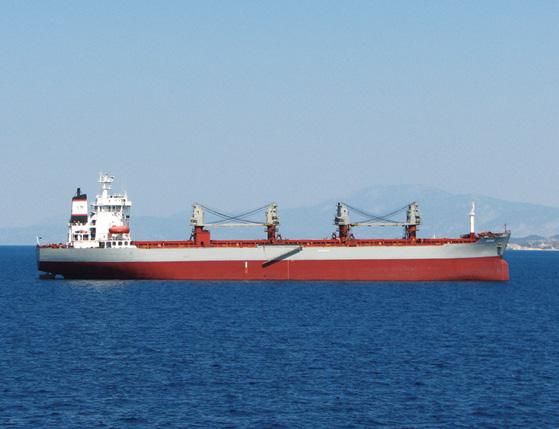
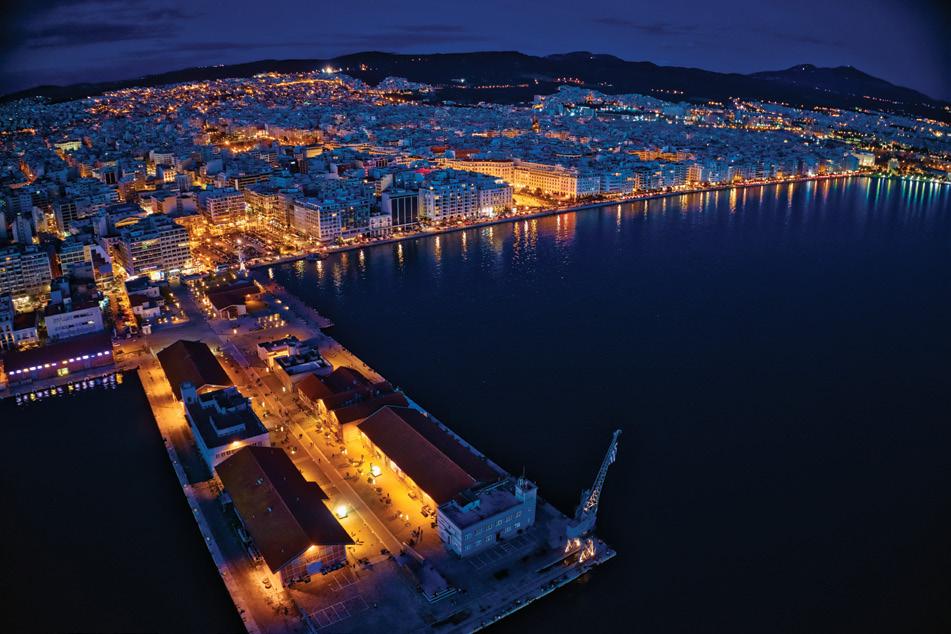
Greece is famous for three things: tour ism, shipping and agriculture. These three “legs” are the basic motors of the economy of on the southernmost countries in Europe. The nature was shaping the Greek economy even from the ancient times. It is predominantly “seaside nation”, and it used to form colonies across the Mediterranean, and to trade. Their direct opponents and competition at the time were the Phoenicians, who applied the same approach during their Golden Age, but the Phoenicians were finally de stroyed by the envious Romans, while the Greeks were simply incorporated into Rome with lots of admiration,
After the World War Two, Greece was devastated, and it took a long time to recover. The political instability was not helping. But after 2000, the Greek economic miracle happened, so the GDP rise was well above the Eurozone, signifying the “imperial period” of Greek economy, spurred by low-cost flights boom and the Schengen agree ment, together with the end of the modern Balkan Wars. But the World Economic Crisis after 2008, paired with the Eurozone crisis and the Greek government debt crisis lead to the sharp fall. Finally, recently it was an nounced that this nightmare is over, and the Greek government will finally be able to control its own budget. The new hit came this year with the loss of Russian, Ukrainian and Belarusian tourists, and the sanctions against Russia which has long been the first import partner of Greece. It is yet to see how the year will end and the transi tion to other markets will go.
Greeks like to invest in the Balkans. Greece is the largest foreign investor in Albania the third in Bulgaria, in the top-three in Romania and Serbia and the most important trading partner and largest foreign investor in North Macedonia. It is so strong. No wonder the Greeks are good in telecommunica tions, since they have always been the nation that connected all different part of the world, first with their ships, and then, by sea, with the conquest of the Alexander the Great.
And tourism. Oh, but it is quite another matter. In another, bigger ar ticle.
Of course, the Greeks were excellent shipbuilders. They have remained so. The world would be almost doomed without Greek vessels!
ECONOmy
Photo: Wikimedia
Photo: Wikimedia
48 www.diplomacyandcommerce.rs G r EECE by Žikica milošević
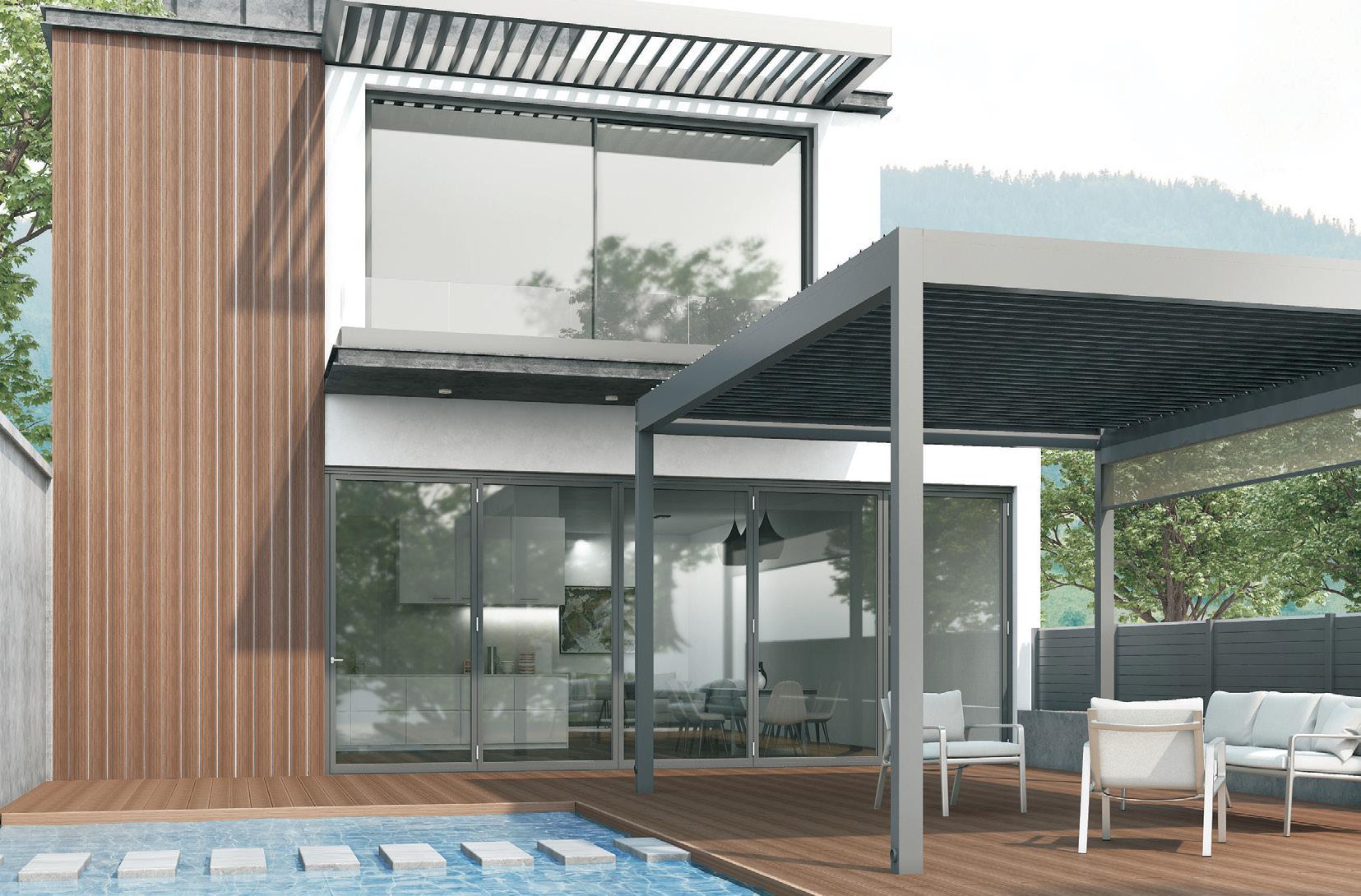
Economic cooperation: Serbia – Greece

in the first eight months of 2022, the total external trade in goods with Greece amounted to 533.8 million euros. In the same period, im ports amounted to 194.5 million euros and exports 339.3 million euros.
According to the data from the State Statistical Institute, in the period from January to June 2022, the total external trade in goods with Greece amounted to 414.8 million euros. In the observed pe riod, imports amounted to 150.4 million euros, while imports stood at 264.4 mil lion euros. In the observed period, Serbia recorded a deficit in trading with Greece in the amount of 114.0 million euros. In the same period, the export-to-import ratio was 56.9%.
Based on data from the Republic of Serbia’s Ministry of Finance of - Customs Administration, in 2021, 2,082 com panies from Serbia did business with Greece.
According to the data of the Serbian Business Register Agency, from May 2022, Greek citizens, i.e. legal entities registered in Greece, owned 344 compa nies in Serbia.
Greek investors are mostly interested in investing in these economic branches - the food and beverage industry, infra structure, energy, environmental protec tion and transport. The Greeks have also shown interest in investing in the energy sector and renewable energy sources (Ak tor, Terna, etc.). Greek businesses are also keen to establish and boost cooperation in organic food production, tourism and innovation (technology transfer, etc.).
Greek construction company Terna S.A. signed a contract with the company VINCI Airports stipulating the extension and reconstruction of Belgrade›s Nikola Tesla airport, worth 262 million euros. Consortium VINCI Airports (with a 51
percent stake in the project) and Terna S.A. (with 49 percent) will have five years to implement the project. The project includes the construction of new passen ger terminal facilities spanning 42,000 square metres, as well as the renova tion of the existing are spanning 15,000 square metres, the construction of a new 3,500-metre-runway, renovation and up grading of the existing runway, etc.
There is also a great opportunity to improve the trade between the two countries, given that it is currently at a relatively low level. Thanks to several Greek and Serbian products being sold in respective countries via supermarket chains Delhaize Maxi (Delhaize) and Super Vero (Veropoulos), which are man aged by Greeks, the cooperation between the two countries received a significant boost, given that the top managers from both supermarket chains have expressed interest in marketing products from Ser bia in Greece and vice versa.
The legal regulation of public-private partnerships creates opportunities for joint projects of our state and Greek pri vate capital in motorway construction projects (primarily Corridor 10), as well as the development of accompanying infrastructure (motels, shopping malls, restaurants, etc.).
The cooperation between the two countries’ chambers of commerce, both bilaterally and multilaterally, as well as cooperation with other institutions and associations in Greece, have been very successful and constant.
Thanks to multilateral forums such as the Association of European Chambers, the Association of Mediterranean Cham bers, the Association of Balkan Chambers and the Black Sea Economic Cooperation, Serbia and Greece have been fostering ac tive cooperation.
On March 28 and 29, 2019, the state and business delegation of the Republic of Greece paid an official visit to the Re public of Serbia. The delegation was led by Mr. Sokratis Famellos, Alternate Environ ment and Energy Minister of the Republic of Greece. The commercial part of the delegation consisted of sixteen Greek companies from the environmental pro tection sector. Continuing to contribute to the development of the overall economic cooperation between Serbia and Greece in environmental protection, the Cham ber of Commerce and Industry of Serbia, with the support of the Serbian and Greek ministries, held the Serbia-Greece Busi ness Forum. The forum was attended by 16 Greek and 71 Serbian companies, and over 100 bilateral talks between compa nies’ representatives were held. The first day of the visit was dedicated to meetings of delegations at the ministerial level, during which the two ministries signed a Memorandum of Understanding on environmental protection. The second day of the visit was planned for economic cooperation and the Serbia-Greece Busi ness Forum, which aim was to foster cooperation between Serbia and Greece in environmental protection.
Under the auspices of the Athens Chamber of Commerce, a delegation of Greek business people visited Serbia on Thursday, March 5, 2020. On the occa sion, the Chamber of Commerce and Industry of Serbia, in cooperation with the Athens Chamber of Commerce, the Embassy of the Republic of Greece in Belgrade and Greek associations for the promotion of Greek businesses, Enter prise Greece and SEVE, organized the Serbia-Greece Business Forum and bilat eral business talks with the participation of over 100 Serbian and Greek business people.
Greek investors are mostly interested in investing in these economic branchesthe food and beverage industry, infrastructure, energy, environmental protection and transport.
The cooperation between the two countries’ chambers of commerce, both bilaterally and multilaterally, as well as cooperation with other institutions and associations in Greece, have been very successful and constant.
COOpE r ATION
50 www.diplomacyandcommerce.rs G r EECE

hbA is bringing the Greek and Serbian markets closer
With the valuable support of its members, the hba supports the promotion of the Greek language and culture and, at the same time, carries out humanitarian and socially responsible initiatives
ACTIVITIES
The Hellenic Business Association of Serbia (HBA) aims to bring the Greek and Serbian markets closer, as well as to encourage continuous im provement of the business environment in the country. The association provides full support to its members in communi cation with Serbian and Greek institu tions, promotes the interests of the Greek business community and encourages Greek investment initiatives in Serbia.
With the valuable support of its members, the HBA supports the promotion of the Greek language and culture and, at the same time, carries out humanitarian and socially responsible initiatives that dem onstrate the importance of solidarity and caring for the community.
workShop: rIghtS and oblIgatIonS of SubjectS In the InSpectIon procedure
The Hellenic Business Association of Serbia, the Belgian-Serbian Business As sociation and the Croatian Business Club organized a workshop titled “ Rights and Obligations of Supervised Business Enti
ties during Inspection Procedures “, on October 10, 2022, at the Saint Ten Hotel. During the workshop , lecturer and con sultant Milan Stefanović presented the practical implementation of systemic legislation in the inspection procedure.
On this occasion, participants received answers to the most important questions regarding an inspection procedure, as well as the rights and obligations of all participants in an inspection. After the conference, the participants took part in a networking coffee break.
InternatIonal networkIng cocktaIl
On September 13, 2022, the 5th Inter national Networking Cocktail was held at the Metropol Palace Hotel, a unique event that gathers members of bilateral busi ness associations in Serbia. This year, the International Networking Cocktail was attended by the representatives of mem ber companies of the Hellenic Business Association of Serbia, the French-Serbian Chamber of Commerce, the German-Ser bian Chamber of Commerce, the Italian-
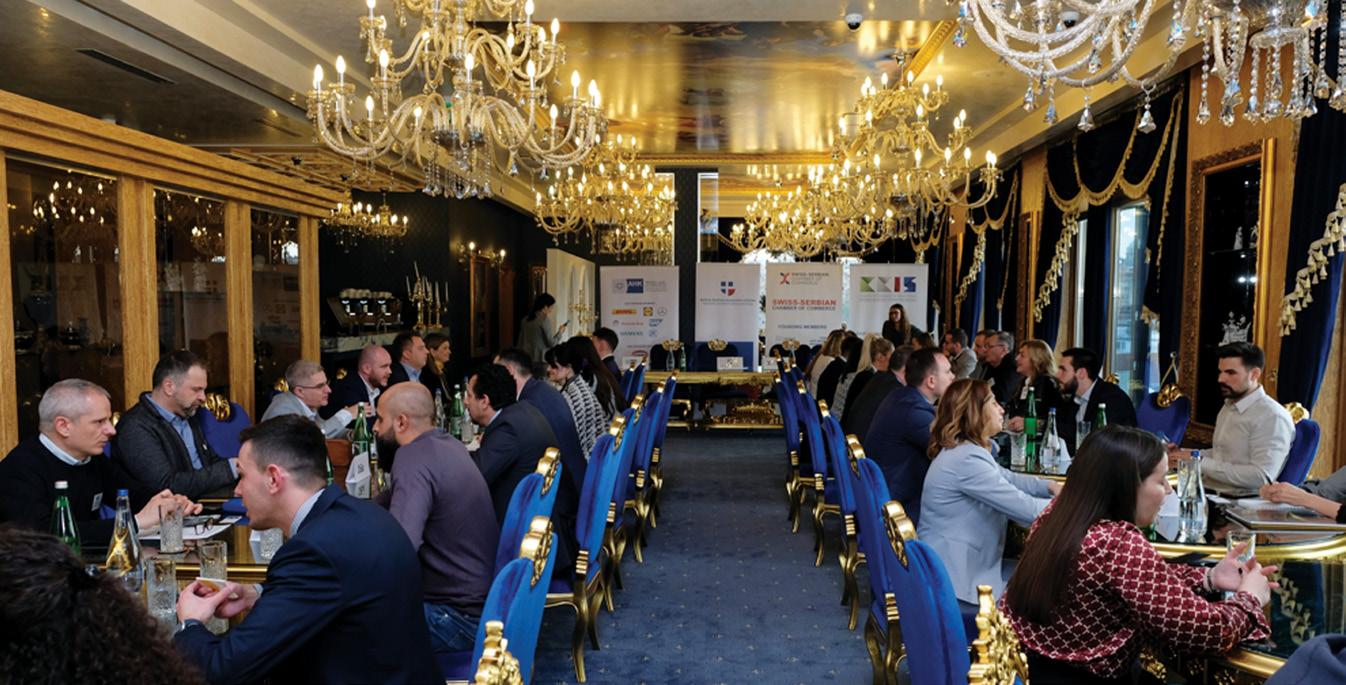
Serbian Chamber of Commerce, the Slove nian Business Club, the Croatian Business Club, the Swiss-Serbian Chamber of Com merce, the Japanese Business Alliance in Serbia, the Dutch-Serbian Business As sociation, the Canadian-Serbian Business Association, the Belgian-Serbian Business Association, the Nordic Business Alliance and the Business Club of the United Arab Emirates and Serbia.
hba memberS vISIt the alumIl yu InduStry factory
. The Hellenic Business Association of Serbia, in cooperation with the member company Alumil YU Industry, organized a visit to the factory for aluminium profiles production in Stara Pazova, on June 16th 2022. This business and social event was organized with the aim of member‘s net working, meeting the new Management Board, as well as presenting one of the most successful Greek companies in Serbia.
Mr. Stylianos Tsoktouridis, director of Alumil YU Industry presented the compa ny‘s products, its production capacities, its contribution to environmental protection
hbA
Speed Business Meeting April 52 www.diplomacyandcommerce.rs G r EECE
and some of the most significant construc tion and architectural projects in which Alumil YU Industry has participated. This was followed by the factory tour, during which the HBA members had the opportu nity to see how the processing and produc tion of aluminium profiles are done.
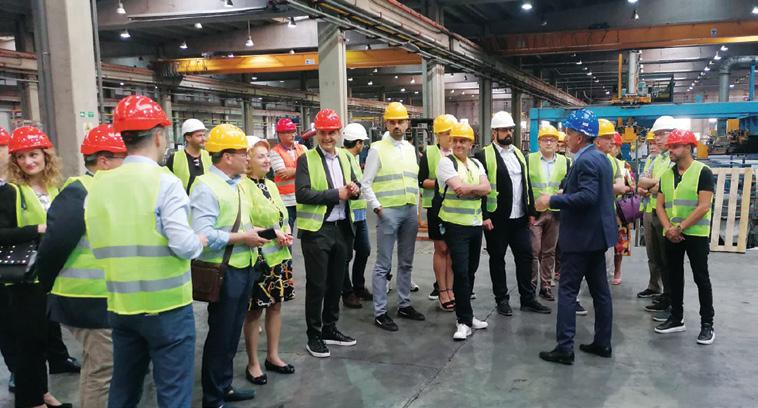
general a SSembly meetIng The Hellenic Business Association of Serbia held its annual General Assembly meeting on May 10, 2022, at the IN Hotel. At the meeting, the HBA members elected a new Board of Directors - Nikolaos Sliousaregko (the Junior Hotel) is the Board’s new Chairman, Vuk Dapčević (Eu robank Direktna) is the Deputy Chairman, while Vassilis Karanasios (Coral SRB - Of ficial Shell Licensee), Stylianos Tsoktou ridis (Alumil YU Industry)and Georgios Karafergias (Roda Točkovi) are elected Board members. During its mandate, the newly elected board of directors will con tribute to the accomplishment of the As sociation’s main goals relating to its vis ibility by public institutions in Serbia and Greece, active representation of the Greek business community interests in Serbia, and the improvement of cooperation, both among members and with other lo cal and foreign companies. During the evening, the HBA expressed special grati tude to Mr. Zafiris Lampadaridis and Mr. Stilianos Zakof, who as members of the Board of Directors and presidents of the Association have contributed to its devel opment and promotion for many years.

On this occasion, the Hellenic Business Association of Serbia awarded Mr. Lam padaridis and Mr. Zakof, who was also, by the Assembly of Members, proclaimed as honorary member of the Association.

workShop: dIg Ital marketIng at the ServIce of your buSIneSS
The workshop titled “Digital market ing in the service of your business” was successfully organized by the Hellenic Business Association of Serbia, the Bel gian-Serbian Business Association, the Dutch-Serbian Business Association and the Canadian-Serbian Business Associa tion, in cooperation with the company V + O Communication and its representa
tives, director Nada Filipović and Marko Ilić, digital marketing specialist, on April 19, 2022, at the Mercure Belgrade Excel sior Hotel. The workshop focused on the importance and use of the full potential of digital marketing through proven effec tive strategies. On occasion, the workshop participants were informed about the techniques for increasing the company’s visibility on social networks, targeting specific public members and communi cating with specific target groups, as well as the methods of raising brand aware ness. At the workshop, all participants were given a practical task, during which they could practice skills, exchange ideas with other participants and receive feed back from the lecturer.
Speed buSIneSS meetIng
A Speed Business Meeting was held in Belgrade on April 7, 2022, at which mem bers of four bilateral chambers of com merce took part - the Hellenic Business Association (HBA), the German-Serbian Chamber of Commerce (AHK), the ItalianSerbian Chamber of Commerce (CCIS) and the Swiss-Serbian Chamber of Commerce chambers (SSCK). The event brought to gether almost 50 representatives of mem ber companies from various business sectors. During 10 eight-minute meetings, all participants had the opportunity to quickly and efficiently meet potential business partners and expand the net work of business contacts. The meetings were followed by networking cocktail and informal socializing. Those members who didn’t meet during the direct meetings used this opportunity for an additional exchange of contacts.
webInar: meetIng of 12 bIlateral buSIneSS a SSoc IatIonS In SerbIa wIth the natIonal employment ServIce
Over 100 member companies were informed about current employment and financial support programmes forentrepreneurs.. Representatives of the NES informed the participants about all the novelties within the program of ac tive employment policy measures, the amount of financial support to employ
ers, the categories of unemployed people who can be hired, as well as other benefits that can be achieved through cooperation with the NES. The event was jointly organ ized on March 17, 2022, by the French-Ser bian, German-Serbian, Swiss-Serbian and Italian-Serbian chambers of commerce, the Dutch-Serbian and Belgian-Serbian business associations, the Slovenian and Croatian business clubs, the Hellenic Business Association, the Canadian-Ser bian Business Association, as well as the Japanese and Nordic business alliances.
InternatIonal coffee break
On March 7, 2022, within Kopaonik Business Forum, nine bilateral organiza tions in Serbia, gathered representatives of member companies at the traditional event called International Coffee Break, at the Casa Hotel Grand Restaurant. The event was organized by the following bi lateral organizations: the Belgian-Serbian Business Association, Hellenic Business Association of Serbia, Croatian Business Club, Canadian-Serbian Business Associa tion (CANSEE), Italian-Serbian Chamber of Commerce, German-Serbian Chamber of Commerce, Nordic Business Alliance, Slovenian Business Club and Swiss-Serbi an Chamber of Commerce.
award of ScholarShIp S for learnIng the greek language to StudentS of the orthodox faculty of theology
In cooperation with the Hellenic Foun dation for Culture, and with the blessing of His Holiness the Patriarch of the Ser bian Orthodox Church, Mr. Porfirije, the
Donation to the dr Milorad Pavlovic Children's Village in Sremska Kamenica
HBA visit Alumil YU Factory International Networking Cocktail
53
Hellenic Business Association of Serbia awarded scholarships for learning the Greek language to students of the Ortho dox Theological Faculty of the University of Belgrade. The students will attend a four-month course at the Hellenic Foun dation for Culture, from March to June 2022. This initiative, launched by the Hel lenic Business Association of Serbia, aims at strengthening and improving the cul tural and historical ties between Greece and Serbia. On the occasion, the schol arships were awarded at the ceremony held at the amphitheater of the Orthodox Theological Faculty in Belgrade, on Mon day, February 28, 2022. Bishop Toplički, Mr. Jerotej, the Dean of the Orthodox Theological Faculty, Mr. Zoran Ranković and the Consul of Greece, Mr. Konstanti nos Androulakis, addressed the audience, welcoming this initiative and confirming strong ties between the two nations.
annual receptIon In honour of the cuttIng of va SIlopIta
The Hellenic Business Association of Serbia held the traditional reception to mark the Cutting of Vasilopita, a custom upheld in Greece to mark a successful business year for a company. The recep tion gathered a large number of the Asso ciation’s members and friends, while the Serbian Economy Minister, Ms. Andjelka Atanasković, was a special guest at the event. The event was also attended by the Ambassador of Cyprus, H.E. Mr. Dem etrios A. Theophylactou, as well as repre sentatives of the Department of Economic and Trade Relations of the Greek Embassy
in Belgrade, Mr. Vassilis Skronias and Mr. Marios Belibassakis. The event took place on February 22, 2022 at the Hyatt Regency Hotel in Belgrade. At this year’s event the Hellenic Business Association of Serbia awarded company Balkan Cargo and hotel Hyatt Regency Belgrade for their 10th anniversary of membership. The performance of the Greek choir “Elinofo nia” brightened the event and during the evening, the Vice President of the HBA, Mr. Nikolaos Sliousaregko, presented the custom of Vasilopita, which ended with the traditional cutting of Vasilopita pie. This year, the company Color Media Com munications found a lucky gold coin in Vasilopita pie.
webInar: dIalogue wIth the mInIStry of mInIng and energy
As part of the joint initiative of the German-Serbian Chamber of Commerce, the French-Serbian Chamber of Com merce, the Italian-Serbian Chamber of Commerce, the Hellenic Business Asso ciation of Serbia and the Belgian-Serbian Business Association, the Dialogue with the Ministry of Mining and Energy we binar was successfully held in February., The companies had the opportunity to get detailed answers to their questions, as well as to be informed on the current activities and plans in the mining and en ergy sector. The webinar participants also received detailed and specific answers to their questions and were informed about current events and plans from the mining and energy sector.
donatIon to the dr mIlorad pavlovIć chIldren›S vIllage In SremSka kamenIca
In January this year, acting HBA President, Mr. Zakof, vice-president Mr. Sliousaregko and a member of the executive board, Mr. Vuk Dapčević vis ited the Dr. Milorad Pavlović Children’s Village,which is currently the home of almost 100 children and young people without parental care. . On this occasion, the HBA donated more than 800 everyday products for the Village’s residents, worth 200,000 dinars. The members of the HBA Board of Directors handed the donation to the Village’s director, Mirko Jankelić, who, in turn, gave the Association a Certificate of Appreciation for the humanitarian aid. Part of the money from this donation was collected at the traditional members’ Christmas dinner, while the rest of the money was allocated by the Association from its budget.
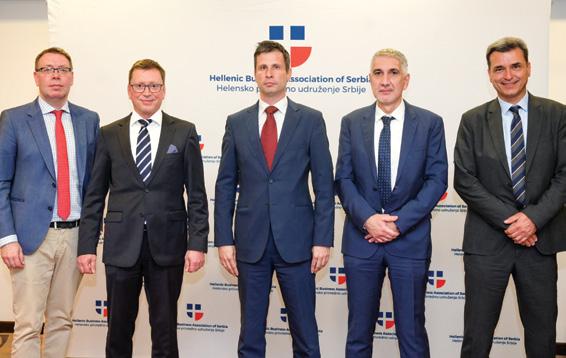
humanItarIan chrIStma S dInner
In December 2021, the HBA hosted its traditional Christmas dinner at the Piata kia tavern. At this year dinner, the Asso ciation organized a humanitarian lottery in order to raise funds for the purchase of necessary products for the daily life

of children in the Children’s Village “Dr Milorad Pavlović” Sremska Kamenica.The HBA is especially grateful to the compa nies Alfa Foods, Diplomacy&Commerce, Chipita, Extra Coffee, Farmalogist, Hrana Mediterana, the IN Hotel, Hyatt Regency Belgrade, Junior, Metropol Palace, Mer cure Belgrade Excelsior, Mezestoran Dvorište, Ioanna Regen, Kessidis Group, Leto Shop, Mitsides Point, Piatakia, Sterile and Super Vero, which donated more than 60 products and services to the humani tarian lottery, as well as to all the present members, who by purchasing tickets, helped with the realization of this event.
Speed buSIneSS meetIng
In November 2021, a speed business meeting was organized in cooperation with the Croatian Business Club, the French-Serbian and the British-Serbian chambers of commerce at the Metropol Palace Hotel. The meeting was attended by 30 companies from different business sectors, who had the opportunity to ex change business contacts and connect.
meetIngS wIth the greek deputy foreIgn mInISter and general Secretary for InternatIonal economIc relatIonS and cooperatIon
The HBA BoD and members had oppor tunities to meet twice with Greek Deputy Minister of Foreign Affairs Konstantinos Frangogiannis during 2021. The meetings were held at the Greek Embassy in Bel grade during April and November, with the second meeting also attended by this min istry’s Secretary General for International Economic Affairs and Openness, Ioannis Smirlis. These meetings included discus sions of current issues related to economic and trade relations between Greece and Serbia, as well as possibilities to further develop and improve these relations.
meetIng of the unIon of greek buSIneSS a SSoc IatIonS from Southea St european countrIeS
As part of the 6th Summit in Thessa loniki, a meeting of the Union of Greek Business Associations of Southeast Eu ropean Countries was held in November 2021 and was attended by the Secretary General of the Ministry of Foreign Affairs, Yannis Smirlis.
meetIng wIth the SerbIan orthodox church patrIarch mr. porfIrIje
The HBA Board of Directors met with His Holiness the Serbian Orthodox Church Patriarch, Mr. Porfirije, in the Pa triarchate building in Belgrade, in October 2021. The topic of discussions was the beginning of reconstruction works on the Church of the Holy Archangel Gabriel in Zemun, where regular services are held for the Greek Orthodox believers who live in Belgrade.
General assembly meeting
Humanitarian Christmas dinner
54 www.diplomacyandcommerce.rs G r EECE
Things that should not be missed while in Greece!
There are few nations with such colourful traditions as the Greeks. The popular Šurda fanta sised about “hot wind”, big fruits, cafés by the sea and dancing, but what, apart from this archetypal tradition, is typical of Greece and its culture, and what should not be missed when you go to this country.
ouzo, tSIpouro, ma StIka It is obligatory that you taste one for the anis-based drinks while eating or simply chilling in one of the numerous beach cafeterias. All three drinks are similar, and are known to be colourless in their original state, but with the addi tion of water, they turn white. It is said that tsipouro is the oldest drink and that it originated from the monks of Holy Mount Athos and that it was developed by the specific addition of anis seed in the 14th century. Only from the 19th century, after the departure of the Turks, who appropriated this drink and spread it throughout the Mediterranean as raki or arrack, did the Greeks approach production more seriously and became world famous. Only with the decline in absinthe‘s popularity at the end of the 19th and beginning of the 20th century, due to its too strong effects, ouzo be came mega-popular. The name „ouzo“ was registered as Greek in 1989, and the drink can only be produced and bear this name in Greece. Tsipuro is a highly distilled drink that contains between 40% and 45% alcohol by volume and is produced from pomace (the rest of the
wine press) or from wine after separat ing the grapes and juice. It comes in two varieties, pure and aniseed, and is usu ally not barrel-aged, although there are barrel-aged versions. Last but not least, mastika, as we know it in Serbia and Bulgaria, is a sweet liqueur produced with the mastika resin from the Greek island of Chios, which is distilled after hardening to crystals. Nevertheless, try all three of them. You won’t regret it. Unless you taste... a bit too much!
greek coffee
There is always a linguistic problem in the Balkans. In Serbia and Republic of Srpska, people tend to drink “home made coffee”, in Montenegro, it is “boiled coffee”. In the Muslim parts of Bosnia, it is Turkish, but it is never so in Greece! Or in Southern Cyprus. Not once we ordered “o kafé kypriakó” or “o kafé ellinikó”, and many tourists won dered what is the difference between all these types of coffee? Well, don’t miss the Greek coffee on your holidays. Greek coffee is usually served with a glass of cold water and sometimes served with sweets (such as cookies). It is tradition ally black, although some young people prefer to order a „double“ Greek coffee and add milk to taste. There are four main styles of Greek coffee: unsweet ened or sketos, somewhat sweet or metrios, sweet or glykos and very sweet. Choose your type. And be patient, like the Greeks in the Kastellorizo, in the film “Mediterraneo”. Patience is the king. It is not espresso.

feta cheeSe
The Greeks have won the legal battle against their arch-nemesis in the area of cheese production, i.e. Denmark. And the subject was feta cheese. Now, there is no more “Danish feta”, there is only “feta” and it is implicitly Greek. It is a classic cheese from Greece (also famous in Bulgaria, Turkey, Denmark and Ro mania), based on the cheese curd that is cured in brine. This type of cheese is very traditional and was described hundreds of years ago, going back at least to classi cal antiquity. Feta is generally made with sheep‘s milk, although varieties with mare‘s milk can be found. Feta cheese is so popular in Greece that it is even imported from other areas, such as Den mark. In Greece it was traditionally made with sheep‘s milk, or sometimes with a mixture of sheep‘s and goat‘s milk, which gave it a well-defined flavor, and a point of salt derived from submerging the fresh cheese in brine. Currently, cow‘s milk is also used and its flavour is no longer so defined. It is a perfect snack.

orange honey
In Serbia, honey is usually connected to linden, or any other continental tree or a field plant. But, in Greece, there is a deli cacy! Orange honey, the best honey in the world, not only because it tastes splendid. Greek honey made from orange has an extremely favorable effect on the liver, digestive system and heart. Due to its diu retic and detoxifying effect, fruit honey is used to treat urinary tract diseases. It gets a light yellow colour after sugaring.
Tr A dITION
Never forget to taste the local cuisine, since the stubborn Greeks preserved their millennialong tradition intact!
When in Rome, do as the Romans do, when in Greece... 55 by Žikica milošević
The unique alphabet
once it ruled half of the Mediterranean
and then it got constrained to the countries of Greece and Cyprus, with notable minorities in Albania and around the Black Sea. But it was the key step towards defining two major aplhabets in Europe and the world, Latin and Cyrillic, which gave our planet much of its literacy!
Who was not amazed by beautiful Greek letters as a tourist? I bet you have a lot of photos with signs written in Greek. At least I have. But how the national pride of the Greeks, their alphabet, came to be?
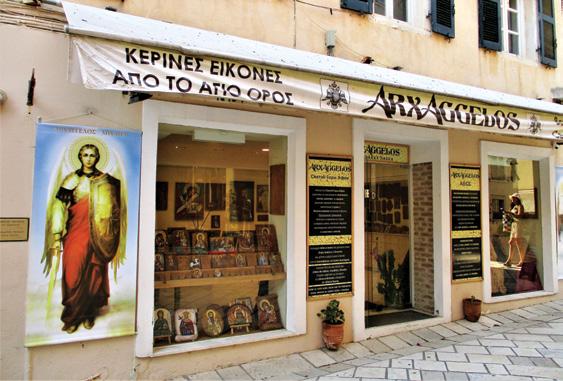
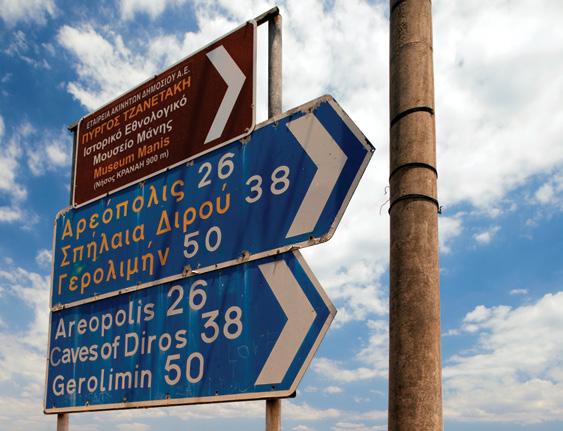
The Greek alphabet (Eλληνικό αλφάβητο in modern Greek) consists of twenty-four letters used to write the Greek language. Developed around the 9th century B.C, from the Phoenician consonantal alphabet, the Greeks adopted the first complete alphabet in history, understanding it as the writing that expresses the individual sounds of the language, that is to say that practically each vowel and each consonant corresponds to a different symbol. So, for the first time, the Semitic practice of discarding vowels (“OK, we know them anyway and the people in different regions tend to change them”) was abandoned!
Since the Greek alphabet is the origin of the Latin alphabet and the Cyrillic alphabet, all European writing comes from it and they share the shape of their letters. Regarding the Latin alphabet, 14 of the 24 Greek letters are homoglyphs in their capital forms (11 with a similar value and 3 with a different value: Η, Ρ, Χ); Of the remaining 10, 5 have a Latin
equivalent but a more angular form: Γ, Δ, Λ, Π, Σ and another 5 do not exist in the Latin al phabet: Θ, Ξ, Φ,Ψ,Ω. Its use continues to this day, both as a native modern Greek alphabet and as a way of creating technical names for the sciences, especially logic, mathematics, chemistry, physics, biology, economics, as tronomy, and computer science.
The Greek alphabet was the model for various others: the Etruscan alphabet; the Latin alphabet, together with various other ancient scripts in Italy, adopted from an archaic form of the Greek alphabet brought to Italy by Greek colonists in the late 8th century BC, via Etruscan; the Gothic alpha bet, devised in the 4th century AD to write the Gothic language, based on a combina tion of Greek and Latin uncial models, the Glagolitic alphabet, devised in the 9th cen tury AD for writing Old Church Slavonic; the Cyrillic script, which replaced the Glagolitic alphabet shortly afterwards, the Coptic Al phabet used for writing the Coptic language (still in use). The Armenian and Georgian alphabets are almost certainly modeled on the Greek alphabet, but their graphic forms are quite different.

In the ancient times, not only Egyptian (Coptic) was written with Greek alphabet, but many other: late Phoenician, for in stance. The codification of modern Albanian was also tried in many different alphabets, one of them Greek. Tosk Albanian was often written using the Greek alphabet, starting in about 1500, since the Tosks were preva
C ULTU r E
lently Orthodox. It was only in 1908 that the Monastir conference standardised a Latin orthography for both Tosk and Gheg. Aromanian was also written with Greek let ters, and the Arvanitic language, one of the languages from the Albanian branch, is still written with Greek letters. Turkish spoken by Orthodox Christians (Karamanlides) was often written in Greek script, and called Karamanlidika. Gagauz, a Turkic language of the northeast Balkans spoken by Orthodox Christians, was apparently written in Greek characters in the late 19th century. In 1957, it was standardized on Cyrillic. Surguch, a Turkic language, was spoken by a small group of Orthodox Christians in northern Greece. Urum or Greek Tatar, spoken by Or thodox Christians, used the Greek alphabet. Judaeo-Spanish or Ladino, a Jewish dialect of Spanish, has occasionally been published in Greek characters in Greece.
But now it is almost all gone. The nation that gave the world many derived scripts, is now almost one and only in its use of the beautiful letters of the antiquity. So, if you aks yourselves “Is something wrong with me if I want to take a picture of street signs, motorway signs of shop names in Greek? Why do I feel this strange attraction and excitement when I see the inscription “OYZO” on a simple bottle? – do not worry!
Everything is OK with you. Perfectly OK. You just feel connection the language of philoso phers and poets, and you are simply in love with the proud and unique, beautiful coun try of the south, that connected the three continents with its culture. The first simple letters for everyone.
If you feel a strange attraction for the inscriptions in Greek, don’t worry –everything is quite fine. you should.
Photo: Wikimedia
Photo: Curtis Gregory Perry / Flickr
Photo: Žikica
Milošević
56 www.diplomacyandcommerce.rs G r EECE by Žikica milošević
by
The Summer paradise...
the cradle of culture
The entire Western civilization was born in Greece. All that we today consider sacred guiding stars ap peared first in Greece. It’s no wonder that Byron adored Greece, fought for it and praised it. British tourists were the first to discover Greece during the travel craze of the 19th century, and others followed. And when marine tourism became a “must”, Greece went from being an agri cultural country and a land of seafarers to one of the biggest tourist powers. With some of the most beautiful and expensive resorts, such as Mykonos or Santorini.
Greece is known for its unusual rocky landscapes, untouched natural beauty, endless coasts, as well as 6,000 world-fa mous smaller and larger islands of inde scribable beauty. Apart from sun and sea, tourism is the main feature of Greece’s present and past.
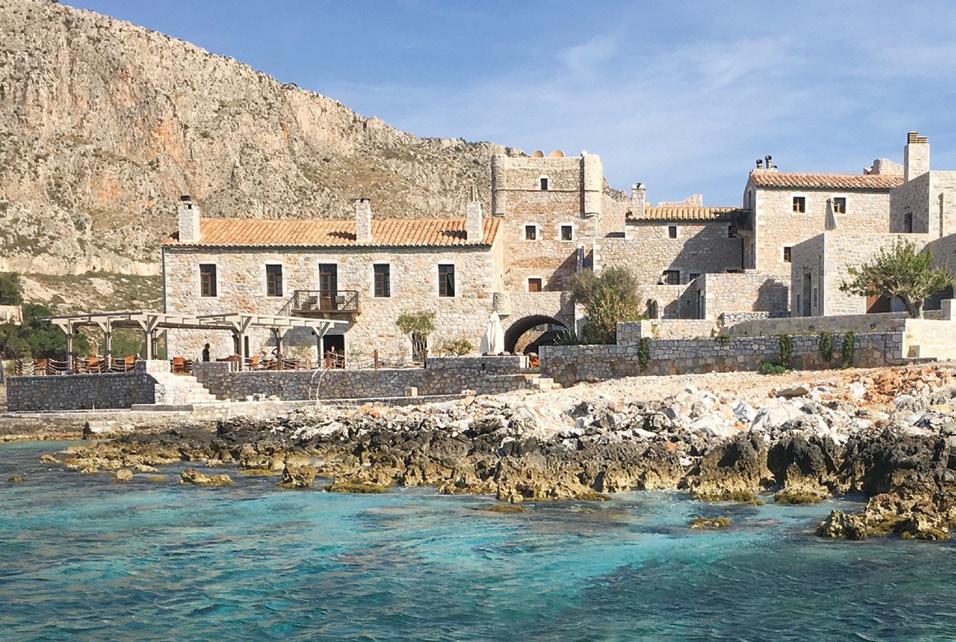
Tourism in Greece is a key element of economic activity in the country and is one of the most important sectors in the country. Greece has been a major tourist destination and attraction in Eu rope since ancient times, due to its rich culture and history, which is largely re flected in its 18 UNESCO World Heritage Sites, among the first in Europe and the world. The facts say that Greece attracted as many as 31.3 million visitors in 2019, up from 24 million in 2015, making Greece one of the most visited countries in Europe and the world, and contribut
ing to approximately 25% to the nation‘s Gross Domestic Product. And this year could be a record year even though there are no Russian tourists, although we are still waiting for the official results. After twelve years of the financial crisis, al most three years since the declaration of the pandemic and (so far) eight months of war in Ukraine, the people became aware that the life is short and you can take all you can, while you are still there and you have the means to do that. The absence of tourists from Russia, which until 2021 were very important in re gions such as Halkidiki or Crete, is now
compensated by tourists from other countries.
In the ancient times, it was popular to visit Delphi, to hear the world of the oracle. It was popular to go to the Olympic Games, and when Greece was annexed by the Roman Empire centuries later, the cultural exchange that began between the two civilizations resulted in large num bers of Romans visiting famous centers of Greek philosophy and science, such as Athens, Corinth, and Thebes, in part because Greece became a province of the Roman Empire and the Greeks were granted Roman citizenship.
Tourism in modern-day Greece began to flourish in the 1960s and 1970s, in what became known as mass tourism. During that time, large-scale projects for the construction of hotels and other facilities were carried out, which has caused an increase in international tour ists in recent years. International events such as the 2004 Olympic Games and the 2006 Eurovision Song Contest, both held in Athens, greatly helped boost tourism in the country, while large cultural infra structures at the national level such as the New Acropolis Museum contributed. Due to the flow of tourists in the country, it is also worth mentioning that Thes saloniki was the European Youth Capital in 2014.
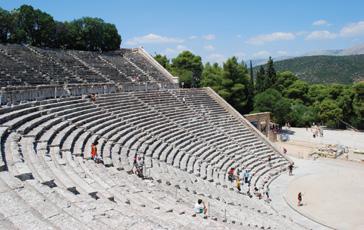
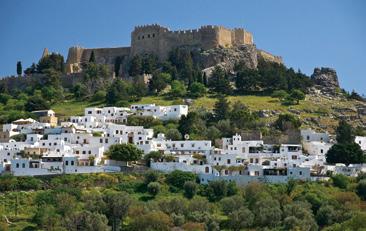
Tourism Minister Vasilis Kikilias expects even more guests than in 2019, which was a record. At that time, a total of 33 million people came to Greece on vacation. Income from foreign guests amounted to 18.2 billion euros. The Greek central bank expects that this year it will amount to 20 billion, Deutsche Welle in forms us. It is interesting that Greece can accept anyone. For instance, according to Lonely Planet, Skiathos and Mykonos are ranking among the most LGBT-friendly destinations in the world. The former has particularly come under the spotlight after filming the “Mamma Mia!” block buster several years ago.
It is interesting that the tourist from the Balkans usually got to the North, to the Macedonian riviera and the Ionian coast, since they travel by car or bus, while the Northern tourists prefer the South of Greece, since their means of transport is – airplane! But whatever the means of transport is, Greece will never leave you bored. As the Pet Shop Boys’ song states, “never being boring, never being bored”. It reminds me of Greece when I hear the chorus. Mark it for 2023, the summer is perhaps, not around the corner, but soon you will start to think about it!
Greece will never leave you bored. As the pet Shop boys’ song states, “never being boring, never being bored”. It reminds me of Greece when I hear the chorus.
a nd
TOU r ISm
Photo:
Wikimedia Photo: Wikimedia Photo: Wikimedia 57
Žikica milošević
Top 7 summertime places in Greece


start thinking about the s ummer of 2023!
TOU r ISm
The summer has just gone, but the craving for the next one gains ground every day, with the grey clouds over us. Here are 7 ideas for the summer of 2023!
1corfu
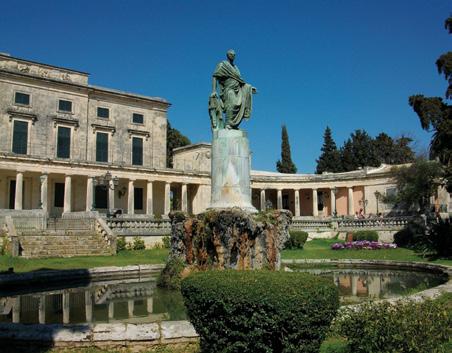
The famous place from the Serbian history, Corfu is now connected by WizzAir flight from Belgrade, making it an ideal destination for the younger tourists. It is also well connected by the motorway, and it makes a perfect day trip even if you are in neighbouring Albania. It boasts many attractions from Greek, Venetian and British history, since it be longed to all of these countries. The Ital ian flare cannot be missed walking down the narrow streets of the Corfu Old Town.
2zante
The pearl of the Ionian coast, an island immortalised in the „Captain Corelli Mandolin“, is well known for its magnificent beaches, among which the „Navagio“ („The Shipreck“) beach excels. It was also soaked with Venetian spirit, hence the English name, while the Serbi an tourists use the original Greek name, Zakyntos. It was part of the jokes, even giving the slang word for the „pennyless“ – „Dekyntos“.
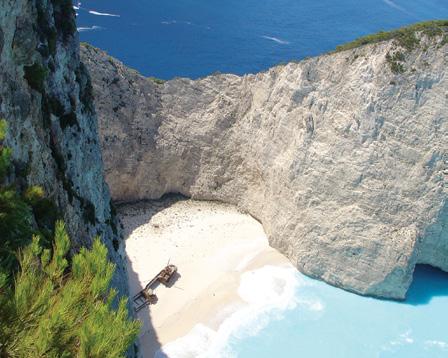
3parga
The city of Parga, built amphitheatri cally, stands between the mountainous

coastal region of Preveza and Igoumenit sa. It is known as the “Bride of Epirus”. In the summer, tourists arrive from Paxos, Antipaxos, and Corfu by boat. The Ser bian tourists extensively visit this town and enjoy its beaches, castle and the charming atmosphere of the Old Town.
4monemva SIa Monemvasia is what the people might imagine Byzantine Empire looked like. And they are right. The mountain town at the extreme southern tip of Peloponesus, is what the time machine would look like. The famous wine of Monemvasia was taken by Venetians to their homeland where it changed its pro nunciation to Malvasia, and hence the famous Istrian wine came to be.
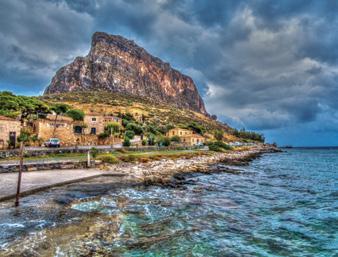
5SantorInI
As much as Greece is known for its gods and ancient past, it is also known for its beautiful islands. If we were to sin gle out some of them, Santorini would be one of the most beautiful. Santorini is best described by white facades, blue roofs and dark volcanic rocks with the enchanting blue of the Aegean Sea. San torini is even more fascinating if you know something more about the island itself - its origin, history, legends. The is land is conveniently connected by a Wiz zAir flight from Belgrade, which made it increasingly popular with the “regular”, i.e. price-sensitive tourists!
6SyroS
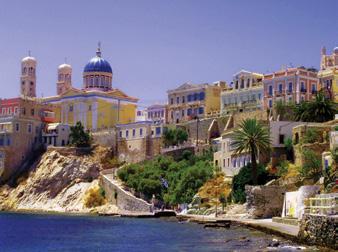
And now, for something new. A Cath olic Greece? Yes. Near Mykonos, there is a surprise. Syros is a small island of Greece located in the Cyclades archipelago, in the waters of the Aegean Sea, and in it is Hermoupolis, the capital of the periphery of South Aegean and the ancient pre fecture of the Cyclades, built on the site where, in ancient times, there was a city with the same name of Syros. In medi eval times, the island, like the rest of the Cyclades, was occupied by the Republic of Venice, and most of the inhabitants converted to the Catholic religion. The population of Syros today retains a sizea ble percentage of Catholics relative to the rest of Greece. And the Syros Old Town is quite amazing!
7SartI
Something closer for the end – Sarti lies on the Longos (Sithonia) peninsula. The name comes from the nearby An cient Greek settlement of Sarta but the current village was settled after 1923 by Greek refugees from the island of Afissia after the Greco-Turkish War and popula tion exchange. Today, Sarti is a popular tourist destination, especially during the summer when many tourists visit the area‘s beaches. It is also one of the most commonly used locations for ascending Mount Itamos. Mount Athos is visible from the town‘s beaches, as well as from the hills overlooking Sarti.
There is no way you can make a mistake in Greece if you choose this country for holidays!
Photo: Christos Vassiliou / Flickr Photo: Wikimedia Photo: Wikimedia Photo: Sarti Ddofekl / Flickr Photo: WikimediaPhoto: Wikimedia Photo: Wikimedia 1 2 3 4 5 6 7 58 www.diplomacyandcommerce.rs G r EECE by Žikica milošević

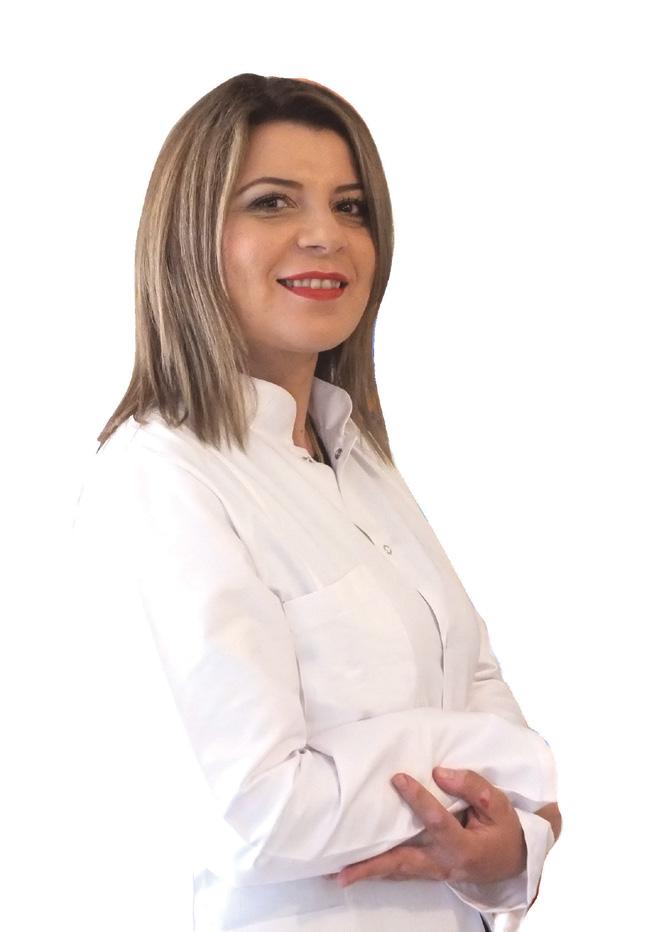
real conversations become popular again
makes sense that people would rather do more with it than just chat with their friends and family – for example, education, payment, purchases, deal ing with brands. Today we see that messaging is becoming an integral part of all our daily routines.
Some of us still remember the old dialing phones. Do you think that phone calls are going to history after losing a battle with texting?
It is true that messaging has be come more popular over the years, but calls are still a very important part of our lives. All that has changed is that instead of regular phone calls to mobile numbers, we now mostly make calls using messaging apps. I don’t remember how long ago I made a regular phone call, do you?
Our internal data also reveals that users prefer both calls and messages. For example, last year in Serbia we saw a 12% increase in calls on Viber. In general, there were more than 1,5B calls and 30B messages sent in the country.
However, I wouldn‘t say that the days of mobile calling are numbered. A regular phone call can still be very helpful in some emergency situations, especially when there is a poor inter net connection.
What about new trends when we talk about customer habits in communication with brands?
Customers expect convenient in teractions with businesses: 71% want easy access to communication, and 9 in 10 expect fast responses. Messag ing applications, where users already communicate with friends and family, are a viable solution for these needs.
From year to year, we at Viber see a growing trend on brands commu nicating with customers via the mes saging app. As of the first half of the year, we saw a 32% increase in Viber business accounts opened in Serbia, and a 50% increase in Viber business messages delivered.
konStantin koStadinoV
Communication habits change rapidly. We can see more people are seeking real conversation over texting. Here is our insightful interview with Mr Konstantin Kostadinov, senior sales director for CEE and CIS in Rakuten Viber, where he describes all chang
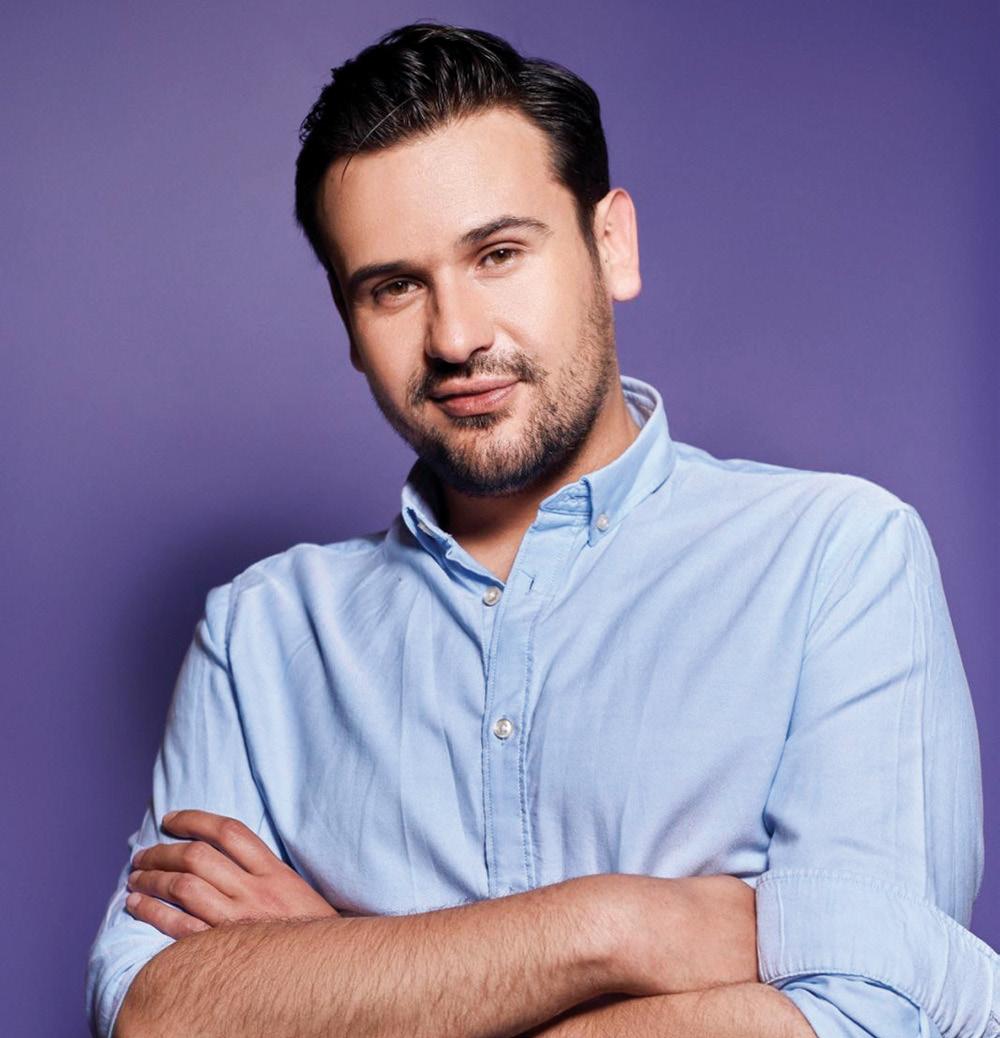
es in the communication industry from a perspective of a leader in the market.
What are the latest trends in messaging: in the world and in Serbia?
Mobile and messaging app usage is growing strongly worldwide: out of 6,5 hours spent by users on the Internet, more than half of that time is spent on mobile. At the same time, 95.6% of
Internet users access chat and mes saging apps.
Serbians are also actively using mobile devices and messengers: 78% of mobile phone users in Serbia access the Internet via mobile; 4.9 million Serbs use social media and messaging apps.
Messengers have originated in pro viding the necessary function: peerto-peer communication, which makes them indispensable. But if you’re using a messenger daily anyway, it
We also see that consumers today rely more on real conversations rather than the regular one-way messages, contributing to the rise of conversa tional commerce. As a result, we saw a considerable interest in conversation al Viber business messages: in Serbia alone, there was a 136% growth in the first half of this year.
Overall, a fast-paced, chaotic, de manding lifestyle contributes to mod ern customer demands. People want to streamline their communication and get the most out of interactions with brands.
What would be your TOP-3 rec ommendations to marketers searching for effective ways to engage the audience?
Senior Sales Director CEE and CIS, Rakuten Viber
People nowadays seek one gateway to many options, and messaging apps, like Viber, are a great platform to integrate multiple services in one place seamlessly.
60 www.diplomacyandcommerce.rs COrp Or ATE Read This on Web
First of all, go mobile. Whether your business relies on leads from mobile ads or revenues from others advertising on your app or platform, it’s now more important than ever to monitor how those digital ads affect user experience. And with the growth of the mobile marketing space show ing no signs of slowing down, paying close attention to best practices in the mobile space will translate to in creased profitability for your business.
Check non-intrusive formats. For apps and platforms, most users see ads as an interruption to whatever they were doing on their device, so your goal as an app or website should be to make ads as non-invasive as possible. It’s a delicate balancing act: you need to catch their attention without disrupting the user journey. Whenever possible, make sure your users have the ability to easily close or skip an ad.
Lastly, pay attention to the new engaging formats. Native ads (also known as sponsored content) and video ads are the frontrunners among engaging formats. Video in particular is the go-to format for buyers, as it easily catches the user’s attention and drives more engagement. From branded videos that provide nonintrusive engaging content, to re warded videos that allow users to gain rewards after watching an ad, these formats are more promising than banners. For certain industry niches, such as mobile gaming, some reward ed video ads even allow users to try out a game without having to navigate away from the current app or page.
The future of advertising is headed toward more innovative formats, in cluding playable ads, immersive and interactive videos, and AR advertising (like recently launched Viber Lenses), all powered by artificial intelligence and machine learning.
What is the future of messaging?
The development of the mes saging industry is shaped by user demand. Today people no longer want to use apps for different needs separately. Yes, we are all on our smartphones. But did you know that on average app users spend 77% of their time on their top 3 apps? And almost half of their time in one single app.
People nowadays seek one gateway to many options, and mes saging apps, like Viber, are a great platform to seamlessly integrate multiple services in one place.
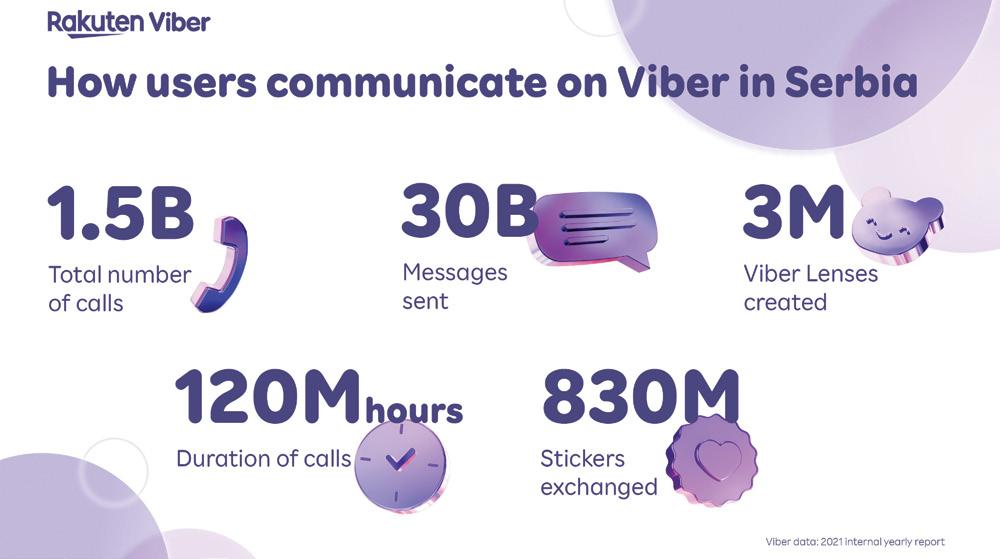
In fact, it is a part of our longterm strategy to become a super app–giving as many services with
added value as possible through out our users’ day and providing brands with more opportunities to interact with their customers in the native environment. We want to let users receive up-to-date information about their courier packages, order taxi, food, have seamless and transparent ways to pay for services, and exchange money with other peers – all di rectly on Viber.
For example, we recently launched payments on Viber–safe and secure cross-border digital pay ment solutions. It is yet another step towards our goal of increasing Viber’s utility and making it an ab solutely essential app for users.
What is the future of commerce (shopping industry)?
Sell in every channel where your customers are ready to buy
The transformation of the retail industry has had a major impact on the way all businesses operate. It has made it more important than ever for companies to have a strong online presence and to be able to reach their audience through multiple channels and be available at any touchpoint where a customer might be ready to make a purchase.
What’s more, e-commerce is now di versifying into additional ways of shop ping: mobile commerce, conversational commerce, and social commerce.
By using modern tools, companies can provide a more convenient and personalized shopping experience for customers, and not only increase sales but help build a close relationship with the audience, too.
C-commerce (Conversational Com merce) is still relatively new, but more and more brands start using it to in crease their sales and it is expected to grow rapidly in the coming years. It is a new way of shopping that‘s emerg ing thanks to the rise of messaging apps like Viber. Conversational com merce allows customers to message businesses directly to ask questions, get recommendations, and make pur chases without ever having to leave the app. This new way of shopping is convenient, personal, and fast, and it‘s changing the way we think about e-commerce in general.
We also see that consumers today rely more on real conversations rather than the regular one-way messages, contributing to the rise of conversa tional commerce. As a result, we saw a considerable interest in conversation al Viber business messages: in Serbia alone, there was a 136% growth in the first half of this year.

OUT OF 6,5 hOUrS SpENT by USErS ON ThE INTErNET, mOrE ThAN hALF OF ThAT TImE IS SpENT ON mObILE
61 COrp Or ATE
Air Serbia will participate in the program of the Government of Serbia entitled “My First Salary” created to encourage the employment of young people without prior work experience. The national airline invites candi dates to apply for the competition, which is open until 31 October 2022, in order to acquire industry-specific knowledge, skills, and competencies necessary for work through practice and, thus, significantly improve their employment opportunities.
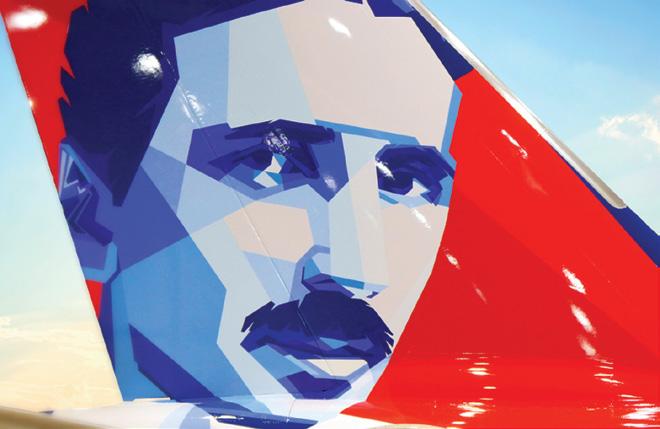
“We are proud to be opening Air Serbia’s doors for the third consecu tive time with the desire to enable program participants to complete a 9-month-long internship at our company. Through the My First Salary pro gram, we offer unemployed young people up to the age of 30, with second ary and higher education, the opportunity to apply for one of 59 positions at our company. Last year, almost 500 candidates applied for an internship at Air Serbia, of which 30 were hired, while 12 of them were employed in our company after completing the program. We hope that in 2022 we will attract an even larger number of those interested who want to get their first work experience with us,” said Milica Netković, General Manager Peo ple and Performance at Air Serbia.
Interested candidates can apply on the project’s official website. After they are interviewed, they will be able to, over nine months, gain experi ence in the following organisational units of Air Serbia: Corporate Affairs, Legal Affairs, Marketing, e-Commerce, HR, Transport, Procurement, Flight Operations, Aviation Security, Safety and Compliance, Technical, Ground Handling, Air Serbia Ground Services (ASGS), IT, Finances, Cargo, Catering, Sales, Passenger Service Systems (PSS), Revenue Management and Net work Planning and Scheduling.
The My First Salary programme is conducted by the National Employ ment Service, with support from the Ministry of Labour, Employment, Veteran and Social Affairs, Ministry of Finance, Ministry of Youth and Sports, Office for IT and e-Government, and the Chamber of Commerce and Industry of Serbia.
5 oct 2022
The conference “Road to recovery: The future of the global supply chain” was organized by the Italian Confindustria Serbia, the Slovenian Business Club and the Chamber of Commerce of Serbia with the aim of improving economic relations between the three countries and raising the transport, industrial and logistics sectors to a higher level.
Through participation in a large logistics conference, within 4 pan els, experts and renowned international experts from various fields had the opportunity to exchange opinions through an open conversation on the topic of the overall impact of the pandemic and current geopolitical events on world logistics, as well as the possibility of further economic development, focusing to questions concerning new rules in business, in frastructure, the current approach in human resource management, new technologies and specific situations for the industry.
Ananas e-commerce, a marketplace based in Serbia, bought 100% ownership in the Mac edonian company Vebs pot from Payten. In this way, Ananas became the owner of the online shopping brands Group er.mk and Paopao.mk.

On the Macedonian market, Grouper.mk is known for its business of selling vouchers for ser vices, while the recently launched site Paopao. mk is a marketplace for online purchase of prod ucts. The acquisition of Grouper, as the leading e-commerce player on the Macedonian market with almost 300,000 us ers and 3,000 merchants, represents Ananas’ first step towards regional expansion. This acquisition will enable Ananas to quickly penetrate the Macedonian market with the introduction of Ananas’ new concepts and novelties.
In less than a year, Ananas.rs was visited by more than one million customers. Launching Ananas, the Delta Holding company announced its ambition to create a regional giant in online trade and its willingness to invest about 100 million euros in this project in the first five years.
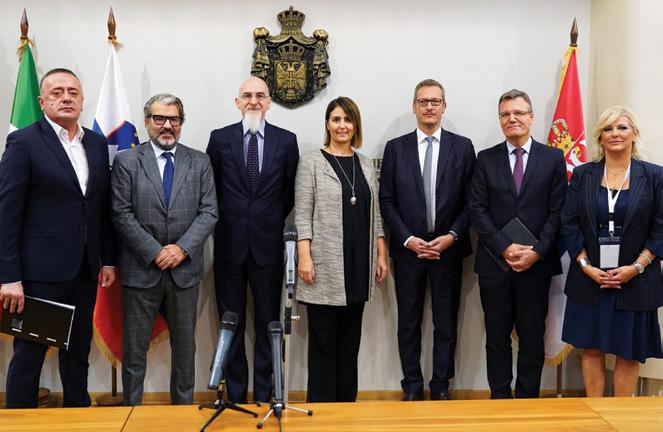
“The market in Macedonia, customers, but also online sellers, with this acquisition get a safe, loyal and long-term partner, ready to invest in the development of this business, but also the development of the entire ecommerce in Macedonia. We have a plan to offer the largest marketplace in this country with a wide range of products, safe and fast delivery, secure payment and many innovative solutions that we now know only in more developed markets”, said Marko Carevic, CEO of Ananas.
At the start of their business, Ananas announced that the Serbian mar ket is only a starting point, and that the ambition of the shareholders and the company itself is for this marketplace to appear on the markets of the Western Balkans region.
“With the reputation and strength of Delta Holding behind us, but also with the innovative business model brought not only by Ananas but also by its global partners such as Boston Consulting Group, HTEC and others, we are confident that we will bring a new shopping experience to the cus tomers of the entire region, and to the sellers of a reliable partners and a place where they can implement the most ambitious business plans”, says Marko Carević.
10 oct 2022
ananaS BEcamE tHE ownEr of tHE groupEr and paopao wEBSitES in macEdonia
‘road to rEcoVErY: tHE futurE of tHE gloBal SupplY cHain’ confErEncE
19
oct 2022
air SErBia participatES in tHE mY firSt SalarY program for tHE tHird timE
62 www.diplomacyandcommerce.rs bUSINESS NE wS
MTU Maintenance Serbia officially opened its new facility in Nova Pa zova near Belgrade. The ceremony took place in the presence of Alek sandar Vučić, President of Serbia. In addition, the German ambassador to Serbia, Anke Konrad, as well as representatives of the aviation in dustry were in attendance.
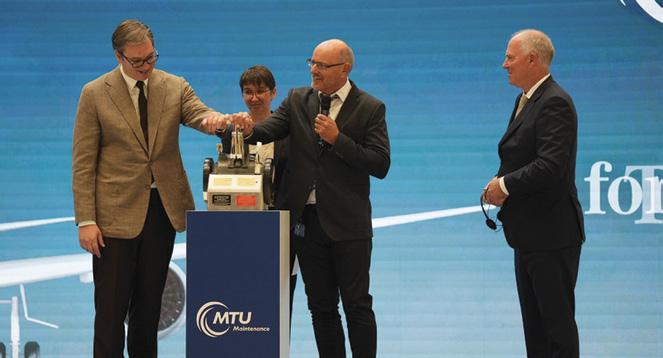
MTU Maintenance Serbia d.o.o. is a fully owned subsidiary of MTU,
a leading engine manufacturer and one of the world’s largest providers of aircraft engine maintenance ser vices. The site in Nova Pazova will become a vital part of the global MTU Maintenance network and is set up for the repair of engine parts. With its specific high-tech compe tences, MTU Maintenance Serbia will expand MTU’s piece part repair network significantly.
3 oct 2022
tHE Start-up EcoSYStEm in SwitZErland
On Monday, October 03rd, 2022, the Swiss-Serbian Chamber of Commerce SSCC held a working lunch entitled ’’The start-up ecosystem in Switzer land: key success factors’’ which was co-organised with SSCC membercompany ’’Holycode’’.
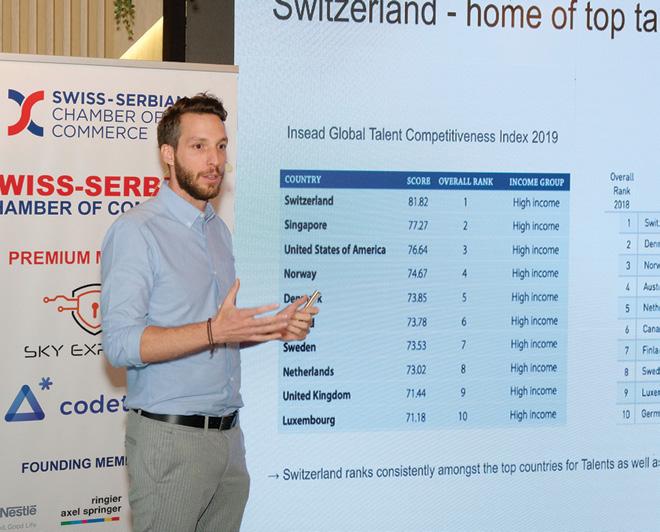
Mr. Majo Micovic, SSCC President, said: ’’The 2021 Global Innovation Index of the World Intellectual Property Organization (WIPO) ranked Swit zerland again as world’s most-innovative economy. Small and mediumsized enterprises form the backbone of the Swiss economy. One of their key success factors is their ability to innovate and adapt – something that startups, often at the very forefront of innovation, do on a daily basis. The proximity between higher education institutions, research, and industry contributes to developing an innovative and dynamic start-up ecosystem in Switzerland.’’
The presentations held by Holycode co-founders: Mr. Laurent Decrue (Co-CEO Holycode Group), Mr. Nenad Nikolic (Co-CEO Holycode Group) and Mr. Milan Nikolic (CEO Holycode Serbia) focused on the evolution of the Swiss Startup Ecosystem, the reasons for its success as well as the chal lenges ahead and which technologies might help us solve it.
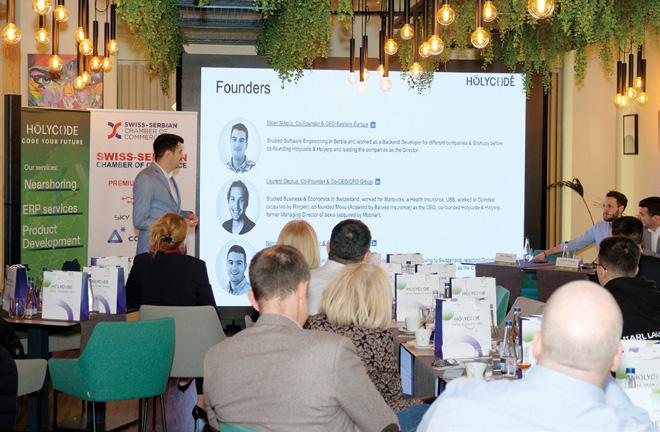
oct 2022
YEttEl nEtwork 100% grEEn
Yettel is the first mobile network in Serbia that uses only energy from re newable sources, which is testified to by a certificate issued by the compe tent institutions of the Republic of Serbia. The Company has also launched the Eco bonus, a new digital service, by the activation of which the cus tomer select to have 4.6 kg of plastic and 2.2 kg of paper/cardboard waste to be recycled on their behalf on the monthly level.
“At Yettel, we are creating a balanced future, with a focus on balance with nature. Our goal is to minimize the negative influence on the envi ronment and help our customers to do the same. Our network is 100% green, and from the recycling program, in which we have recycled almost 350 thousand devices, we learned that the customers are very willing to join in when you offer them a concrete solution”, says Mike Michel, Yettel CEO.
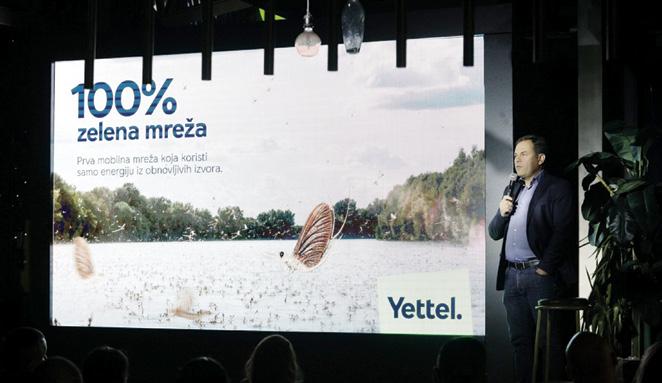
The assessment* is that an average citizen of Serbia generates monthly 4.6 kg of plastic and 2.2 kg of paper/cardboard waste (a total of 6.8 kg). Yettel, together with the operator authorized for waste management, is of fering customers to collect and recycle on their behalf the specified waste quantity. All customers have to do is to activate the Eco bonus in the Yettel application, either as a new digital service within their tariff packages or as a separate one. That way, even if they don’t physically participate in the entire process, customers give a direct contribution, i.e. “bonus” for envi ronmental protection.
Mr. Laurent Decrue said that the event was a great possibility to learn more about the Swiss Startup Ecosystem and discuss which future technol ogies would shape the growth of it. ‘’We hope that today’s discussions will lead to knowhow transfer between the Serbian and Swiss participants.’’
Mr. Nenad Nikolić stated the following: “This was a great opportunity to exchange on the topic of the Swiss Startup Ecosystem and hopefully in spire new ideas on how to support innovative founders in Serbia.”
Also, Mr. Milan Nikolić emphasized that the working lunch provided a chance to participate actively in networking with companies from differ ent industries in Swiss market, and with clients and friends of Holycode.
18
7 oct 2022
mtu opEnS itS nEw mro facilitY in SErBia
63 bUSINESS NE wS
of BraZil’S
Brazilian chamber music and jazz group Trio in Uno performed the “Brazil in Zemun” concert in the Ceremonial Hall of the Zemun Municipality building. The musical performance marks the beginning of the celebrations in Serbia for the Bicentennial of the Independence of Brazil. The main ceremony was held in Jugoslovenska Kinoteka the day after,
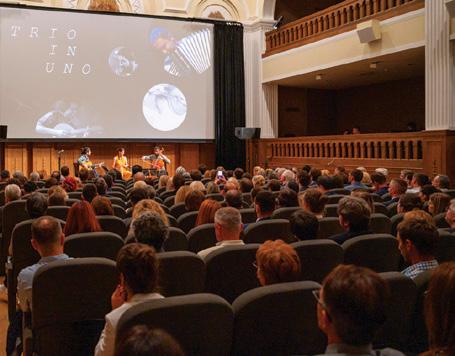
on Monday, 5th September when a distinguished guest from Belgrade diplomatic corps had a chance to enjoy Brazilian modern composers performed by Trio in Uno. The Embassy of Brazil in Belgrade organised a reception after the concert in Hotel Square Nine where the famous Brazilian cocktail caipirinha was served.
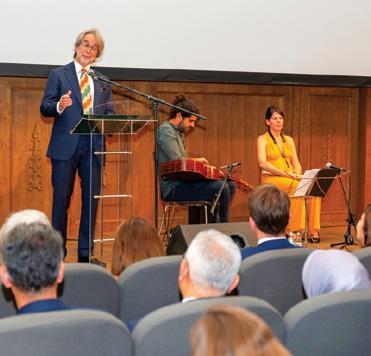
The President of the Senate of Belgium, H.E. Mrs. Ste phanie D’Hose, and the Vice-President of the Govern ment of Belgium, Petra De Sutter, visited Serbia and participated in the International Human Rights Confe rence as part of Europride 2022 that was held in Bel grade. On this occasion, the Ambassador of Belgium, H.E. Cathy Buggenhout, organized a cocktail dinner for
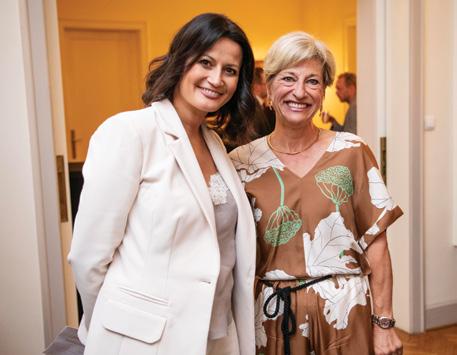

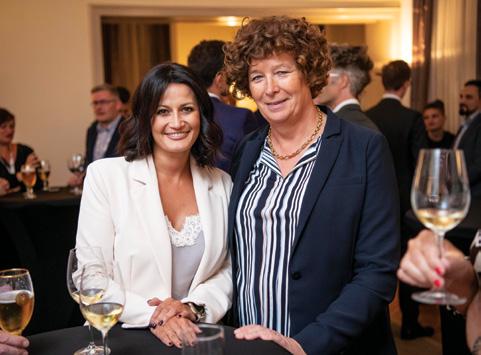
dignitaries from the diplomatic corps and public life of Serbia at the Embassy of Belgium in Belgrade. During her visit to Belgrade on the occasion of the EuroPride 2022 International Human Rights Conference, during which she spoke, the President of the Belgian Senate, H.E. Mrs. Stephanie D’Hose, met with Serbia’s National Assembly Speaker, H.E. Dr Vladimir Orlic.

On September 13th, 2022, continuing the tradition with the desire to bring together representatives of various businesses and industries in a pleasant and informal atmosphere, 13 bilateral business associations present in Serbia organized once again the International Networ king Cocktail at the beautiful premises of the Metropol Palace Hotel in Belgrade. This year’s International Networking Cocktail was attended by companies from the Belgian Serbian Business Association, CANSEE Canadian-Serbian Business Association, Croatian Business Association, Dutch-Serbian Business Associa

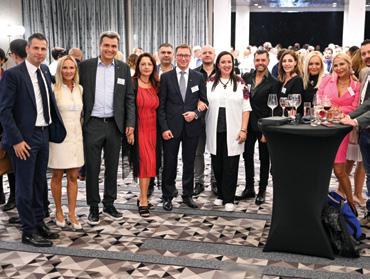
tion, French-Serbian Chamber of Commerce, GermanSerbian Chamber of Industry and Commerce, Hellenic Business Association of Serbia, Italian-Serbian Chamber of Commerce, Japanese Business Alliance of Serbia, Nordic Business Alliance, Slovenian Business Club, Swiss-Serbian Chamber of Commerce, and Business Club UAE & Serbia. The guests were greeted by the chambers’ representatives and a welcome speech on behalf of all present business associations was delivered by Ms. Fanina Kovacevic-Popaz, Executive Officer of the Hellenic Business Association of Serbia.
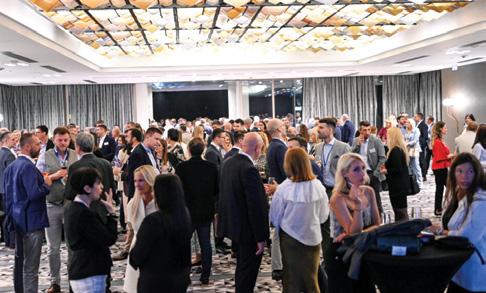
SEpt. 05 BicEntEnnial
indEpEndEncE
SEpt. 13
a HigH dElEgation of BElgium ViSitEd BElgradE on tHE occaSion of EuropridE
SEpt. 13 intErnational nEtworking cocktail
64 www.diplomacyandcommerce.rs pEOpLE AN d E VENTS
The Embassy of Mexico in Serbia organized a celebration on the occasion of the 212th anniversa ry of the beginning of the Mexican Independence Movement. At the residence of the Ambassador of Mexico, H.E. Carlos Felix Corona, a reception was held for representatives of the diplomatic corps and public figures from Serbia, Bosnia and Herzegovina,
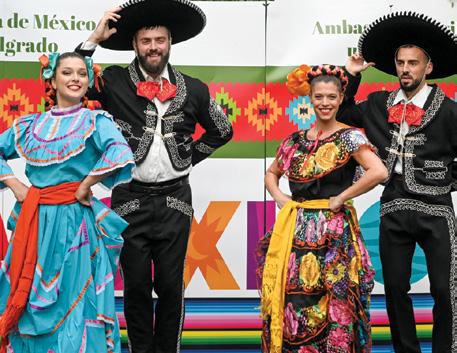

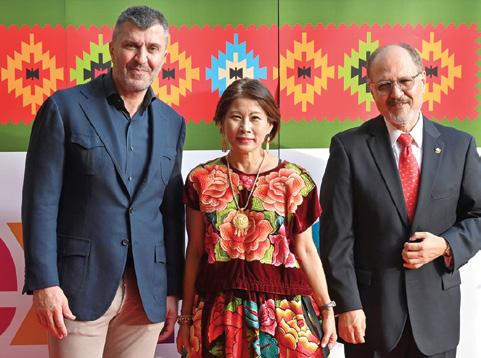
North Macedonia and Montenegro. The Mexican War of Independence began on September 16, 1810 and lasted until 1821, after which this country won independence from the Spanish colonial authorities. The date of the beginning of the movement and the war of independence is celebrated as a national holiday of Mexico.
at
The Embassy of Malaysia in Belgrade, in collaboration with the Hyatt Regency Belgrade, Tourism Malaysia and Turkish Airlines, organised the one-week event themed “To Know Malaysia Is To Love Malaysia”. From 18 September at the Hyatt Regency Belgrade, visitors can enjoy the traditional Sunday lunch, photo exhibi tion, fashion show, evening of Malaysian music and Block 21, where they will be presented with the oppor tunity to savour the flavours of authentic Malaysian cuisine. Our guest, Chef Dato’ Ismail Ahmad, who will prepare some of the most famous Malaysian culina
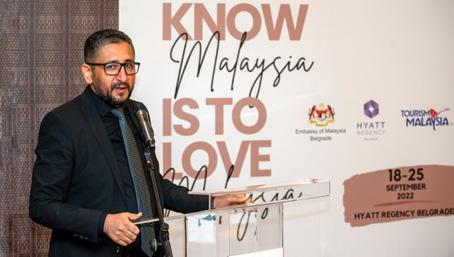
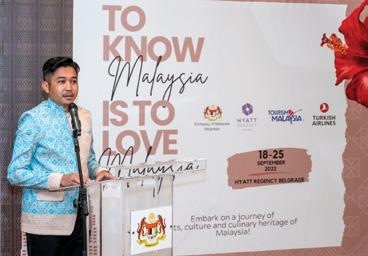
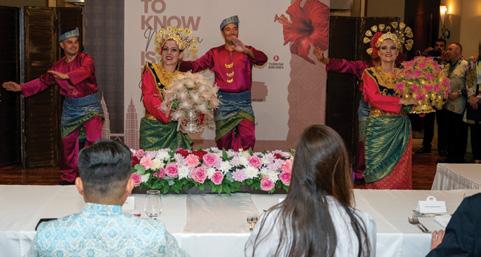
ry specialities, awaits you at the Metropolitan Grill restaurant on 19, 20 and 24 September 2022. The event will end with a traditional Sunday lunch at the Metro politan Grill restaurant on 25 September this year. “To Know Malaysia Is To Love Malaysia” Week brings all the beauty of Malaysia to the Hyatt Regency Belgrade and enables all the visitors to enjoy the charms of this culturally rich and diverse country. For more informati on about the event, visit the link: Fine Dining Deals and things to do in Belgrade | 5 Star Restaurant Offers in Belgrade: Hyatt Restaurants
In the garden of the Museum of African Art, on Sun day, September 18, 2022, the manifestation “Diversity of cultures between the people of Libya and Serbia – relations between people” was held and organized by the Embassy of Libya. In front of numerous visitors, a rich cultural and artistic program was opened by Dr Marija Aleksić, director of the Museum of African Art, Mohamed Nabhan, head of the Group of Ambassa dors of Arab countries in Belgrade, and Mohamed Galbun, ambassador of Libya. During the all-day program, folk songs and dances performed by a
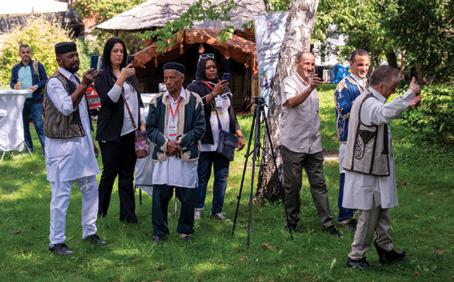
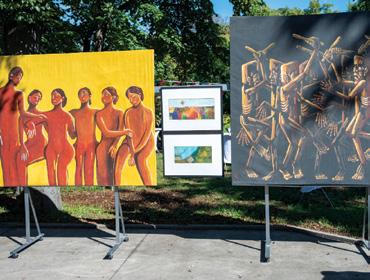
Libyan folklore group were presented in the garden of the Museum of African Art, a Serbian kolo was played, students of a Libyan school sang the Libyan and Serbi an national anthems, and numerous visitors were able to get acquainted with traditional Libyan crafts and art. , to try the gastronomic specialities of the national cuisine, as well as to see authentic Libyan clothing and other products. This unusual gathering was a celebra tion of the cultural wealth of our two countries and an indication that dialogue between cultures plays a key role in achieving peace and sustainable development.

SEpt. 15
mExico in BElgradE markEd 212 YEarS SincE tHE BEginning of tHE moVEmEnt for indEpEndEncE
SEpt. 16
‘to know malaYSia iS to loVE malaYSia’ wEEk
SEpt. 18 daY of liBYan culturE
mau
65 pEOpLE AN d E VENTS
madlEna art palacE opEnEd in BElgradE
The 7,000-square-meter Madlena Art Palace was opened in Dedinje in Belgrade according to the idea of Madlena Zepter as a new temple of culture for all kinds of art, from exhibitions, chamber con certs and performances, and film screenings. The palace was opened for the 50th anniversary of the marriage of Madlena and Filip Zepter, and Mad
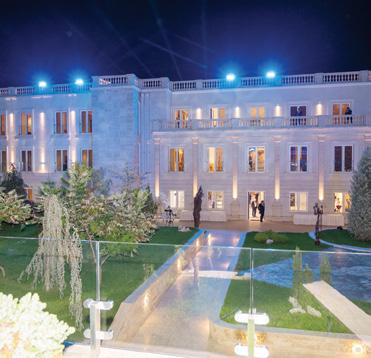
lena recalled that thanks to the business success of the “Zepter International” company, the two of them had built and donated many ventures to their people. As part of the ceremony, the exhibition of the Italian artist Carla Tolomeo was opened in the gallery space, which was the first cultural event of the Madlena Art Palace.

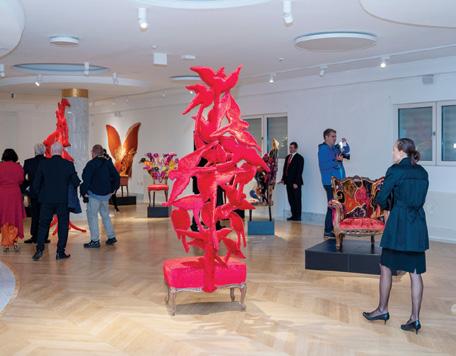

Slovakia Constitution Day is celebrated on September 1 to mark the anniversary of Slovakia’s adoption of its constitution. Known as Deň Ústavy Slovenskej Repub liky amongst the people of Slovakia, the day is a public holiday in the country.
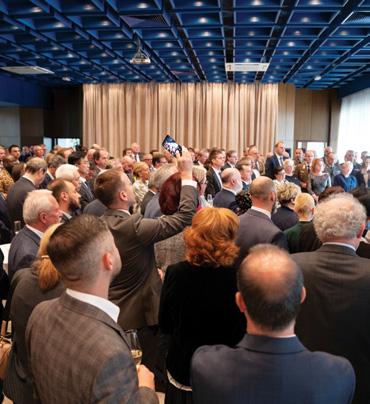
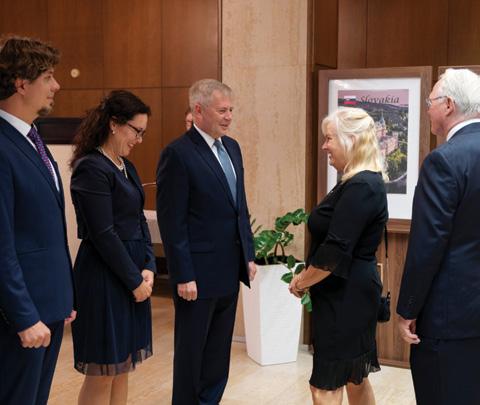
On the occasion of the Constitution Day of the Slovak Republic, the ambassador of this country in Serbia, H.E. Fedor Rosoha and his wife Jana, celebrated this holiday in their residence in Belgrade.
In the organisation of the Embassy of Italy and the Fabrika Agency, last night in the crowded Residence of the Italian Ambassador, His Excellency Luca Goria, in compliance with epidemiological measures, a fashion show of Renato Balestra’s new brand, “BALEST RA,” was held, which was founded by his daughters Federica and Fabiana and granddaughter Sofia. The Reload collection for the fall/winter 22/23 season was shown at the show. At the end of the show, six selected fairy-tale high fashion models by Renato Balestra


were shown, after which Federica Balestra bowed and addressed the audience with huge applause. The surprise of the evening was the opera diva Jadranka Jovanović, Renata Balestra’s friend and his favourite “Cinderella”, who performed two opera arias and ope ned this exceptional fashion event in the most beautiful way possible, which was attended by numerous media, celebrities, Ambassadors and other distingu ished guests who made this evening special with their presence.

SEpt. 19
SEpt. 21
SloVakia conStitution daY cElEBratEd in BElgradE
SEpt. 28
rEnato BalEStra’S nEw Brand BalEStra faSHion SHow in
BElgradE
66 www.diplomacyandcommerce.rs pEOpLE AN d E VENTS
of cYpruS
in
His Excellency Demetrios Theophylactou, Ambassador of the Republic of Cyprus to Serbia, held a reception in his residence in Belgrade last night on the occasion of the celebration of the Independence Day of Cyprus. The reception was attended by members of the diplomatic corps and representatives of the Ser
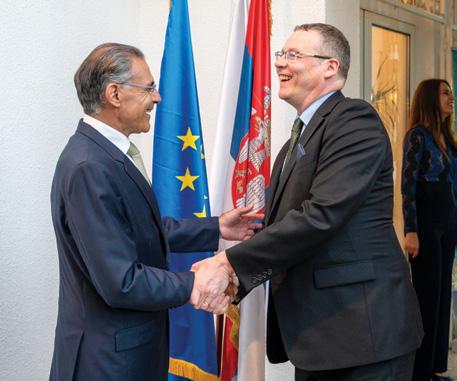
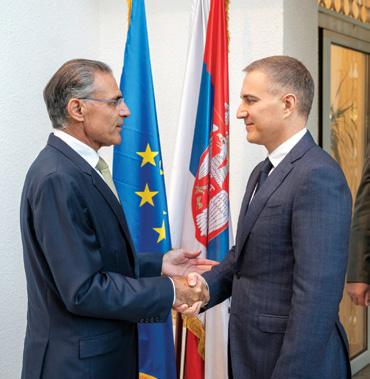
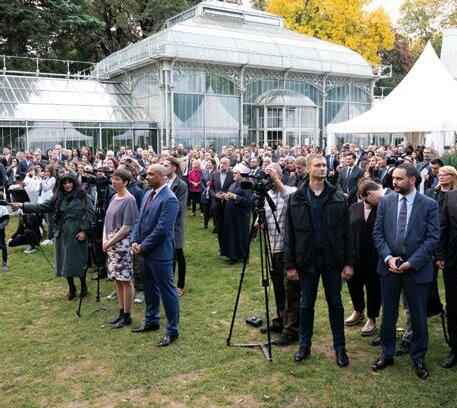
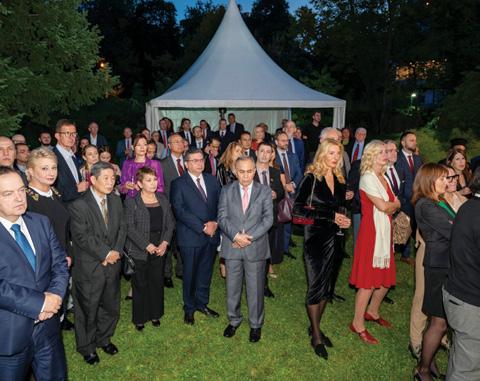
bian political and cultural elite. Cyprus became an independent country on August 16, 1960, after being a British colony for decades. However, it is too hot on the island in mid-August. This is why Cypriots do not celebrate their independence day on August 16 but on October 1.
After the concert in Novi Sad (Syna gogue, Sunday, October 2 at 7:30 p.m.), the Belgrade concert took place on Mon day, October 3, at 8 p.m., in the Terazije Theater. With this concert, the Serbian-

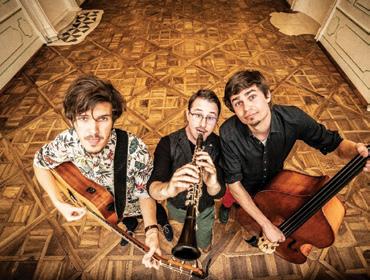
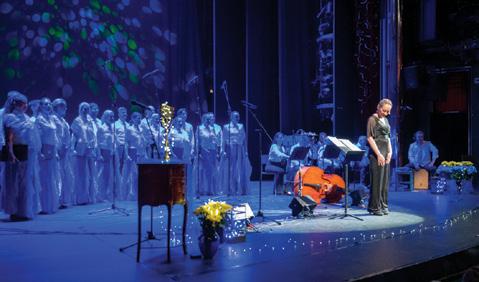
Jewish Singing Society (SJPD) marks the Day of Euro pean and, at the same time, Jewish cultural heritage and celebrates the 146th anniversary of its existence. As usual, the choir offers an original concert with a unique approach and program that sends a message of tolerance and peace, protects from oblivion and promotes Jewish Ashkenazic (Klezmer) music, which is almost never performed in our country. That is why this musical evening is of special importance. The selected program draws attention to the forgotten Yiddish
language and shows a variety of Jewish music coloured with emotions, and images of life, joy and pain, also points out the cultural differences of the Jewish people (Sephardi, Ashkenazi). At the same time, it sends a message of understanding, closeness, and a vision of a world where differences do not separate us but bring us closer together. The concert was supported by the Embassy of Germany, the Secretariat for Culture of the City of Belgrade, the Austrian Cultural Forum, the Embassy of Israel, Informatika, Neofyton, and Rauch.
The Day of German Unity celebrates to mark the unifica tion of Germany in 1990. On that occasion, the Embassy of Germany in Serbia organised a reception in the Bo tanical Garden in Belgrade. Ambassador Anke Konrad said that Germany is grateful to all partners around the world for offering them a hand of reconciliation after two
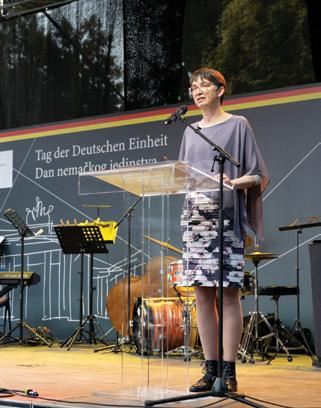
devastating wars and the suffering of millions of peop le. “We are grateful that former enemies have become partners and close friends,” said Konrad, addressing the reception attended by Serbian Prime Minister Ana Brnabić, Government Ministers Jadranka Joksimović, Maja Gojković, Nenad Popović and many others.
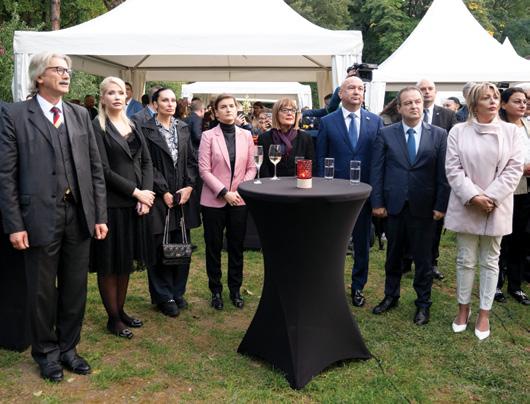
SEpt. 29 indEpEndEncE daY
cElEBratEd
BElgradE
oct. 03
‘laila toV 22 –good nigHt’ concErt in tEraZiJE tHEatEr
oct. 04 daY of gErman unitY markEd in JEVrEmoVac Botanical gardEn
67 pEOpLE AN d E VENTS
A million dollars in aid was collected to fight human trafficking and help victims. UNITAS, an award-winning international foundation dedicated to the prevention of human trafficking and helping victims, organized a humanitarian evening with celebrities in New York for the fifth time. At that event, one million dollars was collected for the prevention of trafficking, primarily for educating young people about the risks and possibilities of prevention, training school staff and others who work

with children, as well as supporting victims through the rapy, mentoring and housing. British pop singer Natasha Bedingfield, American singer Chris Cabe, famous violinist David Aaron Carpenter performed at the charity Gala dinner. An auction of works of art was also held. In additi on to highlighting the importance of the ongoing mission in the fight against human trafficking, pioneering efforts in education about violence prevention and empower ment through self-defense were also pointed out.
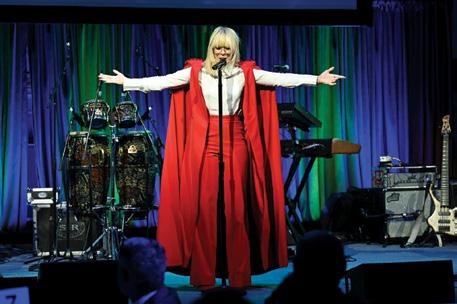

On the occasion of Spain’s National Day, the ambassa dor of this country to Serbia, Raul Bartolome Molina, hosted a reception at the Hyatt hotel in Belgrade. The reception was attended by numerous representatives of the Serbian political and cultural elite, as well as
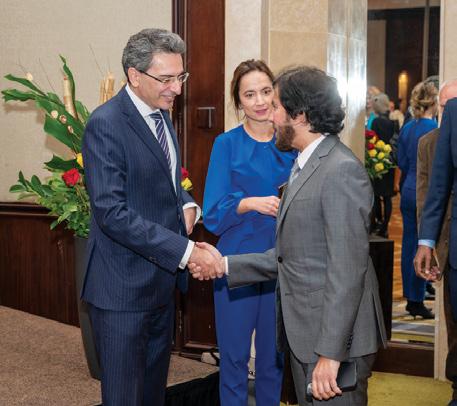
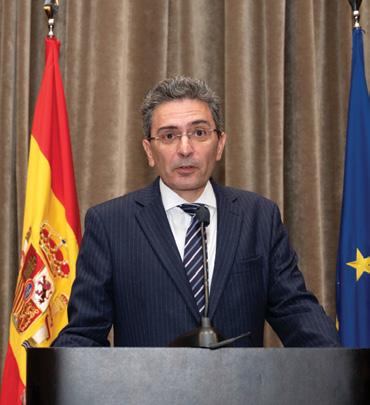
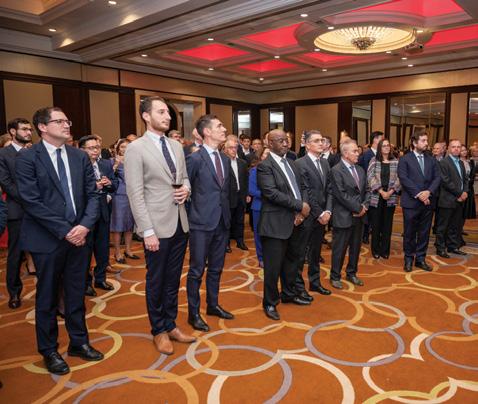
members of the diplomatic corps. Spain’s National Day is celebrated on October 12, and the holiday is known as “Dia de la Hispanidad” it celebrates the arrival of Christopher Columbus in the New World, and it is also the Day of the Armed Forces of Spain.
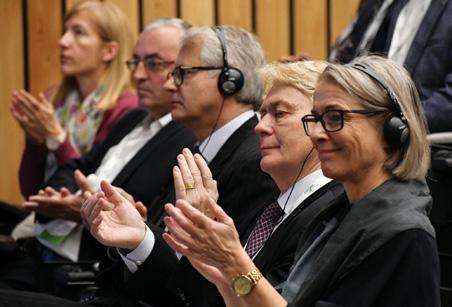
A conference called “Sustainable Agriculture” was held in the Science and Technology Park Novi Sad, orga nized by the embassies of Denmark, Finland, Norway and Sweden. The conference was organized as part of the “Nordic Green Project - Sustainable Solutions for Serbia” initiative, jointly implemented by the Nordic embassies in Serbia. Four conferences dedicated to different sustainability topics are planned and each of the Nordic embassies will have a special responsibility in presenting them. The first conference on sustainable
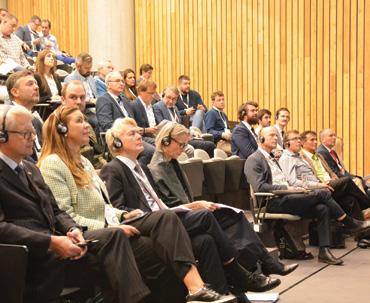
agriculture, sponsored by the Embassy of Denmark, aims at partnership for sustainable agriculture. The opening of the conference was attended by repre sentatives of the provincial secretariat for agriculture, water management and forestry, local governments, business associations, academic communities, as well as the ambassadors of the four Nordic countries: Susanne Shine of Denmark, Kimmo Lähdevirta of Finland, Jern Eugen Jelstad of Norway and Sweden’s Annika Ben David.
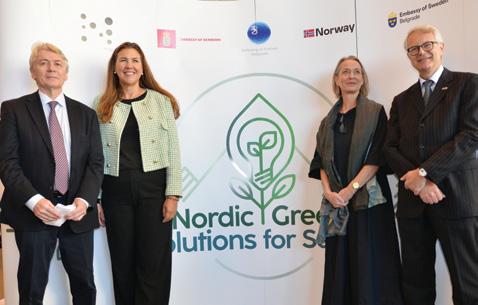
oct. 04 tHE fiftH
gala dinnEr
waS
organiZEd BY tHE Humanitarian organiZation unitaS
oct. 11 Spain’S
StatEHood daY waS cElEBratEd in
BElgradE
oct. 18 tHE SuStainaBlE agriculturE confErEncE organiZEd BY tHE EmBaSSiES of tHE nordic countriES waS HEld in noVi Sad
68 www.diplomacyandcommerce.rs pEOpLE AN d E VENTS
we walked, and we always will!
The EuroPride Week in Belgrade consisted of more than 130 events – the international human rights conference, art exhibitions, theatre plays, performances, shows, film screenings, concerts, and informal gatherings
Commissioner for Human Rights; Gordana Čomić, Minister for Hu man and Minority Rights and Social Dialogue in Serbia, as well as Ana Brnabić, Prime Minister of Serbia. The conference created a space for learning, discussion, sharing experiences and building plans for creating a better tomorrow.
the largeSt and moSt Important parade In belgrade yet
Even one day before the sched uled Parade, organisers of Euro Pride were not confident that it would take place due to the ban that was imposed earlier by police. But, thanks to tireless work from the organisers, numerous appeals and searching for solutions, a new route for the walk was approved.
On Saturday, 17 September, par ticipants started gathering on the streets of Belgrade carrying rainbow umbrellas, flags, and signs. The heavy rain didn’t stop people from going out on the streets to protect human rights and stand up for love and equality. Unfortunately, several incidents took place after the parade as participants of EuroPride were walking back to their hotels. Several activists were attacked. Fortunately, no one was seriously injured. We are monitoring the situation and keeping in contact with the activists to ensure their well-being.
e
uroPride 2022 in Belgrade has come to an end. With out a doubt, it has become a historic event for the country and region. Despite heavy rain on Satur day, 17 September, almost 10 000 people gathered on the streets of Belgrade to march together for soli darity and love.
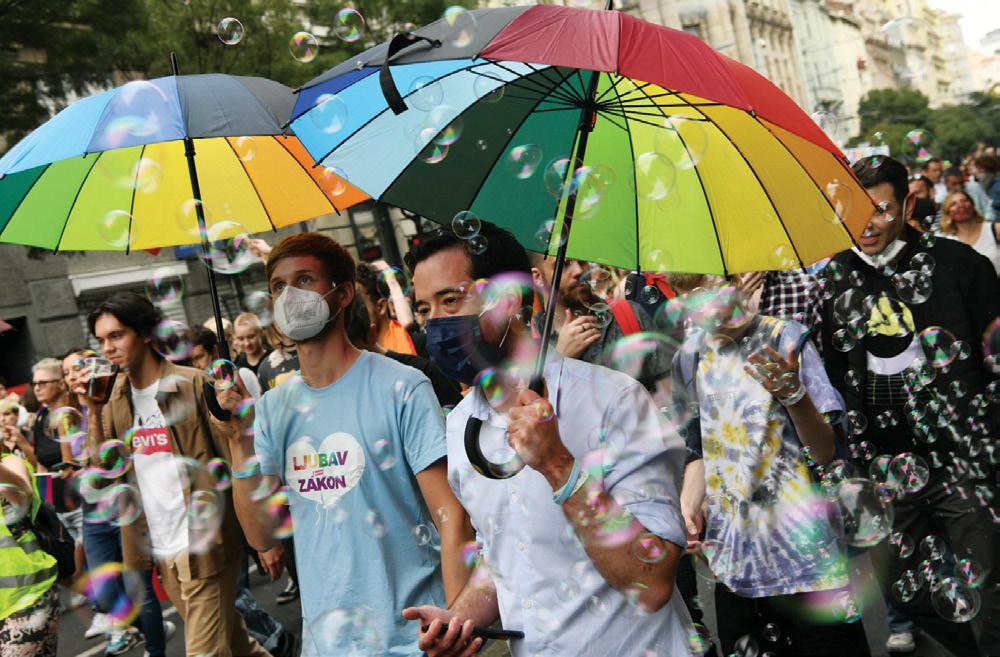
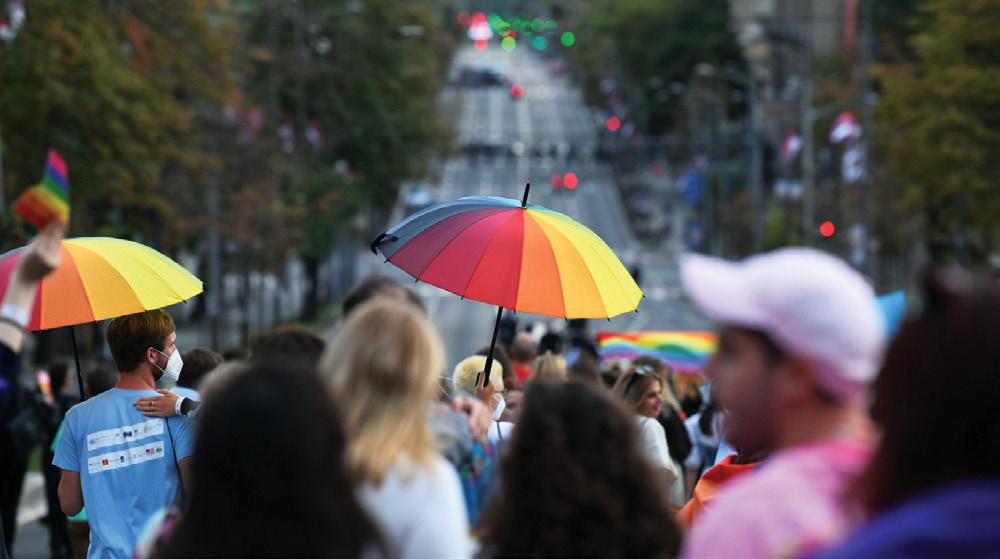
europrIde week a Story to be proud of
The parade is always the high light of any Pride festival; no Pride can be imagined without it. But apart from the finale, the EuroPride Week in Belgrade consisted of more than 130 events – the international human rights conference, art ex hibitions, theatre plays, perfor mances, shows, film screenings, concerts, and informal gatherings
InternatIonal human rIghtS conference
The International Human Rights Conference, together with the pa rade, became one of the most sig nificant events of Pride Week. The 4-day event was organised by Civil Rights Defenders and brought to gether more than 1000 participants from all parts of the world. Among
those are members of the European Parliament, officials from EU states, and Ambassadors. The conference
was also visited by Helena Dalli, Eu ropean Commissioner for Equality; Dunja Mijatović, Council of Europe
This year, EuroPride in Belgrade showed a fight that many organisa tions, activists and LGBTI+ persons are going through. But it has also shown the significance of support and solidarity. We at Civil Rights Defenders are proud to have helped to organise EuroPride 2022. The event has been a major step for LG BTI+ rights in the Balkan region and beyond.
ThE pArAdE IS ALwAyS ThE hIGhLIGhT OF ANy prIdE FESTIVAL; NO prIdE CAN bE ImAGINEd wIThOUT IT. 69 COmm ENT source: civil rights Defenders
Photo: Belgrade Pride / Vesna Lalic
Photo: Belgrade Pride / Vesna Lalic
FIrST dAy OF AmErICA hELd IN bELGr AdE
The conference had the insti tutional support of the Ministry of Culture and Me dia of the Republic of Serbia, the companies UGT Renewables and Hyundai Engineering as general sponsor, and with the support of Millennium Resorts, Public Utility Company Beogradske elektrane and N2Growth.
The special topic of the confer ence is the state and perspectives of bilateral relations between the Republic of Serbia and the United States of America, and in addi tion, the participants discussed security, business, energy and culture.
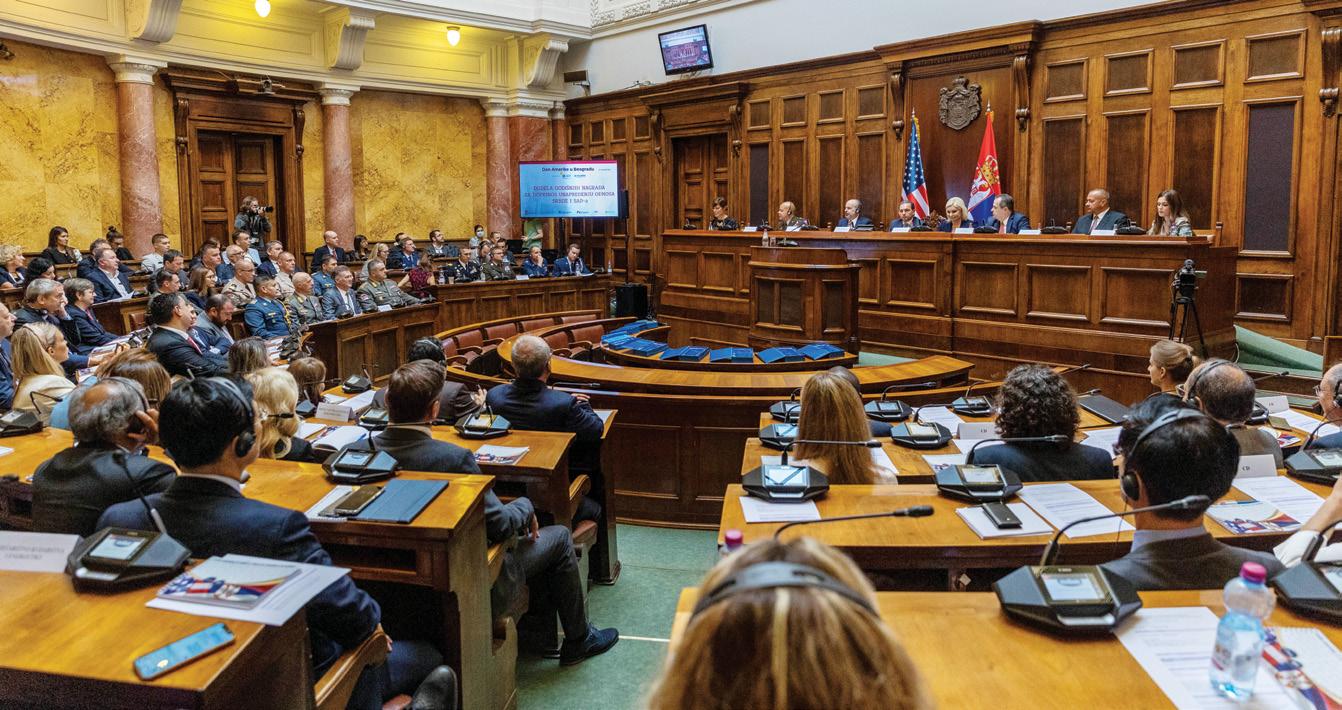
John Ginkel, Deputy Head of Mission at the US Embassy in Bel grade, addressed the conference participants, reminding them that the US considers Serbia a stable partner.
„The USA will continue to sup port Serbia on its way to Euro-At lantic integration“ - said Ginkel.
„Working together, side by side, we create a safer world,“ said Gen eral Harris from the Ohio National Guard, and he pointed out that the cooperation between the Ohio Na tional Guard and the Serbian Army has been ongoing for 15 years.

Zorana Mihajlović, Deputy Prime Minister of the Republic of Serbia and Minister of Mining and Energy officially opened the event. She par ticularly emphasized the need to sign a strategic partnership agree ment, which she said we should work on and move towards signing such an agreement.
As a special note regarding our bilateral relations a special awards were given to those who continu ously work on improving the coop eration between Serbia and USA.
The first „ Day of America in Belgrade” organized by the Congress of Serbian-American Friendship and Diplomacy & Commerce magazine was held In the National Assembly of the Republic of Serbia, then in the Museum of Contemporary Art, on Friday 09.09.2022. “ThIS IS ONE OF ThE rArE mOmENTS IN hISTOry whEN wE hAVE A wIdE GENErATIONAL dIVErSITy IN ThE GrOUp OF hIGh mANAGEmENT pOSITIONS ON ThE LAbOr mArkET 70 www.diplomacyandcommerce.rs CONFE r ENCE Read This on Web
The Security panel gathered together Deputy Chief of General Staff, Serbian Armed Forces Lieuten ant General Petar Cvetković, Ohio National Guard Colonel Jonathan Stewart, Michael Kelleher, Political Advisor of the US Embassy in Serbia, and Zoran Jonevski, Macedonian diplomat and former Minister of Defense in the Government of North Macedonia. They put in perspective where we’re going regarding the state of security in following years.
Lieutenant General Petar Cvetković stated in his address that there is plenty of room for im proving cooperation. “Our special interest is joint participation in in ternational peace missions. We are very close to an agreement on joint participation in the peacekeeping mission in Sinai”, said Cvetković.
He spoke about the training of special units for peacekeeping mis sions, which he said is one of the most significant aspects of the coop eration between the Serbian Armed Forces and the Ohio National Guard.
“We (Serbia and the USA) have developed friendship, but now we have to raise it to the level of part nership”, said Stewart.
SerbIa IS becomIng a global hub In the It InduStry
The business panel was moder ated by Nebojša Bjelotomić, direc tor of the “Digital Serbia” Initia tive, while Dragana Vujko, senior manager for corporate affairs of Philip Morris International, Mihailo Vesović from the Chamber of Com merce and Industry of Serbia, Nikola Avram, director of the Millemium Resorts project, and Teodora Ćosić , managing partner of N2Growth pre sented their industries.
Nikola Avram, director of the Mil lenium Resorts project, spoke about his company’s plans for the develop ment of the Vranjska Spa.
“In recent years, we have wit nessed the improvement of the investment climate in Serbia, as well as cooperation between Ser bian and American companies. An example of this is the cooperation between Millennium Resorts and Marriott International. Thanks to this cooperation, the south of Ser bia, namely Vranjska Banja, will get two prestigious hotels, the Westin and Kralj Petar I by Autograph Col lection, which will put this destina tion back on the map of European spa tourism. The entire investment is worth 90 million euros, partly because of its business impact, but also because of the creation of new
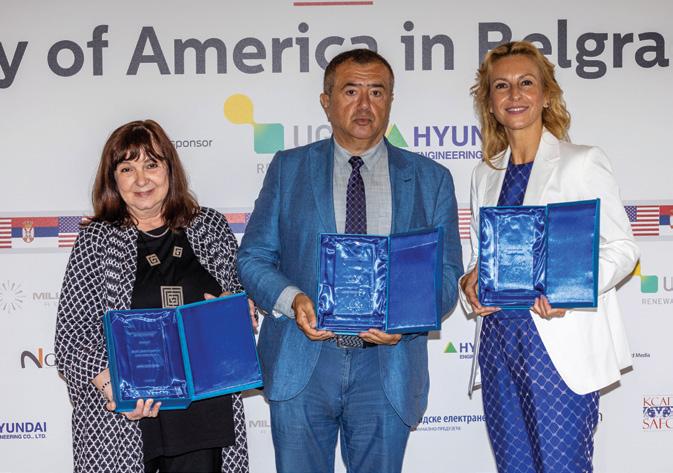

jobs, which is important for the lo cal community and for the entire Serbian economy”, said Avram.
Teodora Ćosić, executive partner in the company N2Growth, spoke about the challenges faced by man agers in Serbia. She pointed out that there is a lack of local directors on the Serbian market with interna tional experience in managing large multinational systems. Therefore, it is not surprising that foreign man agers are currently leading these companies in Serbia. Therefore, it is necessary to turn the “brain drain” into a “brain flow” and motivate both Serbian expat experts to re turn to Serbia and foreign experts to come, in order to continue the exchange of experience and apply good practices from more advanced markets.
There is a big gap in skills and knowledge between older and
young leaders, and all of them equally face the enormous pressure that comes with leadership posi tions in the modern bus”This is one of the rare moments in history when we have a wide generational diversity in the group of high man agement positions on the labor mar ket. iness world that is constantly changing”, said Ćosić.
the topIc of energy ha S never been more Important
The panel on energy was opened by Adam Cortese, CEO of UGT Re newables.
“The discussion on energy has never been more important and relevant than today as the whole of Europe and the world looks with concern towards the coming winter. We are very happy to be here today as a part of this vital conversation as we
look into mid- and long-term solu tions for the stability and security of energy supply in Serbia. We see the impending crisis as a historic oppor tunity to build greener, cleaner, and more affordable and secure energy systems.
UGT Renewables is the largest US solar and energy storage developer working internationally with over 12 gigawatts of projects under de velopment in three regions around the world. Projects developed by our companies are at the forefront of the US Government’s climate and sustainable energy agenda and have been prioritized as strategic leads under the Build Back Better World (B3W) Initiative. We are pleased to work with the Government of Serbia and local companies in implement ing sustainable, cost-effective green energy solutions”, concluded Cortese.
Zoran Lakićević, State Secretary in the Ministry of Mining and En ergy, announced austerity measures in Serbia for the upcoming winter season.
“Companies already have the obli gation to submit their winter savings plans to the ministry by September 15. Our goal is to achieve savings of up to 15 percent”, believes Lakićević, who also spoke briefly about longterm measures such as gasification and energy sources. “These are areas in which cooperation with the United States of America is necessary and possible,” said Lakićević.
Later in the Museum of Con temporary Art we’ve had a panel on cultural relations between Serbia and USA and it was pointed out this a bright point in our bilateral rela tions because there are a lot cultural activities happening and it’s certain even closer relations will happen in the future.
As a special note regarding the importance of USA in Serbia a special video was exclusively prepared about American streets in Belgrade where our famous historians presented this historical figures.
There is definitely progress in relations between Serbia and the USA, and a large number of people from different spheres are involved and willing to work on further con nection, exchange of good practices, networking and further cooperation. Gathered around Serbian-American relations, we had the opportunity to hear a large amount of useful and necessary information from eminent members of society and experts in the fields they represented. It is quite cer tain that next year, at this same event, we will gather an even larger number of people eager to see a stronger Ser bia which needs a partner like the USA on its Euro-Atlantic path.
t
urn frIendShIp Into partnerShIp
zOrAN LAkIćEVIć, STATE SECrETAry IN ThE mINISTry OF mINING ANd ENErGy, ANNOUNCEd AUSTErITy mEASUrES IN SErbIA FOr ThE UpCOmING wINTEr SEASON
71 CONFE r ENCE
dIGITAL 2022 CONFErENCE hELd:
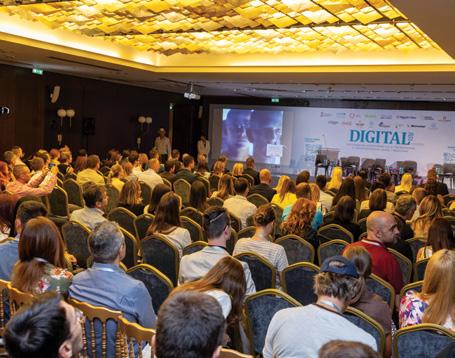

New generations need new media content and new advertising campaigns
The regional conference on telecommunications and media - Digital 2022 - was held on September 15 and 16, at the Metropol Palace Hotel. The conference, which was held in 2014 for the first time, once again brought together market leaders, telecommunications experts and representatives of all types of media, as well as all the leaders of the industries that drive the economy in Serbia, in one place.
The conference was institutionally sup ported by the Republic of Serbia’s Minis try of Culture and Information and UNICEF, as well as the companies Telekom Sr bija, Yettel, Skyline Afi Tower, Rakuten Viber, Na tional Geographic, Direct Media, Orion Telekom, Coca-Cola, Maxbet, Harmonity, D-Express, Ex ceptional Only and Mercator.
slavica TrifUnović, Assistant Minister for Information and Media, Ministry of Culture and Information, officially opened the conference and said that „the global media and entertain
ment industry is known for its proactive ap proach when it comes to adopting and creating new digital trends that significantly change and improve our everyday life. „.
The conference featured a traditional pan el discussion of regional telecom leaders with the following participants - Vladimir Lučić, CEO of Telekom Srbija, Dejan Turk, CEO of A1 Serbia and A1 Slovenia, Slobodan Djinović, CEO of Orion Telekom and Zoran Vasiljev, CEO of Centili Group. The panel was moder ated by Dejan Ljuština, CEO and Managing Partner of Vision.
72 www.diplomacyandcommerce.rs CONFE r ENCE
vlaDimir lUčić pointed out that Telekom re corded higher revenue in the first half of the year compared to the previous one and that they are particularly proud that their mobile division re corded double-digit growth.

„The situation in the company is good, because we have completed the main segment of our fi nancial investments, and we are seeing the results of those investments. The biggest investment ahead of us is 5G in which we partnered with the European Investment Bank in providing a 5G network. The price of electricity is still favourable compared to that in other regional countries. We hope that 5G will also develop in the region, in which we are focusing on being a strong operator. Regarding the development of digital services, our main goal is to expand. We are opening branches in Switzerland in October, followed by Germany. We can say that our biggest investment cycle is almost completed“, Mr. Lučić concluded.
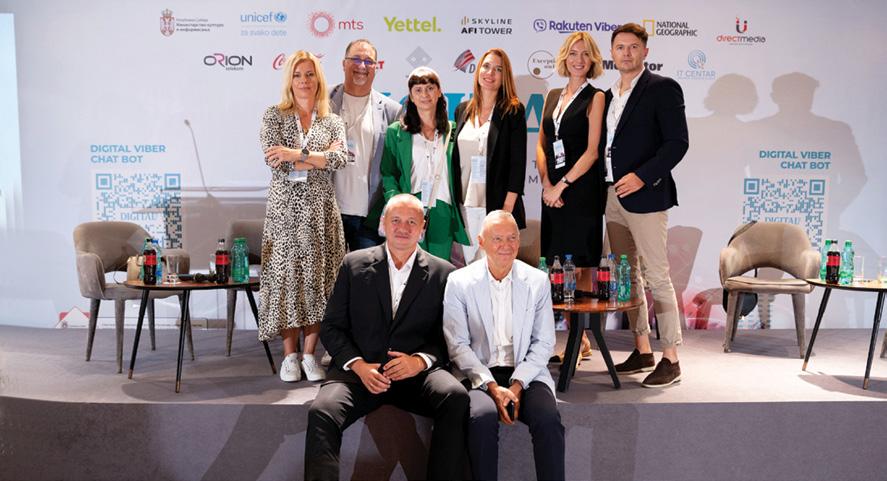
sloboDan Djinović pointed out that all tel ecom operators will have to invest more in their systems in the coming period.

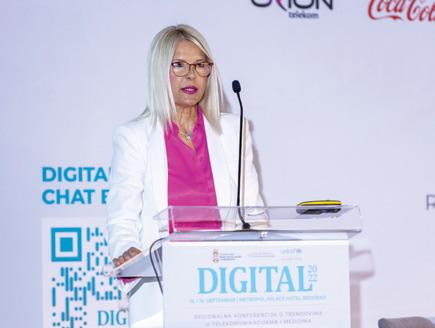
„Our goal is that, if the benchmark interest rate continues to grow, our interest rate will re main the same, so we can maintain our stability. We will certainly deal with issues of energy and alternative energy choices, as all of society will
also eventually have to deal with it. Operators will encounter problems if they do not have their own infrastructure and we are constantly working on this segment of our business. Our biggest problem is the cost of capital, which is atypical in other markets. The competition here is strong and good for us“, stated Mr. Djinović.
The second #Digital2022 panel was called “Don‘t Touch, Do Sell: The Magic and Challenges of Contactless Payment”. It was moderated by Marko Ivas, Editor of Tanjug news, with the partic ipation of Žarko Malinović, Secretary of the Trade Association at the Chamber of Commerce and Industry of Serbia, Nikola Riznić, Deputy Director General of D-Express, Aleksandar Zarić, Consult ant in the SOG office and Dejan Tešić, Executive Director of JTC Serbia.
nikola riznić presented practice cases related to contactless payment and explained that „cashless payment is lagging in our country.” “As a courier service, we have 750 couriers in the field, which means that we collect and transfer packages from
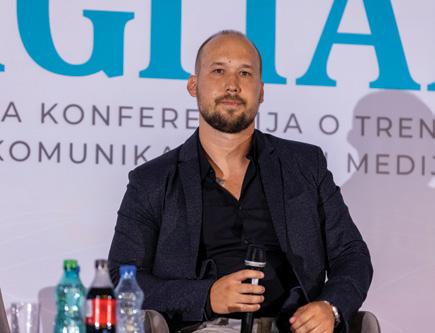

the same number of places. Until this moment, our package receivers paid 100% in cash, because payments for goods in Serbia are made in advance in only about 10% of cases. We had been looking for a solution for years and we found it last year thanks to the support from MasterCard. I think that, in the future, people will be able to pay with out having cash in hand. In our courier service, we have fulfilled the prerequisites for this option to become feasible and possible only recently. That‘s why I say that we are a little late,“ Mr. Riznić added.
Viber in Serbia is used by 90% of online users for calls and sending messages, and it is a very im portant market for this company, as pointed out by Konstantin Kostadinov, senior sales director for CEE and CIS countries at Viber. One and a half billion calls were made, 30 billion messages were sent, and 830 million stickers were exchanged via Viber in Serbia. The company is currently devel oping business tools because they consider it the next step to improve the experience of end users.
„Rakuten Viber will continue to have a separate option for its business users and they can use it
Slavica Trifunović
Digital dan
Dragan Glišović
73 CONFE r ENCE
for everything they need to further develop their companies. Viber Business is a new place which will jumpstart communication with end custom ers,“ said Mr. Kostadinov.
We also had the opportunity to listen to the first registered drone operator, Dragan Glišović, who, from September 2021 to February 2022, filmed the series “Filming from Above” in 9 loca tions in Serbia. He was given the opportunity by National Geographic to present his country in the first part of the project.
vlaDimir TrkUlja, an innovation consultant from UNICEF Serbia, spoke about cryptocurren cies and by talking about UNICEF’s example, pre sented how fundraising will look in the future.
UNICEF‘s Innovation Fund invests up to $100,000 per team (in dollars and/or cryptocur rency) to provide early-stage funding and mentor ship to startups developing technologies that have the potential to help humanity.
At the end of the first day, we had the oppor tunity to reward one conference guest. Maxbet, as one of the conference sponsors and one of the largest betting companies in Serbia, provided the perfect prize for the lucky winner - a cruise for two by Norwegian Cruise Line.
milan Dobrijević, State Secretary in the Min istry of Trade, Tourism and Telecommunications, officially opened the second day of #Digital2022. He said that the Ministry’s priority is to reach the most remote areas of Serbia with an optical network.
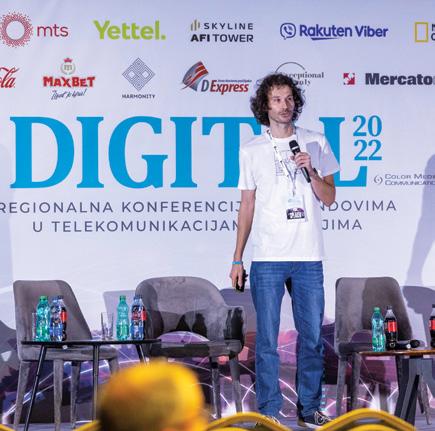
„We can officially announce that the first con struction contract was concluded after 3 years of preparation. We are going to start with the construction of the first optical routes leading to rural areas in October. With this, we will reach the remotest villages and our backbone (the optical network) will be financed via a project for which we secured a loan from the EBRD in the amount of 118 million euros. In addition, we received grants from the European Commission in the amount of 34.7 million euros“, announced Mr. Dobrijević.
The first panel on the second day called “Now You See Me? 3D, Apps, VR, AR & AI in Tourism” focused on virtual tools for tourism development. Zorica Jovanov, head of the sector for the foreign promotion of Serbia from the Serbian Tourist Board, and Aleksandar Erić and Elena Ljubojević,


aleksanDar erić anD elena ljUbojević had a presentation to show how necessary it is to intro duce new digital tools in tourism because the Cov id-19 pandemic, in particular, showed us that when everything stops, digital continues. There must be a presence and a story must be told that will be seen by people who are thousands of kilometres away from a particular tourist location. Conference guests thus had the opportunity to visit the beauti ful Šabac Fortress with the help of VR glasses.
“Digital Ready Brands: Is the digital path the only right one” was the title of the second confer ence panel with the following participants - Dan iel Bukumirović, New Media Development Direc tor from United Group, Ljubiša Egelja, Marketing Director of OTP Bank Serbia, Petar Vlaisavljević, Internet Marketing Manager at Mozzart, Vladimir Arandjelović, Digital Director of DIRECT MEDIA United Solutions and Jelena Medojević, Digital Lead South East Europe at Philip Morris Interna tional.
The panellists agreed that digital is not enough for promotion and that although its importance is growing every day, we still have to use other op tions and reach end users in other ways that are not related to the Internet and social networks.
vlaDimir aranDjelović, Digital Director of DIRECT MEDIA United Solutions, pointed out that the level of use of digital products and services, including media, is no longer strictly correlated with socio-demographics. As a result, agencies and advertisers pay more and more attention to the user‘s road to purchase (purchase funnel), the most common customer profiles (personas), touchpoints and the overall user experience, even in the offline world.
Most of the changes in the media industry are the result of technological disruption, so our best answer is technology, Mr. Arandjelović went on to say and added:” It becomes the best way to man age a campaign from one place that will reach the desired segment of users whose media consump tion is increasingly fragmented. Of course, digital is not the only way to communicate with custom ers and digital-only brands, such as Facebook, Google and others, often use offline channels in their campaigns.”
Media will survive the current technological revolution and TV or Big Screen will continue to dominate the global market, in a slightly more „digital“ form. This thesis is supported by current events in the USA, where total linear+CTV (Con nected TV) advertising budgets have been con stantly growing. Moreover, CTV is a generator of advertising market growth.
After two days of a varied programme, with 100+ speakers and topics, 9 panels, 5 individual presentations and 500+ guests, it gives us pleas ure to say that #Digital2022 was successfully real ized and we will see you next year to celebrate the decade of the Digital brand.
from Harmony Solution, took part in this panel which was moderated by Danijel Koletić, CEO of Apriori World.
Unicef
74 www.diplomacyandcommerce.rs CONFE r ENCE
prof. nikola raJakoVić
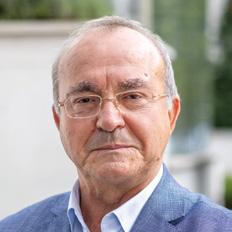
here Comes the Sun...
solar photovoltaic (PV) is a technology with the small est environmental footprint that can be constructed in the short est period and generate electricity at the lowest cost. Unlike fossil fuels, solar energy does not contribute to global warming; more importantly, it does not pollute the air, soil, and water around the plant.
The current energy crisis has imposed an urgent need in front of governments for making shortterm decisions (to survive the coming winter) but also medium to long-term decisions on how to improve the security of supply, decrease energy dependency and eliminate expensive imports over the challenging decade in front of us. Serbia needs to build its energy security around domestically avail able resources, and solar energy could be one of our key allies.
energy market
It is too early to make conclusions about the robustness of European electricity and the overall energy market models. However, it is evi dent that the existing model cannot cope with perceived and actual chal lenges in the region. Still, there are so many questions. For example, why the owners of power plants that are not using natural gas for elec tricity generation are selling their products 10 times more expensive than a year ago? Is it mindful to earn extra profit today and destroy poten tial customers for the next decade? What will be the impact of protective measures of individual countries (subsidies, price limitations, etc.) on the integral European market?
The households and small indus trial and commercial electricity con sumers in Serbia are not exposed to the electricity markets. They are paying so-called regulated electrici ty prices. Moreover, at the beginning of the energy crisis, the Government decided to freeze electricity prices for large industrial consumers. All these measures had a positive impact on people’s lives and the
competitiveness of the industry. However, due to poor management and a lack of investments in new generation capacities, EPS, as a guar anteed supplier, cannot fully cover domestic needs. Importing expen sive electricity and selling it several times cheaper is not a sustainable business model. The solution to this lies in strengthening the EPS’ capac ity by investing in new, preferably clean, energy sources.
the beSt technolog IeS how to dec Ide
The selection of optimal tech nologies should be based on ob jective criteria. Some of the most important are:
• Security of supply, solutions that will promote the use of do mestic resources that will re duce dependency on imported fuels;
• Affordable electricity price, fairly calculated to include all construction, operation, and decommissioning costs, including real fuel cost, balanc ing cost, carbon taxes, etc.
• Environmental impact, which will take into account our
international commitments to greenhouse gas emission reduction, but even more im portantly, reduction of local contamination of air, water, and soil.
Commissioning a new power plant a few months sooner or later was not so critical before the crisis. Nowadays, deployment speed is essential due to high electricity im port costs.
The energy sector in Serbia has endured many blows in the previ ous period. This is a historic oppor tunity for EPS to turn to sustainable and clean resources.
Based on reliable studies of leading international companies, the optimal structure for having a 100% renewable energy system in the Western Balkans should be based on solar energy (43%), wind energy (27%), hydropower (27%), and other sources (3%).
Storage SyStemS are eSSentIal
The major drawback of leading renewable energy technologies - solar and wind - is the intermit

tency of their generation. Solar and wind power plants generate electricity proportionally to solar ir radiation and wind speed, and that generation does not always match electricity consumers’ needs. Therefore, significant penetra tion of renewable energy requires the construction of a sufficient amount of energy storage facili ties. Before hydrogen/ammonium storage technologies reach com mercial viability, we can seriously count on two mature technologies: pumped=storage plants (PSP) and battery energy storage systems (BESS). There is an ongoing debate about which technology is better. The correct answer is – both are ex cellent. Those two technologies are not conflicting but complementary.
Due to their larger energy stor age capacities, PSPs are a better solution for aligning generation and consumption on the weekly, monthly or seasonal time horizon. The drawback of PSPs is a lower charge/discharge efficiency (6065%) and long development and construction time (10 – 15 years).
On the other hand, BESS are more efficient regarding balanc ing and system services for dayahead and intra-day interventions. Charge/discharge efficiency is much better (above 95%), and de ployment is ultra-fast (3 months). However, BESS solutions with monthly or seasonal storage are still more expensive than PSP.
President of the Association of Power Engineers of Serbia
If there is one positive side of the energy crisis, it is that we have finally opened our eyes and embraced the energy transition.
UNLIkE FOSSIL FUELS, SOLAr ENErGy dOES NOT CONTrIbUTE TO GLObAL wArmING; mOrE ImpOrTANTLy, IT dOES NOT pOLLUTE ThE AIr, SOIL, ANd wATEr ArOUNd ThE pLANT.
75 COrp Or ATE Read This on Web
The winners of the prestigious mark Awards 2022 have been announced
M arketing Network (Marketing mreža) announced the names of the winners of the prestigious Mark Awards, which will be presented to experts from companies in Serbia for personal business and professional success on October 21st at a ceremony under the general sponsor ship of PepsiCo. As many as 54 experts were nominated for awards this year, and the expert jury made a decision to reward 12 of them, who left their mark on the Ser bian market in 2021.
In the Chief Marketing of the Year category, the award went to Nataša Šarčević, Director of Marketing and Innovation at Atlantic Štark, while Bojana Nenadović, Marketing Director at CocaCola HBC, was awarded in the Chief Marketing of the Year – Multi Country cat egory.
Aleksandra Stevović, Brand Manager at PepsiCo is the winner in the Brand Manager of the Year category. Maja Vujašković Đureinović, Country Communication Manager at IKEA South East Europe, was awarded in the PR/Corporate Com munications Manager of the Year category, and Sanja Tomić, Employee Communication Man ager at A1 Serbia, won the Internal Communica tions Manager of the Year category.
Employer Branding Manager of the Year is Sanja Miladinović, Talent Acqusition Lead, WB, Baltics and CEGB FOBO at PepsiCo. Digital Mar keting Manager of the Year is Olja Nestov, Senior Digital Marketing Specialist of Grand kafa, and CSR Manager of the Year is Suzana Đorđević, Di rector of the Hemofarm Foundation.
Filip Gujaničić, Junior Brand Manager at the company Frikom, won the award in the Rising Star of the Year category, for marketing profes sionals under 30 years of age. Milena Đorić Gudurić, Marketing Director for the markets of Serbia, Montenegro and Bosnia and Herzegovina
at Mastercard, won the title of Brand Innovator of the Year, while Danijela Gašparac, Head of Market Research - CEO Advisor, Telekom Srbija and Marketing & Communication Consultant Srbija voz and UNDP, is winner in the Super Hero of the Year category, for marketers who, despite numerous crises and market challenges, bravely continued to communicate with consumers.
At the suggestion of the members of the jury, Đorđe Jovanović, Marketing Director for the Bal kan market at the company Xiaomi, was award ed a Special Award for his personal contribution to the development of the profession in Serbia.
The jury of the Mark Awards consisted of 15 professionals - directors of companies, direc tors of creative, PR and digital agencies, as well as one representative of the organizer. This year, the jury was composed of - Aleksandar Goračinov, Partner, Evoke Group; Ivan Zeković, CEO, Carnex; Miloš Jovović, Director of Strategic Planning for Central Europe, PepsiCo; Marko
Njavro, General Manager SBU Snacks, Atlantic Štark; Nataša Filipović, Man aging Director, Ovation BBDO; Milivoj Đorđić, Gen eral Manager Adria Region, SmartPoint Adria; Milija Zeković, CEO, SBB Serbia and Telemach Montenegro; Neda Đokić, Managing Director, HEINEKEN Serbia; Olga Ristić, General Manager, Frikom; Srđan Lazović, Gen eral Manager, Philip Morris International (BiH & Monte negro); Iva Đurković, Manag ing Director, OMD Media & LUNA TBWA Belgrade; Vanja Cvetkov, Business Director, Centrade Cheil Adriatic; Violeta Kovačević, CEO, Mer cator-S; Vuk Kosovac, Head of Retail, Executive Board Member, OTP banka Srbija and Ivana Parčetić Mitić, Founder and CEO, Marketing Network.
The goal of the Mark Awards is to encourage and motivate marketing and communication experts from companies in Serbia, but also to point out to the professional public their potential, talents, creativity and ability to achieve top busi ness results and brand recognition. Mark Awards is an award with which the professional portal Marketing Network wants to promote profes sional role models, but also to contribute to the improvement and development of the profes sion in Serbia.
Unlike other professional awards on the Ser bian market, Mark Awards are awarded to indi viduals for personal business and professional success, that is, to individuals who have left their mark on the market of marketing commu nications in Serbia in the previous period.
The general sponsor of the Mark Awards project is PepsiCo. The regional partner is Porto Montenegro, and the project was supported by Evoke Group, LUNA\TBWA Belgrade, SmartPoint Adria, Infostud 3 and Ušće Shopping Center. The partner agency is Ovation BBDO.

ThE jUry OF ThE mArk AwArdS CONSISTEd OF 15 prOFESSIONALS - dIrECTOrS OF COmpANIES, dIrECTOrS OF CrEATIVE, pr ANd dIGITAL AGENCIES, AS wELL AS ONE rEprESENTATIVE OF ThE OrGANIzEr.
The goal of the Mark Awards is to encourage and motivate marketing and communication experts from companies in Serbia, but also to point out to the professional public their potential, talents, creativity and ability to achieve top business results and brand recognition.
76 www.diplomacyandcommerce.rs COrp Or ATE
Information, as well as by the Bel grade City Museum. The exhibited artwork gives a partial insight into how the Collection of Fine Arts and Music Culture has been develop ing since 1950 and is supplemented with the works of prominent in dividuals who marked the art of their time with their creativity. The artwork acquired during the last 20 years is made by the artists who are active protagonists primarily of the Belgrade art scene, i.e. artists whose works are representative examples at the time of their creation. There was also a smaller segment of the collected artwork of the artists who profiled and positioned themselves on the art scene with their work pre sented at the exhibition.
The exhibited artists include Vuk Vidor, Dragoljub Raša Todosijević, Neša Paripović, Milovan Destil Marković, Marija Dragojlović, Uroš Đurić, Predrag Nešković, Bora Il jovski, Biljana Đurđević, Čedomir Vasić, Ivan Šuletić, Dragan Srdić Srka, Vladimir Perić, Milan Blanuša, Dragana Ilić and others.
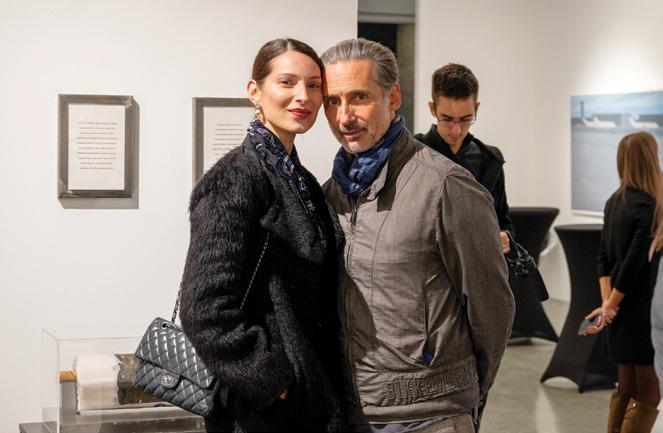
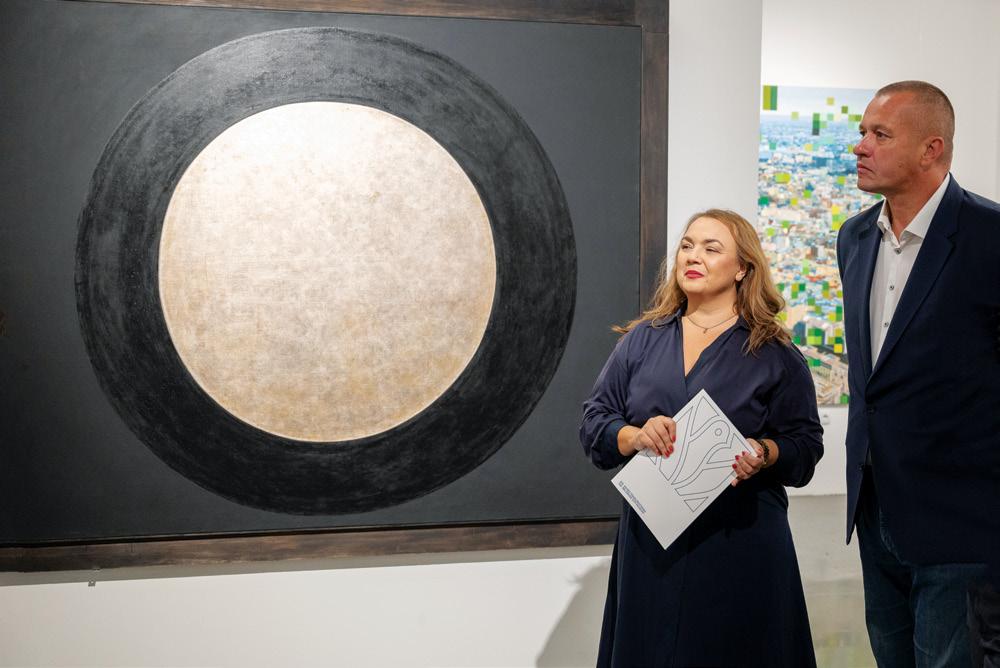
VIp guided tour for diplomats in the Salon of the belgrade City museum
In cooperation with Diplomacy&Commerce magazine, the Belgrade City Museum organized a VIP guided tour for the diplomatic corps of the ‘Unplugged - Art Without Electricity’ exhibition, which took place on Monday, October 3, at 6:00 p.m., in the Salon, a new facility at the Belgrade City Museum.
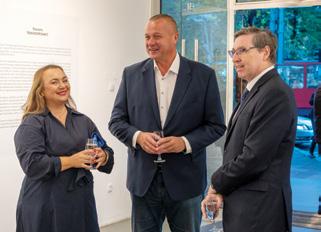
J elena Medaković, director of the Belgrade City Museum, greeted the guests and thanked them for coming to see the exhibition of a small segment of the museum’s contemporary art collec tion. She added that the Salon was a new part of the museum and that she hoped that both Serbian and for eign artists would now have a place where the museum could have suc cessful cooperation with them.
While waiting for the main building to be reconstructed, the Belgrade City Museum is expand ing its activity by occupying new, urban and alternative spaces in the city. The Salon is one such place which opened its doors to works of contemporary art, guest exhibi tions and other thematic museum presentations. The first exhibition in the series is called ‘Unplugged - Art Without Electricity’, which showcases part of the museum’s contemporary art collection.
The exhibition presents a seg ment of the collection, i.e. a selec


tion of thirty-three works of art created in the period from the be ginning of the 21st century to date,
purchased at the tenders launched by the Belgrade Secretariat for Cul ture and the Ministry of Culture and
The Salon building spans 1,300 square metres, of which about 400sqm have been converted into exhibition space.
It is located in a building on Kralja Aleksandra Boulevard, which following its construction, has be come known as the Technology Pal ace. It was designed in 1953 by the Arhitekt Studio, i.e. by the archi tects Mihailo Marinković, Ljubiša Dragić and Djordje Grujičić.
ThE SALON OpENEd ITS dOOrS TO wOrkS OF CONTEmpOrAry ArT, GUEST EXhIbITIONS ANd OThEr ThEmATIC mUSEUm prESENTATIONS.
77 CULTU r E
Contemporary art that is accessible to everyone
Apart from the excellent results achieved by our athletes worldwide, art is another important field where our ideas are very welcome and where our artists should be respected as ambassadors of their country.
mariJa milošEVić Founder of Art for All Gallery

on the occasion of the series of exhibitions of Serbian artists in Washington, D.C., staged by the Art for All gallery from Belgrade as part of the Find ing a Way project, we spoke with the project creator and the founder of the Art for All Gallery, Marija Milošević, about the current posi tion of the Serbian art in the world and the importance of contempo rary art for the common people.
We are witnessing a constant regression to the past, includ ing in art. Modernity, especial ly the avant-garde, is not val ued in our society today. Is there room for contemporary art and artists in Serbia?
Continuity is very important, as is the connection with one’s roots which gives identity to our fine art even today. Although con temporary artists may be inspired by the past, they deal with current social issues through traditional and contemporary techniques. From idea to implementation, the road is long and challenging, and innovation and perseverance on
that road are the most important features of our contemporary art, as well as a characteristic of the avant-garde - to be innovative, to explore or introduce new forms and styles.
Is it wrong to expect more people to understand contem porary artists? If that happens, do artists lose their artistic es sence and become a part of mass production?
Art is a diverse range of human activities that are underpinned by qualities such as creativity, imagi nation or talent, skill, emotional strength or conceptual ideas. Look ing at a work of art, of course, it is impossible to understand it all in an instant. The question of meaning is justified. A work of art can be in terpreted in countless ways so that the viewer somehow “completes” the work through open engagement and subjective association. We, at the Art for All Gallery, try to offer a concept of contemporary art that is for everyone, is not elitist and is ac cessible to everyone. This in no way diminishes the artistic value of ei ther the work or the author - on the contrary, it makes it more valuable to a larger number of people.
You are putting together an exhibition of several Serbian young artists in Washington. Does the world understand and know the Serbian contem porary art scene?
The Finding a Way project, an exhibition of Serbian contem porary art in Washington, is one step in the presentation of our art scene, which is a perpetual process that should have conti nuity to be effective. The 20thcentury-Yugoslav-art left a deep mark on the global scene, and our artists, although heirs to that particular school of painting, demonstrate with this project how differentiated and original the Serbian contemporary art scene is.
The great success of Konstrak ta, the Serbian representative at Eurovision, has significant
ly popularized conceptual art in Serbia, especially because of the references to Marina Abramović, as well as showing us to the world in a new light. How do foreigners view our art scene?
Speaking from the experiences of the Art for All Gallery and pre sentations at international art fairs, I can proudly say that our fine contemporary art easily com municates with foreign audiences. Although the language of art is a universal one on all continents, the works of our artists amaze for eigners with their original idea and artists’ freedom to experiment. Apart from the excellent results achieved by our athletes world wide, art is another important field where our ideas are very welcome and where our artists should be respected as ambassadors of their country.
wE, AT ThE ArT FOr ALL GALLEry, Try TO OFFEr A CONCEpT OF CONTEmpOrAry ArT ThAT IS FOr EVEryONE, IS NOT ELITIST ANd IS ACCESSIbLE TO EVEryONE
78 www.diplomacyandcommerce.rs INTE rVIE w
by Dragan nikolić Read This on Web
Who are the Serbian art ists who will be presented in Washington?
The Finding a Way project is designed to present two genera tions of contemporary artists in Serbia via two exhibitions and a series of lectures – that is a gener ation of professors from the Uni versity of Arts and a generation of
feature the artwork of their stu dents - Jovanka Mladenović, Ivan Milenković, Vuk Vučković and Tijana Kojić.
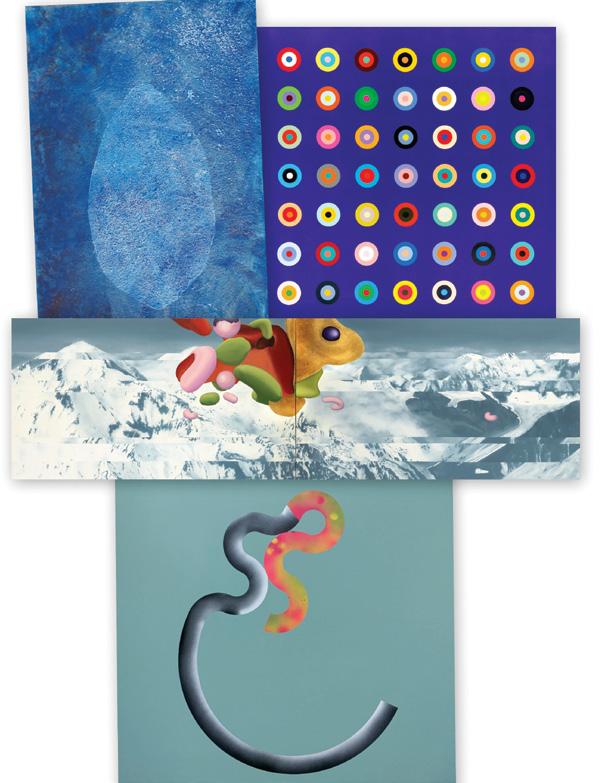

Could you tell us more about the exhibition?
We are exhibiting at two loca tions from October 17th to No vember 5th. We have the honour
their students. Our goal is for the professors Vladislav Šćepanović, Nikola Božović, Goran Čpajko, Aleksandar Mladenović and Djordje Stanojević to showcase their work and communicate with their American peers, experts and of course, the public, in a group exhibition which will also
to open the project with an exhibi tion in the Serbian Embassy’s new building in Washington. In paral lel, there will be another art exhi bition at the Anacostia Cultural Center, followed by lectures and a panel discussion with local art ists. Thanks to the support of the Ministry of Culture, our embassy
in Washington, as well as my col league Elizabeth Escobar, who is the co-author of the project, our activities are considered a form of cultural diplomacy. The local au dience will have the opportunity to interact with our artwork and guest artists, which in turn, opens the door for us to extend the proj ect to last in 2023 too, in other locations in America.
Finally, we have to ask you an inappropriate question - can you make a living from do ing art in Serbia? Although we are aware that this question is rather inappropriate, it is also inevitable to talk about art commercially. Hence, we have to ask does art have its market in Serbia?
The global value of the fine art market in 2021 was 65 billion US dollars and we aim to be part of that market. And no, it is not in appropriate to ask that question. The art market in any country, including Serbia, depends mostly on how educated is the audience, hence, it is our main mission to make art accessible to the audi ence to explore and ask questions. Art is one of the few resources in any country that is inexhaustible if nurtured and invested in. We are going to the United States to present ourselves in the best pos sible light and to try to position Serbia as a country with strong and original ideas.
ALThOUGh ThE LANGUAGE OF ArT IS A UNIVErSAL ONE ON ALL CONTINENTS, ThE wOrkS OF OUr ArTISTS AmAzE FOrEIGNErS wITh ThEIr OrIGINAL IdEA ANd ArTISTS’ FrEEdOm TO EXpErImENT. Đorđe Stanojević, Vuk Vučković, Jovanka Mladenović,
Nikola Kolja
Božović
Aleksandar Leka Mladenović, Vladislav Šćepanović, Goran Čpajak, Ivan Milenković i Tijana Kojićz
79 INTE rVIE w
To reach high goals during difficult times
Eun Hai kim President of International Women Club - IWC Serbia
on the occasion of the 19th IWC Charity Bazaar, we spoke with the International Women’s Club president, Ms Eun Hain Kim, who talked about chal lenges in this difficult time, and the importance of working together to help those who are in need.

IWC Charity Bazaar, which counts a 19th yearly edition this month, is famous in Ser bia. Do you feel proud of its suc cess, and what goals have you reached since the beginning of this charity event?
IWC Charity Bazaar has been one of the most anticipated events in Belgrade. Unfortunately, due to the pandemic, we were forced to have a two-year hiatus. Even for this year’s bazaar, there was still uncertainty that we would be unable to celebrate our traditional bazaar in December and in a big venue. Therefore, the IWC board decided to move the date of the bazaar from December to Oc tober 16th.
I am proud of the immense amount of support we have received from IWC members, local busi nesses, and embassies. The Hyatt hotel generously allowed us to use their location as the venue and many embassies have confirmed their par ticipation. The Embassies will partic ipate with sale tables, cultural perfor mances and through donations for the raffle. Through this solidarity and collaboration, we are excited to em bark on this philanthropic endeavor.
In previous years, IWC has col lected approximately 650,000 euros and donated the funds to nongovernmental charities that support vulnerable populations throughout all of Serbia. We are very fortunate to have people’s trust that their dona tions will help others in need.
The 19th IWC Charity Bazaar will be held on Sunday Oct. 16th at Crys tal Ballroom Hyatt Hotel from 10:30 am to 5:30 pm with guest of honor Professor Dr. Darija Kisic, Minister of Labor, Employment, Veterans and Social Affairs and master of ceremonies will be Ivana Vucicevic from Studio B. The funds raised at this charity bazaar will go to support Serbian communities that have been affected by the Covid- 19 pandemic.
The IWC Bazaar will be a multi cultural event with the participa tion of 25 embassies that will have their own booths that display and sell packaged food, gifts, artistic and craft items and other products unique to their culture. In addition, there will be an exciting Cultural Program from 11:00 am until late af ternoon, featuring music, children‘s choirs, and traditional dances from participating countries. A raffle will
be held with more than 150 valu able prizes, including gift baskets from embassies and other entities. Entrance tickets are 300 dinars each and raffle tickets 250 dinars each. All Belgrade residents and visitors are invited to come to browse the booths, enjoy the multicultural en tertainment and maybe even win a raffle prize.
Charity Bazaar is not the only charity activity that IWC organ izes. Can you tell us about other charity events?
IWC is host to many different charity events and I can proudly say is a very active member of the Ser bian community. Just to give a few examples of the different types of endeavors -, IWC published a book titled “Belgrade through the Eyes of Foreigners”. This is a collection of stories from our foreign members that describe their favorite places in Belgrade and why they hold a special place in their lives. We printed 1000 books and we have few books left to be sold.
Chic for Charity is another suc cessful event that IWC held during the pandemic. It was a silent auction event with a goal to give old clothes a new life. IWC members, many local designers participated by donating gently worn, high-end, designer women’s clothes for this event.
This year we created a Social Work Activity Group to assist and support people in need with activi ties. These activities include spend ing time with elderly people in their retirement home or baking cupcakes with children in orphanages to share a little light, joy and hope to people in need within our community.
Do the increase in the number of charity events globally shows that modern society feels more compassion, or maybe, we just have more people in need? What do you think about it?
ThIS yEAr wE CrEATEd A SOCIAL wOrk ACTIVITy GrOUp TO ASSIST ANd SUppOrT pEOpLE IN NEEd wITh ACTIVITIES.
80 www.diplomacyandcommerce.rs COrp Or ATE
The IWC Bazaar will be a multicultural event with the participation of 25 embassies that will have their booths that display and sell packaged food, gifts, arts and crafts items and other products unique to their culture.
Read This on Web
The pandemic highlighted the need for charity events as people all over the world were affected eco nomically, emotionally, physically, and more. Charity events became even more necessary after the pan demic considering charitable or ganizations were unable to operate normally. Therefore, it seems that the number of people in need has unfortunately increased and IWC is committed to helping as much as we can.
In addition to the pandemic, we have lived through historical events. For instance, the war in Ukraine has also increased populations in need. This is the time to recognize our privilege and be grateful for what we have while acknowledging how we can help. I think It is easy to think it is someone else’s problem if you are not being directly impacted. Howev er, considering there is so much hap pening in the world, it is important now more than ever to help others.
What exactly is IWC? What kind of organization is it, and who participates?
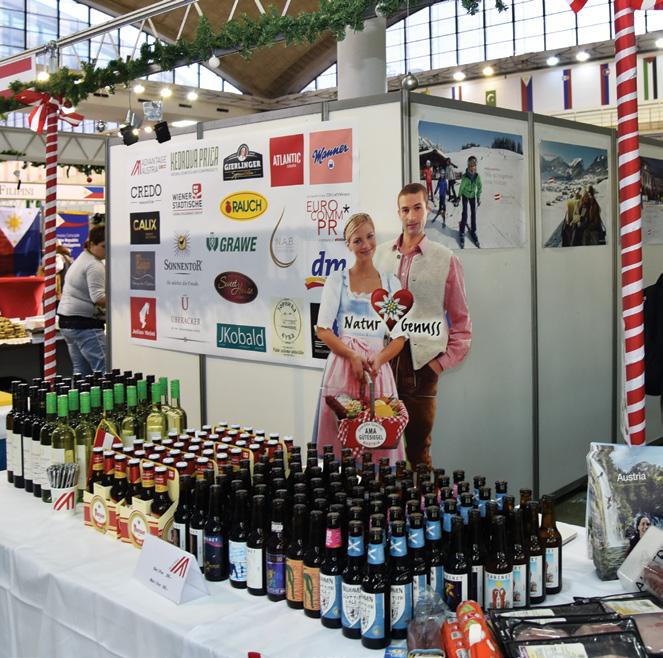
The International Women’s Club (IWC) of Belgrade is a registered nonprofit volunteer based organization. The club was established 30 years ago and officially registered in 2011. IWC offers unique opportunities to our members for personal growth through many comprehensive pro grams, classes, community services, cultural and intellectual activities and social connections. Our mem bers are from the diplomatic com munity, expats and distinguished Serbian ladies. Currently we have 130 members from 40 different coun tries.
What was your main challenge when you became the presi dent of IWC in May this year?
My main challenge has been leading the organization to reach our high goals during difficult times
in the post-pandemic world. Now that the dust is settling, there are many new issues that IWC wants to bring awareness to.
For instance, Breast Cancer Awareness is extremely important. We want to empower women to take charge of their health by being aware of the importance of early detection. IWC is hosting for the first time Breast Cancer Aware ness Event with the support of our generous hostess HRH Princess Katherina on Oct. 19th at White Pal ace. We are also privileged to have as a guest of honor, Professor Dr. Danica Grujicic, Director of the In stitute of Oncology and Radiology and a presentation from Acibadem
Bel Medic and University Clinical Center of Serbia. Loreal will join the world in going pink to support this event.
I would also love to raise aware ness of environmental issues, specifically the dangers of single use plastics. Plastic products have become one of the most common household items and while they can be useful, it harms us and the environment because of its inability to degrade safely. I wish to organ ize educational talks that highlight the dangers of single use plastic, as well as to promote sustainable consumer habits to make more en vironmentally conscious decisions everyday.
For my tenure as president of IWC, these are important goals to accomplish. However, on an inter nal basis, I want to create a collabo rative and fun environment that all IWC members enjoy. It is important to work together as a team but enjoy our time together while we work hard. I will be satisfied if IWC mem bers feel empowered during my presidency.
How important are IWC Coffee Mornings? What kind of activi ties are presented there?
IWC holds monthly Coffee Mornings with different themes to promote the multicultural back ground of our members. The Coffee Morning is where our members are introduced to other cultures and traditions as well as the host coun try. We highlight our similarities and differences over coffee or tea and traditional dishes from differ ent countries.
Likewise coffee Mornings also serves as a platform to meet and welcome newcomers to help set tle down, share experiences, and useful information about living in Belgrade. IWC coffee morning is a place where multicultural and di verse IWC members feel Belgrade as a sweet home.
As an artistic soul, could you say that Belgrade is inspiring?
I lived in Belgrade from 1991 to 1994. It was a complicated time that my husband and I shared with the people of then Yugoslavia. Now that I have returned, I am enjoying this historical city in a different state.
Belgrade is transforming into a modern city but still there are plac es I can picture myself 30 years ago. It gives me a lot of nostalgia to see some of the streets and neighbor hoods that haven’t changed much even though it’s been a long time since I was here.
Upon my arrival for the second time, the first place I visited was Belgrade City Gallery. It was a surre al experience. Belgrade City Gallery is located behind the remains of the Belgrade site that was bombed in 1999. I thought this an interest ing location for such a modern art exhibit. I think it captures the jux taposition of the city where history acts as a background for new art to flourish. It also captures and high lights the resiliency of Belgrade and its citizens.
But the most important ele ment in Belgrade is its people. Ser bian people have not changed and they remain vibrant and friendly with foreigners. I feel home in Bel grade.
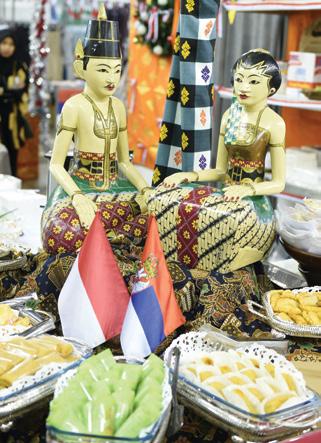
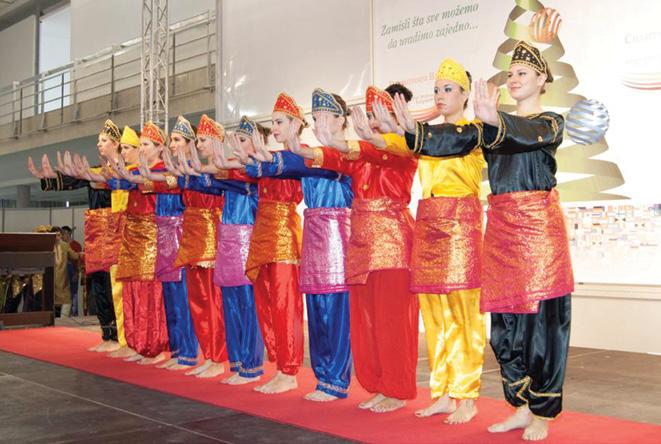
I wANT TO CrEATE A COLLAbOrATIVE ANd FUN ENVIrONmENT ThAT ALL IwC mEmbErS ENjOy 81 COrp Or ATE
Food is an external expression of our state of mind
as the closest neighbours and two nations that are histori cally and traditionally close, the people of Croatia and Serbia also share many similarities when it comes to cuisine. We spoke with Mrs Mirjana Biščević, the wife of the Croa tian ambassador to Serbia, H.E. Hida jet Biščević, about Croatian cuisine and its similarities and differences in comparison to Serbian cuisine.
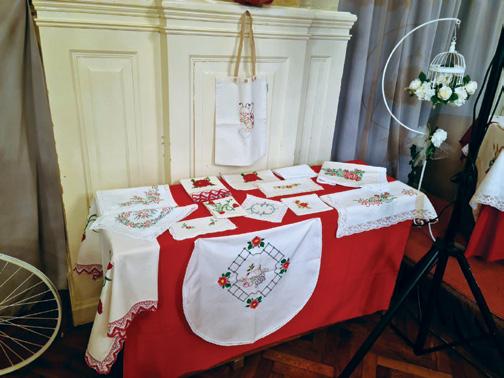
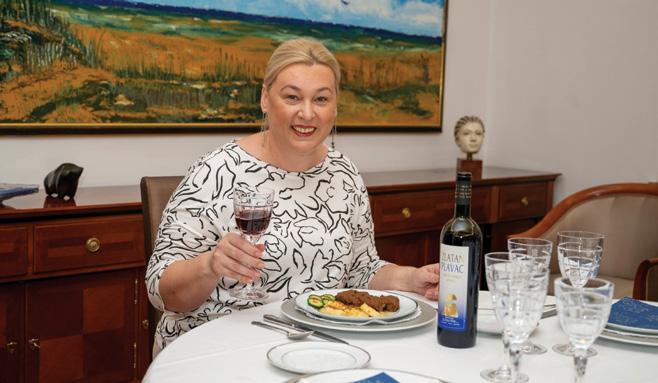
How would you briefly de scribe Croatian cuisine to a to tal stranger?

I would say that the easiest and most accurate description of Croatian cuisine for total strangers is contained in a simple slogan“everything that features in your country’s cuisine is already a part of our, Croatian cuisine”. In other words, Croatian cuisine is in many ways the result of geography and history. Because of this fact it is also distinctly regional. Dalmatia, Slavo nia, Međimurje, Zagorje, Lika - they all contribute to our heterogeneous Croatian cuisine. When I mentioned geography and history, I was refer ring to various empires and rulers that have passed through and ruled our area - our country leans on Cen tral Europe, the Mediterranean, the European Southeast and the Balkans. In various historical stages, various
parts of Croatia were under the rule or influence of Austria-Hungary, Turkey and Italy, hence the country has inevitably ‘mixed in’ the ingredi ents of those cuisines, with all their differences, into its culinary profile.
And this is why we have a wide range of dishes and wide differences. For instance, look at the Dalmatian recipes and the “lightness” of their ingredients, then jump to Slavonia where, in contrast to fish and chard, you will be greeted by spicy kulen, sausages, prebranac... Then there are cakes from Međimurje, brimming with fruit, honey, poppy seeds and walnuts, in comparison to simple
Dalmatian fritters. Simply put, Croa tian cuisine is an abundance of dif ferences.
What are the similarities and dif ferences between Serbian and Croatian cuisines?

Starting from the regional diversity of Croatian cuisine that I mentioned above and based on my experience with Serbian cuisine, the difference lies in the greater uniformity of Ser bian cuisine. I don’t claim that Serbian cuisine is „more sparse“ in any way. On the contrary... But it is certainly simpler. And there are fewer regional differences, excluding Vojvodina’s
cuisine with its idiosyncracies which sometimes amaze me, such as fresh water fish with pasta, an incredible combination and incredibly delicious. Honestly, when I came to Serbia, I thought that “mlinci” was autoch thonous Croatian pasta, which in our country, is regularly combined with roast turkey. But, carp with mlinci! That’s a real revelation!
I would like to mention another difference that I have noticed during my life in Serbia – here, more attention is paid to soups, chowders and stews of countless types and ingredients. There are, of course, all kinds of soups in Croatia too, but it seems to me that the soup menu here is richer. I would also like to add that my impression is that meat, of all kinds, is the key to everything in Serbian cuisine. Meat and barbecue here are, let’s say, an eve ryday occurrence and a menu staple. There are also differences in the larger range of dough-based dishes – burek, proja, polenta - to name a few. I have to mention a wide range of salads too, like urnebes, šopska, srpska, etc. And, finally, since I was born in Zagorje, Croatia, I thought that various bran dies rakias were our unrivalled “trade mark”, but, I have to admit, you have surpassed us in that. Even after two and a half years of living here, I still can’t remember all the varieties of various fruit brandies rakias. Last but not least, I must note a recent trend in Serbia, that we, in Croatia, started ex periencing some twenty years ago, and
mirJana BiščEVić, wife of the Croatian ambassador to Serbia
In various historical stages, various parts of Croatia were under the rule or influence of Austria-Hungary, Turkey and Italy, hence the country has inevitably ‘mixed in’ the ingredients of those cuisines, with all their differences, into its culinary profile.
I Am GrATEFUL FOr ThE OppOrTUNITy TO GET TO kNOw ThE bEAUTIES OF yOUr COUNTry.
82 www.diplomacyandcommerce.rs FOOd pLANET by Dragan nikolić Read This on Web
that is improving the quality of wine and oenological culture in general.
What do you miss the most from your homeland?
I wouldn’t say that I feel ‘denied’ when it comes to food, now that I live in Serbia. Our respective cuisines are similar for the most part and they intertwine, so, figuratively speaking, I replace the occasional desire for Zagorje’s štrukli with a good cheese burek. I noticed that there is also a strong preference for Mediterranean cuisine here, so the sporadic nostal gia for the Adriatic is easy to replace. Just as there is no waiter in a Serbian restaurant or pub who is not able to „override“ my nostalgia - they are un matched.
What food do you enjoy the most while in Serbia?
As always and everywhere in the world, the relationship between man and food depends on the mood. Noth ing, believe me, except, of course, love, can reveal the mood of a person to the extent of their choice of food. Food is simply an external expression of our state of mind. It is difficult, for example, to imagine that you will go for a roast lamb dinner or barbecue, in a company of a lot of noisy people, if your girlfriend left you this morning. So, to be completely honest... When I’m in a good mood and when I feel fresh, energetic and healthy, by God, roast pork will only boost that mood. When I want to have a quiet meal and collect my thoughts, grilled perch fil let is irreplaceable – it’s simple and leaves enough time for contempla tion. Sauerkraut, for example, will warm your soul on a frosty day. In deed, I could go on and on.
You certainly have a lot of offi cial duties as the ambassador’s wife. But when you manage to have free time, how do you spend it here?
This may sound strange to you, but I love embroidery. It somehow calms me down and it almost lulls me into the traditional world that is slowly disappearing in this madness of the world. I also love exploring Serbia, with weekend trips becoming a kind of ritual - Fruška Gora, the Deliblato Sands, the Rtanj Mountain... I am grateful for the opportunity to get to know this beautiful country better. Not to mention how many good peo ple you meet in those places and small villages. I hope that my husband will not hold a grudge against me when I say this, but when I go on these trips, everything he does somehow takes a back seat. When meeting people face to face they are simply people, provid ed they are good human beings.
(my) dalmatian pašticada
Pašticada, including dozens of its local varieties, remains perhaps the most recognizable autochthonous Croatian dish.
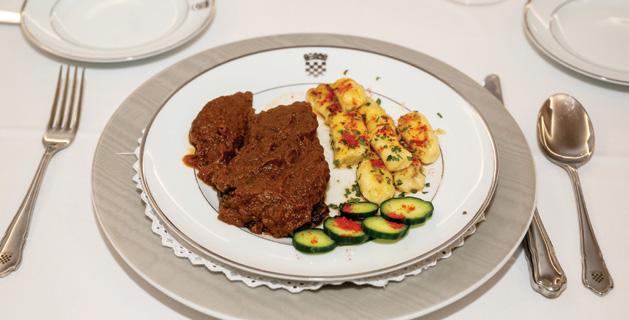
i was born in the part of con tinental Croatia called Zagorje and over time I learned a lot of words from the Dal matian dialect. I know that ”pinjur„ is a fork, I know that ”pajola„ is the plank on the bottom of a boat, that ”pape„ is a father, ”pinel„ is a brush... I even know that strange, almost lasciviously-sounding word ”picaferaj„ actually means ”the man who lights the street lights„. But, I neither discovered nor mas tered the origin of the term ”pašticada„ and I›m not the only one. OK, we know that the dish was invented during the time of the Venetian Republic, I know that it spread to both shores of the Adri atic. We also know that, in the end, it became a firm staple in the Croa tian culinary tradition, but it›s hard to say what the term really means. Someone will refer to the etymol ogy of the Italian language and say that it actually means ”mess„, someone will boldly claim that it means ”to crumple„, someone will connect the word „pašticada“ to the term pasteurization...
Anyway! Pašticada, including dozens of its local varieties, re mains perhaps the most recogniz able autochthonous Croatian dish.
The preparation starts with the so-called „spiking“, i.e. sticking sliced pieces of bacon, carrots, garlic and cloves into the cuts in the meat you made with a thin knife. After that, comes marinating the meat - the salted and spiked meat is immersed in a marinade of red wine (preferably use red wine of stronger taste) and vinegar, as well as black peppercorns, bay leaves and sprigs of rosemary. Chop the root vegetables and onion, then add half of the quantity to the marinade. Cover and refrigerate.
All varieties of pašticada have in common that the meat should be aged in the marinade for at least 24 hours, although many believe that 48 is even better. If you marinade it overnight, that would also do.
paste, 1 tablespoon of plum jam, and, if desired, 1 dl of prosecco or sweet ened red wine (I didn‘t add any!) to the vegetable mix, which should be soft and cooked. Take out the bay leaf and rosemary, and make a mediumthick sauce with a stick mixer out of the mixture.
In the meantime, I‘m preparing the gnocchi that will go with the sauce and as a side dish to the meat. Serve gnoc chi and meat and pour over the sauce.
Ingredients for gnocchi:
• 1 kg of peeled potatoes
• 300 grams of flour and a little more for sprinkling (I used coarse flour)
• 2 eggs
In my version of pašticada, to serve ten people, you will need:
• 2.5 kg of pure beef leg
• 100 grams of dry bacon
• 400 grams of carrots
• 200 grams of parsley root
• 100 grams of celery root
• 2 large onions
• 7 cloves of garlic
• 7-9 cloves
• a pinch of nutmeg
• 7-9 peppercorns
• 3-4 bay leaves and a small sprig of rosemary
• 8-10 prunes
• 3-5 dried figs
• 2 tablespoons of tomato paste (I used concentrate)
• 1 litre of red wine
• 0.5 decilitre of dark vinegar (if the wine is more acidic, add only 1 tablespoon)
• 1 large spoonful of plum jam
• salt
• 2-3 dl of vegetable stock
On the second day, the marinated piece of meat is dried with a cloth or napkin and flash-fried in hot oil (some people even use heated lard), in order to create a thin crust and re tain all the aromas in the meat itself. Strain the vegetables from the mari nade, and prepare the marinade for stewing. Place the rest of the onions that are not used for the marinade on the frying fat and gently fry until they become glazed. Now add the vegetables from the marinade and the rest of the chopped vegetables. Simmer until the vegetables „wither“. Add meat, marinade and vegetable stock. Now add dried figs, prunes and nutmeg.
At that point, the „secret“ of pašticada begins to unravel - meat and vegetables are cooked together on low heat for at least three hours. I cooked my pašticada for four hours. When the meat is already completely soft, the whole piece is separated and cut on a chopping board into thin steaks, approximately 1-1.5cm thick. Next, add two tablespoons of tomato
• 50 grams of melted butter
• 1 teaspoon of salt
Cut potatoes into cubes and boil them in salted water, drain and make a puree, add butter, mix well and cool. Beat two eggs with a fork and add them to the cooled potatoes. Now, gradually add flour to make a medium-hard dough. Mix the dough with your hands until elastic, soft and sticky.
Sprinkle some flour on the work surface, take a portion of the dough and roll it with your hands, as if making a sausage, 2cm wide. Then cut the long dough into smaller pieces, about 2cm each until you use up all the dough.
Place the gnocchi on a clean cloth and make sure to separate them so they don‘t stick together. Cook the gnocchi in boiling salted water for 2-3 minutes until they float to the surface. Strain.
Next, put breadcrumbs on the melted butter, put gnocchi on top of that and fry them all for a minute.
83 FOOd pLANET
As an anti-war activist, Alverson was one of the major opponents of the American intervention in Iraq in 1990, as well as Margaret Thatcher›s tax policy.
In 1993, Charles was in Budapest at a conference and called Živana from there.
jegrička flows quietly
On the porch of her house in the village of Parage, we spoke with Živana, the widow of the renowned American writer and journalist, Charles Alverson, about his life in Bačka County.
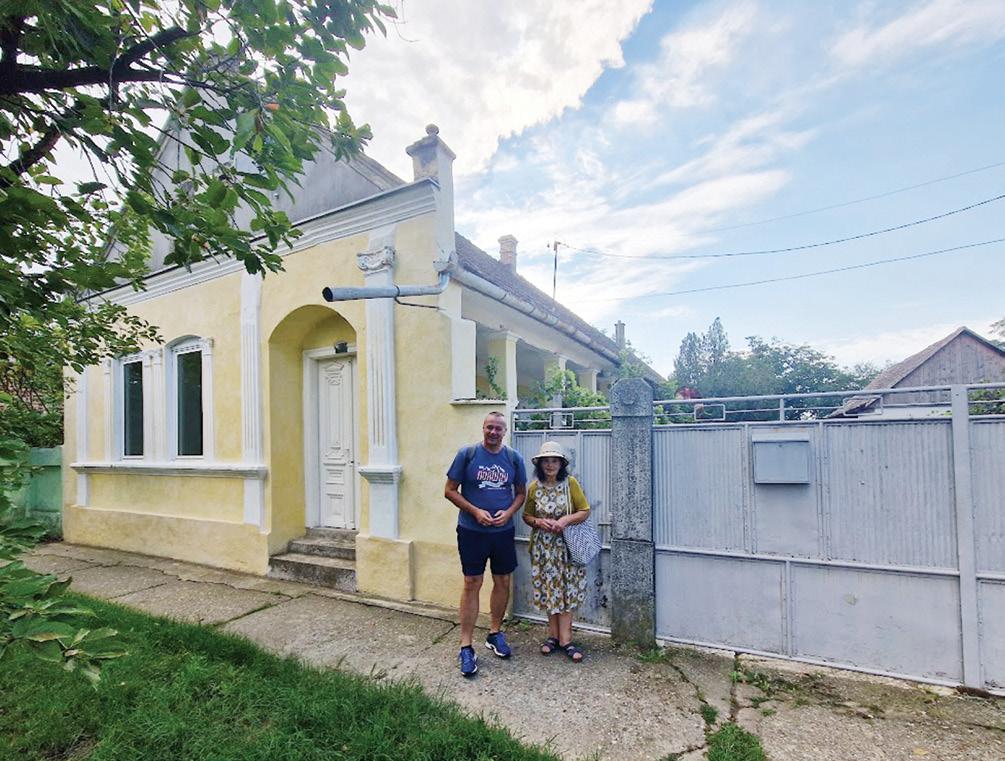
a fter my cycling tour in Par age, a friend asked me if I knew that the famous American writer and journalist Charles Alverson lived in this Bačka village.
A short online search revealed to me that, from the late 1990s to his death two years ago, the writer Charles Alverson, a collaborator, a friend of some of the members of the Monty Python gang and a co-writer of the first version of the script for Terry Gilliam’s iconic film “Brazil”, lived in Parage. Al verson was personally present (as a member of the live audience) at the filming of the original Monty Python television series.
I found the phone number of the Alversons. I called it, Živana answered and we arranged a meet ing at their house in Parage.
Charles’ widow greets me on the porch of her house dressed in a yellow dress with big white
daisies and a white Panama hat on her head, resembling a Southern belle from a Margaret Mitchell novel.
Živana, born to the Aničin fam ily in Parage, was a long-time jour nalist for Nada magazine, so the first part of the conversation inev itably focuses on exchanging ex periences from the late 1980s and early 1990s, in the Borba building in Nikola Pašić Square in Belgrade, at the time when I just started and she ended her journalistic career.
”Charles and I met in 1978 in London, at the house of Alison and Terry Jones, one of the members of the Monty Python group. He was then living with his first wife and children in Cambridge and came to visit the Joneses one day. Our friend ship was born there and then, but no love. After two years of learning English and babysitting, I returned to Belgrade,„ Živana begins her story. In the next few years, she travelled to London several times and met with both the Joneses and Alversons.
”I explained to him how to get from Budapest to Belgrade by bus. It was only then that the romance between the two of us was born. A year later, he returned to Belgrade and we started living together there. He was a correspondent from this part of the world for several American and British newspapers, and I still worked at Nada. Serbia was very interesting to him in those crazy years at the beginning of the 1990s, and that period of his life was a kind of a ‹participation ex periment›. Since our country was under sanctions, his move to Bel grade was a real logistical undertak ing. We decided to get married, first at the registry office and then in the church. We wanted to get mar ried in Parage, but they told us that we had to get married in Belgrade’s municipality of Savski Venac. The explanation was that “all foreigners live there and that’s the only mu nicipality which knows how to con duct a marriage ceremony involv ing a foreigner”. As my office was brimming with unmarried middleaged women, my colleagues tried to arrange all the required documen tation so the wedding could take place in a church. Our wedding was in the Russian church, just behind Saint Marko Church, as I knew the priest’s wife there. In order to get married there, Charles first had to be baptized and become a member of the Serbian Orthodox Church,„ Živana says.
After Živana’s mother fell ill in Parage, the Alversons decided to move to this village in the heart of Bačka County. Charles enjoyed the country life.
”He had two dogs that he brought over from England. As soon as they entered the yard, they killed my mother’s 15 ducklings. She loved him so much that she didn›t get angry. Every morning he got up at five o’clock and learned the Serbian language from books and tapes he had bought. He want ed to speak it perfectly, which he didn›t quite manage. He mowed the grass in front of the house, went to the store and the locals really liked him. When the Cultural Centre was being renovated, Charles volun teered to help and took out all the debris. At the Parožani Paragama event, Charles sold American popcorn for charity. At Christmas,
dUrING hIS CArEEr AS A jOUrNALIST, ALVErSON INTErVIEwEd jOhN LENNON
ANd yOkO ONO whEN ThEy prOTESTEd by LyING IN A hOTEL bEd FOr A wEEk whICh bECAmE AN INTEGrAL pArT OF ThE 1960S ICONOGrAphy.
In front of house in Parage © Robert Čoban
84 www.diplomacyandcommerce.rs r E p OrT by robert čoban Read This on Web
when badnjak is burned in the streets, he prepared mulled wine for the locals. When he drank, he would laugh all the time and later fall asleep where he was,“ Živana describes the village life of the fa mous writer.
During his career as a journalist, Alverson interviewed John Lennon and Yoko Ono when they protested by lying in a hotel bed for a week which became an integral part of the 1960s iconography. He also met the members of the iconic music group Bonzo Dog Band, and (se cretly) recorded the last interview with Janis Joplin. Alverson was a witness of important turmoil on the contemporary scene and talked to many people who were part of historical events related to the world of comics, film and rock mu sic. During the last years of his life, working from his home in Parage, Charles achieved notable success as a novelist.
”In the space of just one year, here, in a small house in the yard, he wrote four novels. He used to set a goal for himself of how many words he should write every day,„ Živka reveals.
His novels have been trans lated into six languages. The novel ”Caleb„ about a black man, a slave in the American South during the 19th century, was also published by Dereta in the Serbian language. The story of an unusual slaveboxer begins in the deep American South, on endless cotton fields. Too brash to comply with the rules of the game, but also too intel ligent to pass up the chance for freedom he experienced as a child, Caleb tries to take the best position
from which he can win freedom.
Whether the nearby Jegrička River inspired him to write about the American South and the Missis sippi, which also ”quietly flows„, is anyone’s guess. But as soon as I entered the yard of the Aničin fam ily’s freshly painted house, I felt the spirit of its surroundings.
”Here, in the house in Parage, we witnessed the 1999 bombing. Charles was very distressed about it and he kept saying: ‹My country is bombing the country and the peo ple who accepted me as their own!›

One day they called us from the
police, i.e. their Department for For eigners, and asked if Charles would give a speech on a Novi Sad bridge. That very bridge was bombed the next day,” Živana continues her story.
As Saša Rakezić wrote in Charles› obituary for Vreme magazine, Alverson undoubtedly belongs to Serbian culture as well: ”He trav elled extensively throughout the country in which he found himself in and treated it with the same re spect and curiosity as he showed to the magnificent global metropoli. He attended several editions of the
Grrr! international comics festival in Pančevo, where he spoke about Harvey Kurtzman, the Monty Py thon series and other topics, and was one of the programme’s organ izers at the Cheap Film Festival in Subotica. Charles also appeared in Djordje Marković›s documentaryfeature-animated film ‹The Last Adventure of Kaktus Bata’,„ Rakezić wrote after Charles’ passing on January 19, 2020.
Živana shows me a photo al bum of Charles› children - Claire, Jake and Josh - with whom she maintains close contact to this day. Charles’ funeral in Serbia was de layed for six days while waiting for his children to arrive.
We agree to go to the cemetery. ”I›m going to take my car so you don›t have to drive me home,„ Živana told me and got into her car with Belgrade license plates.
”Not sleeping, just dead„, (a quote from the title of one of his novels), is written on the black marble headstone below Charles› name at the cemetery in Parage. “Everything has passed and is over” is written under Živana’s name on the headstone.
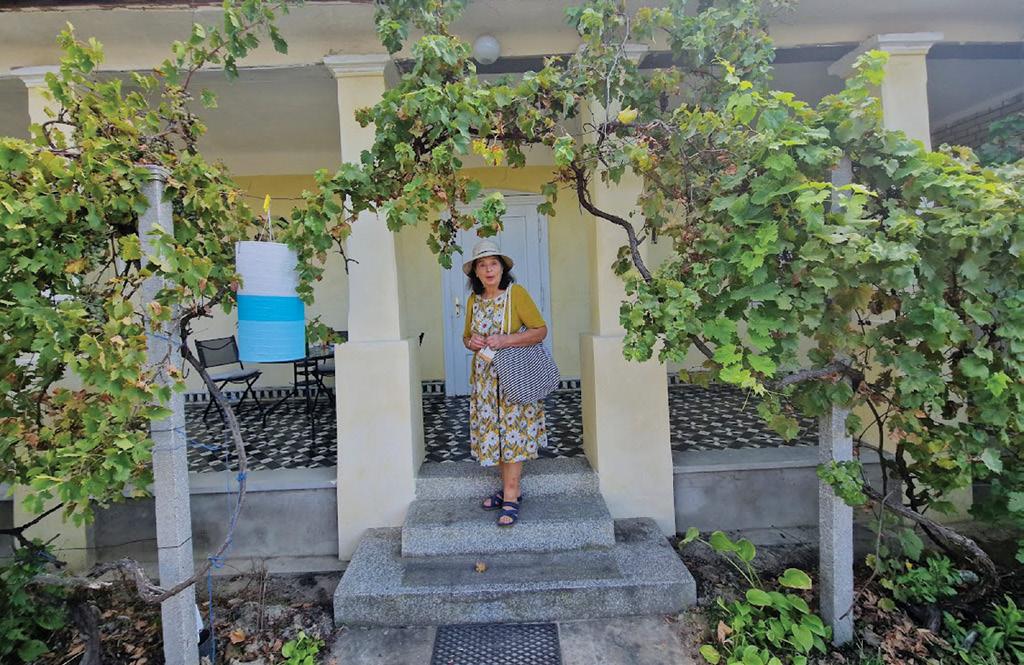
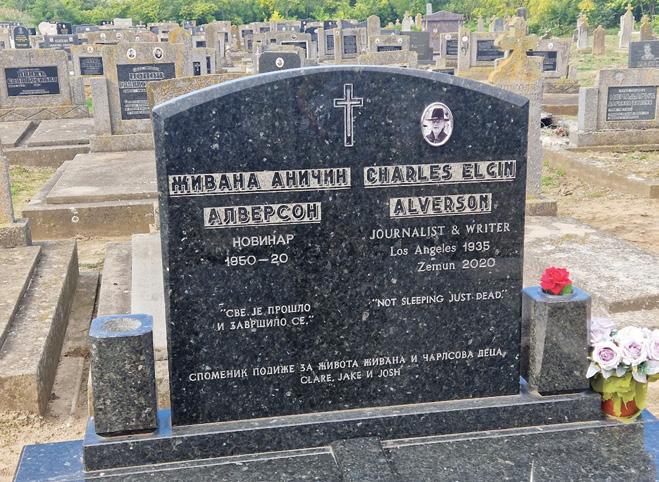
Terry Jones, a member of the Monty Python gang, Charles’ friend and co-worker, died just two days after him - on January 21, 2020.

“hE TrAVELLEd EXTENSIVELy ThrOUGhOUT ThE COUNTry IN whICh hE FOUNd hImSELF IN ANd TrEATEd IT wITh ThE SAmE rESpECT ANd CUrIOSITy AS hE ShOwEd TO ThE mAGNIFICENT GLObAL mETrOpOLI.”
Živana Alverson © Robert Čoban
Charles Alverson Poster © Robert Čoban
Živana and Charls © Robert Čoban
Charles's grave © Robert Čoban
85 r E p OrT
Ivo pogorelić, bryn Terfel, bomsori kim and many Others at bEmUS
1-15 n ovember 2022
The 54th Belgrade Music Festival (BEMUS) will be held from 1 to 15 November under the slogan ‘Seductive... like music!’, with an outstandingly rich programme in a wide range of styles, from Renais sance and Baroque music to contemporary works.
The biggest stars of the world stage perform at con certs in the Kolarac Endowment: the famous Welsh bass-baritone Bryn Terfel opens BEMUS on 1 November with the Virtuosi Festival Orchestra, conductor Bojan Suđić and guest Sofija Petrović, soprano. The famous pianist Ivo Pogorelić will perform on 7 November in Kolarac with a programme of Chopin›s music from his latest CD, released for Deutsche Grammophon.
BEMUS will present two prominent young artists to the Belgrade audience for the first time: the Korean violinist Bomsori Kim, winner of numerous competi tions, will be a soloist at the RTS Symphony Orchestra concert on 5 November, conducted by Manuel LópezGómez from Venezuela, while the Spanish pianist Mar tín García García, laureate of last year›s Chopin Com petition in Warsaw, will close this year›s BEMUS on 15 November, with the Virtuosi Festival Orchestra.
The 59th October Salon, belgrade biennale
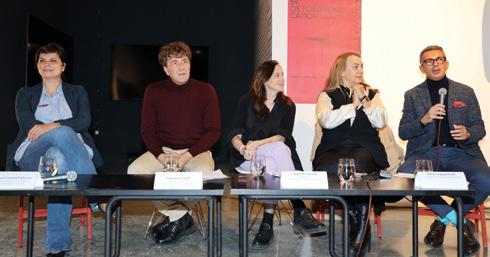
20th n ovember – 4th d ecember 2022
eleven exhibition spaces will be opened in Bel grade, which can be seen simultaneously be tween November 20 and December 4 as part of the 59th October Salon – Belgrade Biennale.
In addition to the recently opened Salon of the Muse um of the City of Belgrade, over fifty works of art will also cover the spaces of the “Svetozar Marković” University Library, the City of Belgrade Library, the Radio and Televi
The Vojvodina Symphony Orchestra will perform under the direction of its chief conductor Alek sandar Marković, with soloists soprano Maida Hun deling from Germany and tenor Jan Vacík from the Czech Republic, on 12 November. The concerts in the Kolarac Endowment are rounded off by the ‘Madrigal – Marin Constantin’ National Chamber Choir from Romania, which presents itself on 2 November with an interesting music-visual programme.
The series of chamber music concerts in the Bel grade Philharmonic Hall will be opened by Nemanja Stanković, in collaboration with the prominent Italian pianist Marino Formenti, on 3 November. Two renowned local chamber ensembles, the Novi Sad Chamber Ensemble and the ‘Diffractions’ String Quartet, will hold concerts on 6 and 13 November in the same venue. The ‘VivaMuse’ ensemble performs on 8 November with a programme of baroque mu sic, and this segment of the programme ends with a concert by the prominent Slovenian accordionist Marko Hatlak with the ‘FUNtango’ ensemble on 14 November.
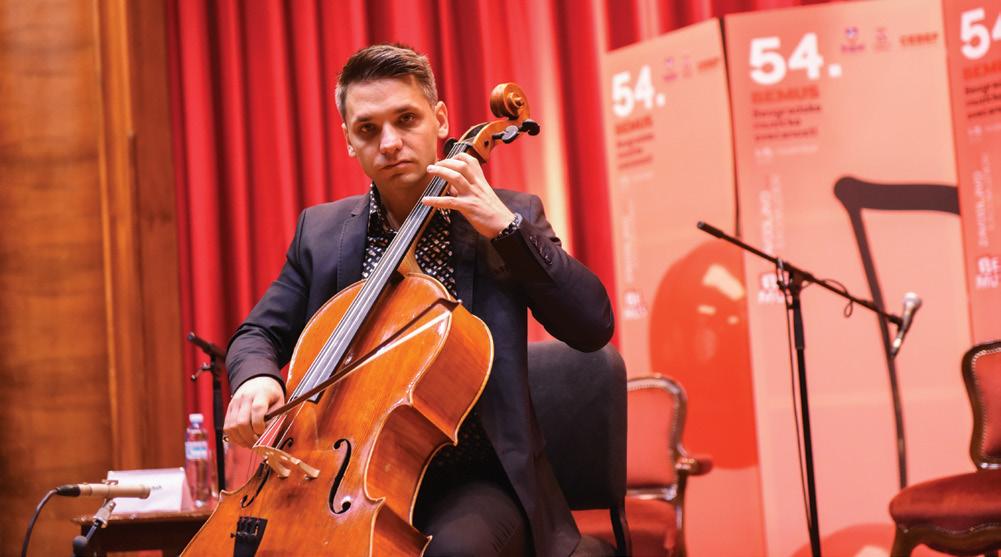
The 18th Free zone Festival
3-8 n ovember 2022
The 18th Free Zone Film Festi val will be held from Novem ber 3 to 8 in cinemas in Bel grade, Novi Sad and Niš. Over 60 plays and documentaries of authentic ex pression will be shown in 14 program units, which will make us think and question.
The festival will be opened on No vember 3 at 6:30 p.m. in the mts Hall with the premiere of Ruben Estlund‘s film „Triangle of Sorrow“, which won the Palme d‘Or at the 75th Cannes Film Festival. On the same day, the audience will be able to watch the film in Niš (Cineplex at 7:00 p.m.) and in Novi Sad (Arena Cineplex at 7:30 p.m.).
Apart from this film, among the hits of this year‘s Free Zone are also a docu mentary about Bowie (Moonage Day dream), a drama-comedy about a reborn teacher in search of sexual satisfaction played by Emma Thompson (Good luck, Leo Grande), a story about the emer gence of the #MeToo movement and female journalists which contributed to it starring Carey Mulligan (She Said...), a family saga set in 1980s New York (Armageddon Time) with Anthony Hop kins and Anne Hathaway...
Already traditionally, the festival will also deal with some controversial topics, such as the forcing of young people to serve in the military in Israel (Innocence), the confrontation of raped women of all nationalities during the war in the nineties with their traumas, the fight of the angry people of Ecuador against capitalist colonization (My Stolen Land). , the love of two women in a concentration camp (Nellie and Nadine), an attempt to understand an unconvicted paedophile (Sparta)...
sion Club of Serbia (in the Radio Belgrade building), the Art Haba Tower, the RTS Club, the Faculty of Dramatic Arts, but and the National Museum and the Salon of the Museum of Contemporary Art. Areas such as the Legat of Vojislava M. are of particular interest. Jovanovic Ma rambo or the pavilion on Cvetni trg, as well as works per formed in public space and in print media.
Among domestic (co)productions, „Garbur“ by Josip Žuvan, „Four Suns and a Piano“ by Boris Kovac and „To the Board“ by Aleksandar Reljić will be pre miered at the Free Zone.
Some of the films will be available to viewers throughout Serbia on the KinoCauch platform from November 9 to 23.
 Photo: Belkisa Abdulovic / Courtesy of BEMUS
Photo: Mateja
Photo: Belkisa Abdulovic / Courtesy of BEMUS
Photo: Mateja
Stanisavljević © ATAImages 86 www.diplomacyandcommerce.rs CULTU r AL NE wS
Nation must Be Healthy

Medical & Pharma Conference November 15, Belgrade House of the National Assembly of the Republic of Serbia Pharmacy 4.0: New medicines, old challenges The health system after the pandemic Breastfeeding: The foundation of healthy offspring Medical tourism: Examples of good practice www.communications.rs/medandpharma
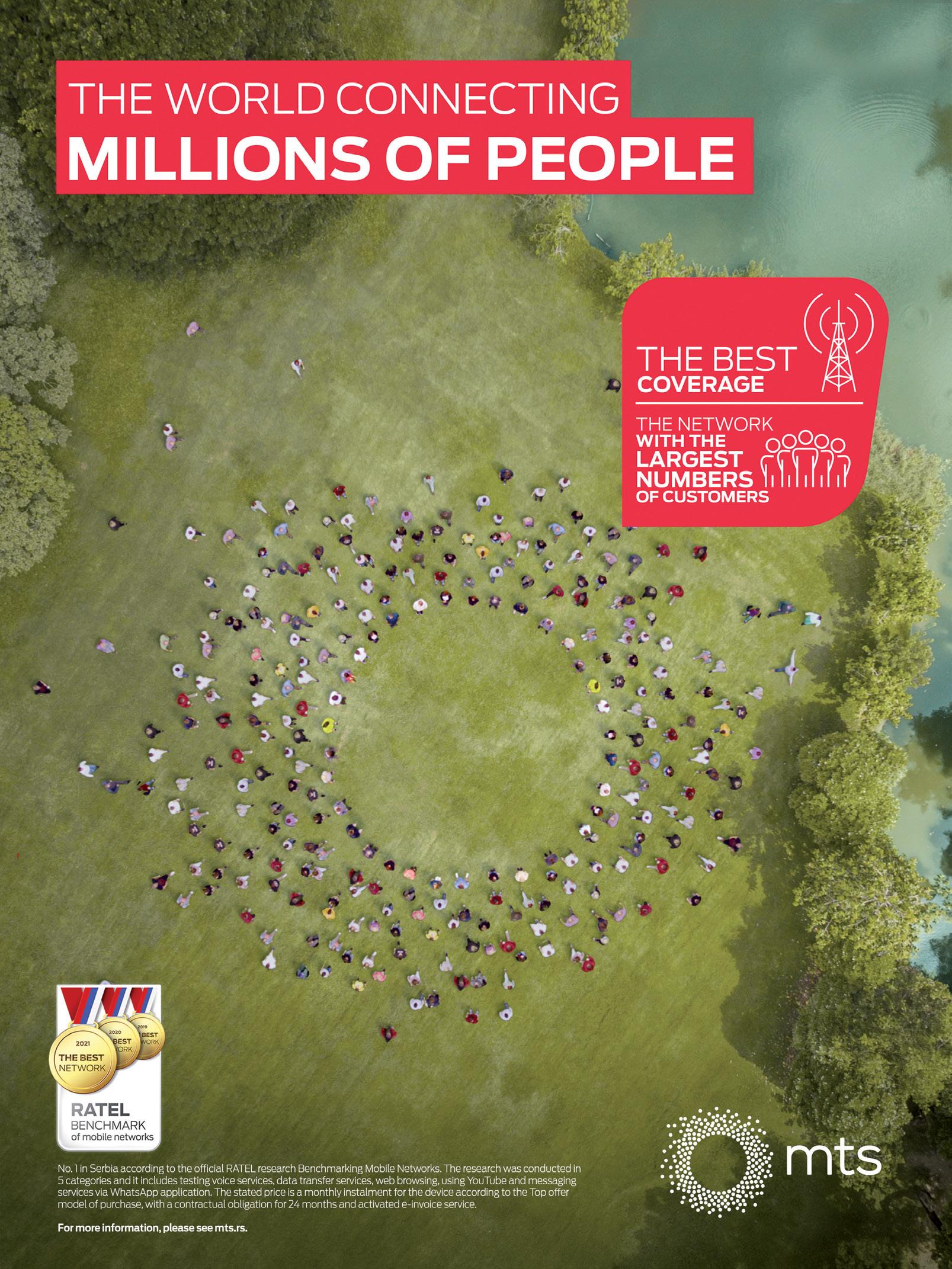

















































 cHriStian EBnEr
cHriStian EBnEr











 iVan VuJiSić, member of the Managing Board and Commercial Director of Wienerberger Building Solutions Central Balkan
iVan VuJiSić, member of the Managing Board and Commercial Director of Wienerberger Building Solutions Central Balkan








































































































































































 Photo: Belkisa Abdulovic / Courtesy of BEMUS
Photo: Mateja
Photo: Belkisa Abdulovic / Courtesy of BEMUS
Photo: Mateja

